 Leading Blog | Posts by Category |
 Leading Blog | Posts by Category |
12.27.24

5 Leadership Lessons: Tony Blair on Leadership Essentials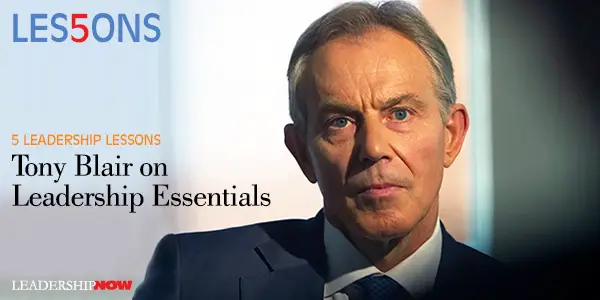
TONY BLAIR wrote a book about leadership in government. However, his practical ideas on leading in the 21st century apply across the board. Leadership, both good and bad, leaves clues for us to study how other leaders have handled problems and challenges common in all leadership situations. On Leadership does just that. It is the unwise leader who thinks they know everything. Learning from others’ mistakes and successes is the best way to guard against leadership hubris. Below are a selection of Blair’s thoughts on leadership.

Posted by Michael McKinney at 09:12 AM
02.26.24

Elon Musk by Walter Isaascson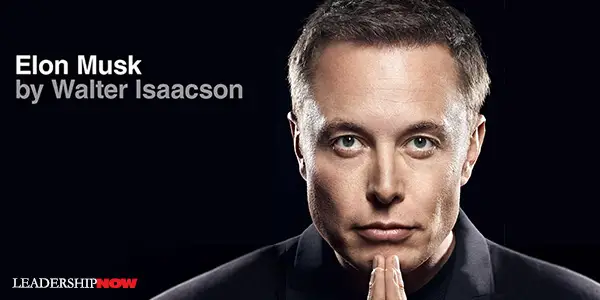
LOVE HIM or hate him, Elon Musk is not easily dismissed. While there is genius in his high-tech visions, some of his opinions and antics leave some people disturbed if for no other reason than they don’t align with their own. Walter Isaacson’s biography of Elon Musk is full of revealing, behind-the-scenes anecdotes that provide insight into why Musk does what he does and why he does it that way. Even though Musk’s approach doesn’t necessarily provide a blueprint to be copied any more than Steve Jobs’ approach did (even though both individuals got results), it does offer lessons to be learned and applied in our own leadership. Musk remarked on Saturday Night Live in May of 2021, “To anyone I’ve offended, I just want to say, I reinvented electric cars and I’m sending people to Mars in a rocket ship. Did you think I was also going to be a chill normal dude?” Below, you will find some excerpts that give you a taste of what you will find in Isaacson’s Elon Musk. Growing up: Isaacson concludes with this observation of Musk: One can admire a person’s good traits and decry the bad ones. But it’s also important to understand how the strands are woven together, sometimes tightly. It can be hard to remove the dark ones without unraveling the whole cloth. As Shakespeare teaches us, all heroes have flaws, some tragic, some conquered, and those we cast as villains can be complex. Even the best people, he wrote, are “molded out of faults.” 
Posted by Michael McKinney at 01:30 PM
11.20.23

The Leaders Our Companies Need: Lessons We Can Learn from Historical Luminaries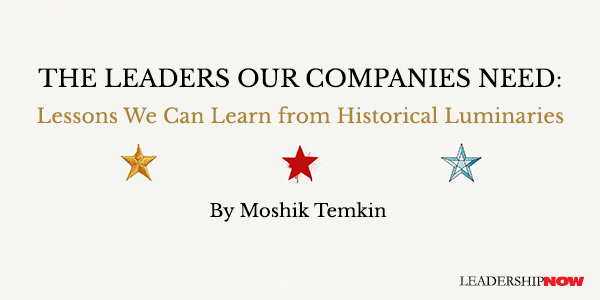
IF YOU ENTER a bookstore and peruse the shelves for books on famous leaders in history, you’ll likely find a recurring cast of characters staring at you. Winston Churchill. Napoleon Bonaparte. Abraham Lincoln. Mao Zedong. Keep browsing and you’ll encounter another variant of this literature featuring prominent men (and sometimes women) in the business or corporate world: Bill Gates. Elon Musk. Warren Buffett. Carlos Slim. Jeff Bezos. With varying degrees of nuance, these people are treated as heroes, role models, and inspirations. They’re portrayed as uniquely powerful individuals — able to overcome, through sheer force of will or ruthless intelligence, the obstacles they faced. The message from this literary cottage industry is that where there’s a will, there’s a way. It’s hard to escape this view of leaders and leadership. But what qualities do our celebrated leaders of industry embody that make them successful? Is it their ability to increase the company’s value? Effectively lead through a major transition? Inspire others through a shared passion? And, importantly, what qualities can others emulate to themselves become more effective leaders? Learning how to be good leaders doesn’t involve formulas or abstractions. It can, however, be edified through examining tangible illustrations of leaders and leadership from history. How leaders operated within, or pushed against, the constraints of their time illustrate characteristics of responsibility, vision, sacrifice, and more. Actions of standout leaders through history who have had to make decisions in the direst circumstances, impose a radical new vision, or stand up to injustice or oppression, continue to echo as archetypes of leadership. Let’s examine the qualities of some prominent leaders from the past to reveal the sort of leaders and leadership that are needed to tackle the problems facing us today. Responsibility to the People: FDR and the Great Depression History shows us that truly important leaders emerge in times of crisis. When there is peace and economic prosperity, leaders can do well, but their main role is one of management — making sure things stay stable. When the Great Depression hit, President Herbert Hoover, while not personally responsible for the Wall Street crash, attempted to maintain a management role but failed to address or even take into full account the suffering of the American people. Hoover came off as callous and detached. He was widely admired and popular when he entered the White House in 1929, but his loss to Franklin D. Roosevelt in 1932 was the biggest landslide in American electoral history. A striking feature of Roosevelt’s political success was that he became an admired champion of the poorest Americans. Roosevelt’s New Deal — the policies that aimed to bring an end to the Depression through large public investment and by putting Americans to work — didn’t necessarily achieve its goals in purely “economic” terms (the US economy remained “depressed” throughout the 1930s), but it accomplished something more important: it gave people hope, restored their morale and self-respect, and showed them a kind of leadership that put the public interest first. Roosevelt’s energy and his manner of speaking had a certain charisma that Hoover’s lacked. He gave the impression that he intended to match his words with actions. But he also conveyed the sense that he felt a personal responsibility, as president and leader, for how people were faring. Enacting a Purposeful Vision: Margaret Thatcher’s Political Ideology Former British Prime Minister Margaret Thatcher’s influence stretches further, and goes deeper, than just Britain. In fact, we live in a world she helped make and that came straight out of her vision. Many consider her forceful acts to privatize public services, dismantle the remnants of socialism, and favor the wealthy as “job creators” as ending an era of stagnation, unproductive industries, and social decay. Dubbed “the Iron Lady,” she modernized Britain’s economy by putting almost all state assets up for sale, defeating trade unions, championing entrepreneurship and the financial sector, and creating the economic and social landscape Britain still has today. The Thatcherite outlook remains dominant, in Britain and elsewhere, but that doesn’t mean it’s universally loved or that it will last. The deadly, debilitating COVID pandemic, featuring a virus that ignored national borders and private interests and killed millions of people, exposed the limitations of the Thatcherite worldview, with its emphasis on individualism and jingoism — both of which took a bad situation and made it worse. And as we face a global climate crisis, the reckoning with Thatcher’s legacy will grow. Even if many of our leaders continue to repeat Thatcherite pieties, only drastic changes in how we collectively live, govern, and organize our economy will offer any hope for solutions. Self-Sacrifice For a Cause: MLK’s Stand Against Racial Injustice Reverend Martin Luther King, Jr., an eloquent Baptist minister with a Ph.D. in theology, unwittingly became the leader of the Civil Rights Movement in the U.S. in the late 1950s and 1960s until he was assassinated at age 39. His passionate orations reminded Americans of their creed that “all men were created equal” and ignited massive demonstrations in the form of “freedom rides” in southern states, voter registration drives, sit-ins, and marches. King showcased morally compelling, truth-telling leadership and drew attention throughout the nation and around the world to the persistence of segregation and racism. In this regard, he and his followers were wildly successful. Yet, in the 50-plus years since King’s death, the gap between the richest and the poorest Americans has grown exponentially, and African Americans remain among the poorest — and by far the most incarcerated — of the population. We are all living through history, and while we’re products of the past, we’re also the makers of the future. Whether through responsibility, vision, or sacrifice, or other influential traits, we must hone the leadership qualities that will shape the businesses — and the society — we need today and into the future.  For the past decade, Moshik Temkin has challenged his students at Harvard University’s Kennedy School of Government and around the world to grapple with the nature of leadership as part of his wildly popular course “Leaders and Leadership in History.” Now, in Warriors, Rebels, and Saints, Temkin refashions the classroom for a wider audience. Learn more at moshiktemkin.com. 
Posted by Michael McKinney at 09:26 AM
05.09.23

An Ordinary Man: Gerald R. Ford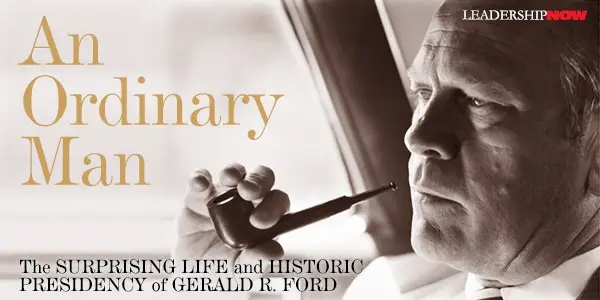
GERALD FORD was an inner-directed leader that gave him quiet strength. He didn’t indulge his ego. A leader with the courage to do what needed to be done despite the consequences. Richard Norton Smith’s extraordinary biography of Gerald Ford, An Ordinary Man, pulls together multiple perspectives to give essential insights into Ford’s thinking and leadership. Ford had moral authority because he lived his values. He believed that you could disagree without being disagreeable. Never taking himself too seriously and wanting to do what was best for the country, he recruited people who knew more than he did about the issues he faced. Ford possessed what Pulitzer Prize-winning author John Hersey called a “stubborn calm at the center” and “a glacial caution.” Curated below are some notes from An Ordinary Man: ☙ “The strongest weapon in a political campaign is the good credited you by word of mouth”—this Ford credo goes a long way toward explaining him and the congressional mindset he personifies. By stressing individual contacts over ideological mandates, Ford defines leadership in transactional terms, constituent service on a grand scale. ☙ When asked the secret of his political success, Ford reveals more than he perhaps intends by replying, “I made everyone else’s problems my problems.” ☙ “Ford never doubted the contribution of college sports to his character or career. Teamwork and grueling preparation were educational values in themselves. The discipline to absorb defeat without yielding to defeatism, to distinguish between constructive criticism and the shouted abuse of armchair quarterbacks—these and other lessons served Ford as guideposts in his political travels.” ☙ As a new congressman, “Ford could often be found at his desk on weekends as well. Frequently Betty joined him there, filing papers or just enjoying his company.” ☙ JFK beckoned to Gerald and Betty Ford to return to Washington on the presidential yacht Honey Fitz. That the Fords should find their names on the most exclusive guest list of the season was no accident. JFK had long since taken the measure of his one-time House colleague. He knew that Ford’s opinion carried weight among lawmakers of both parties, especially on issues of military spending and foreign aid. ☙ Representative Charles Goodall on Ford as Minority Leader: “Of course, he was a nice guy. Even his critics liked him … His secret was that he was almost totally non-vindictive, and he made the effort to make people feel that they were part of the leadership team.” ☙ With counselor Robert Hartmann, former Washington bureau chief for the Los Angeles Times, on the payroll, “Ford could indulge his habit of seeing the good in people, knowing he had another set of eyes to detect and defend against their less admirable qualities.” ☙ In pardoning Nixon, Ford said he had hoped “to change our national focus … to shift our attention from the pursuit of a fallen President to the pursuit of the urgent needs of a rising nation.” ☙ Ford said, “If there’s no place in politics for human compassion, there’s something wrong with politics.” ☙ In visiting Japan and South Korea, “He navigated minefields of controversy with a common touch and uncommon sensitivity to the feelings of his hosts.” ☙ He was “Paying for the mistakes of the last four decades, “Observed George Reedy, onetime White House press secretary to Lyndon Johnson. “He’s been run over by history.” ☙ “Presidents are judged in part by the company they keep, the talent they attract, and their ability to work with subordinates who may surpass them in IQ and charisma. ☙ Don Rumsfeld told Ford, “You know, as you look ahead, you have to have something that you are pushing for. Otherwise, you are not leading.” ☙ Approaching his first anniversary in the Oval Office, there was widespread agreement that the trappings of office had done nothing to inflate Ford’s ego. ☙ “Ford Is Mr. Right,” proclaimed Newsweek. “A kind of anti-hero whose homely virtues of thrift, honesty, hard work, and modesty about the capacities of government exactly suit a diminished national mood.” ☙ “Ford wasn’t that type of man. He wasn’t someone who attempted to sell things by packaging them for the media.” ☙ Ford said at the 1975 Helsinki conference, “History will judge this conference not by what we say today, but by what we do tomorrow—not by the promises we make, but by the promises we keep.” ☙ Clarence Mitchell, chief Washington lobbyist and spokesman for the NAACP, said of Ford that despite their political differences, “nothing will ever change the fact that you entered the office at a time when the Nation was in great travail, and you left it with the respect and, in many instances, the affection of your supporters and many of your opposition as well.” ☙ Harry McPherson, Lyndon Johnson’s White House counsel, wrote, Ultimately Ford had been a successful president not because he was clever, articulate, or a man of vision, “but because he was honest, straightforward, forgiving and possessed of sound judgment.” ☙ Acknowledging his contemporary opposition to the Nixon pardon, Ted Kennedy said, “Time has a way of clarifying past events, and now we can see that President Ford was right.”  
Posted by Michael McKinney at 05:08 PM
02.20.23

70 Thoughtful Quotes from 30 Presidents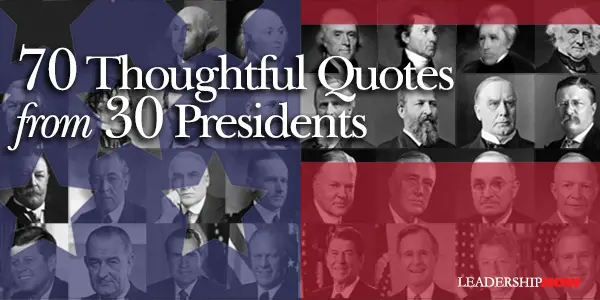
HERE are 70 quotes from 30 U.S. presidents to think about. Whether you liked their administration or not, each thought will help to broaden our perspective. George Washington, 1789-1797 “If the freedom of speech is taken away, then dumb and silent we may be led, like sheep to the slaughter.”
John Adams, 1797-1801 “I must study politics and war that my sons may have liberty to study mathematics and philosophy.”
Thomas Jefferson, 1801-1809 “In matters of style, swim with the current; in matters of principle, stand like a rock.”
James Monroe, 1817-1825 “In a representative republic, the education of our children must be of the utmost importance!”
Andrew Jackson, 1829-1837 “One man with courage makes a majority.”
Martin Van Buren, 1837-1841 “It is easier to do a job right than to explain why you didn’t.”
Millard Fillmore, 1850-1853 “May God save the country, for it is evident that the people will not.”
Franklin Pierce, 1853-1857 “If your past is limited, your future is boundless.”
Abraham Lincoln, 1861-1865 “America will never be destroyed from the outside. If we falter and lose our freedoms, it will be because we destroyed ourselves.”
Ulysses S. Grant, 1869-1877 “If we are to have another contest in the near future of our national existence, I predict that the dividing line will not be Mason and Dixon’s but between patriotism and intelligence on the one side and superstition, ambition, and ignorance on the other.”
Rutherford Hayes, 1877-1881 “Every expert was once a beginner.”
James Abram Garfield, 1881 “A brave man is a man who dares to look the Devil in the face and tell him he is a Devil.”
William McKinley, 1897-1901 “That’s all a man can hope for during his lifetime - to set an example - and when he is dead, to be an inspiration for history.” Theodore Roosevelt, 1901-1909 “I put myself in the way of things happening, and they happened.”
William Howard Taft, 1909-1913 “No tendency is quite so strong in human nature as the desire to lay down rules of conduct for other people.” Woodrow Wilson, 1913-1921 “I have always been among those who believed that the greatest freedom of speech was the greatest safety because if a man is a fool, the best thing to do is to encourage him to advertise the fact by speaking.”
Warren Harding, 1921-1923 “I am not fit for this office and should never have been here.”
Calvin Coolidge, 1923-1929 “I have found it advisable not to give too much heed to what people say when I am trying to accomplish something of consequence. Invariably they proclaim it can’t be done. I deem that the very best time to make the effort.”
Herbert Clark Hoover, 1929-1933 “It is a paradox that every dictator has climbed to power on the ladder of free speech. Immediately on attaining power, each dictator has suppressed all free speech except his own.”
Franklin Delano Roosevelt, 1933-1945 “Repetition does not transform a lie into a truth.”
Harry S. Truman, 1945-1953 “The buck stops here.”
Dwight David Eisenhower, 1953-1961 “Never let yourself be persuaded that any one Great Man, any one leader, is necessary to the salvation of America. When America consists of one leader and 158 million followers, it will no longer be America.”
John Fitzgerald Kennedy, 1961-1963 “No matter how big the lie, repeat it often enough, and the masses will regard it as the truth.”
Lyndon Baines Johnson, 1963-1969 “You know, doing what is right is easy. The problem is knowing what is right.”
Richard Milhous Nixon, 1969-1974 “Only if you have been in the deepest valley can you ever know how magnificent it is to be on the highest mountain.”
Gerald Rudolph Ford, 1974-1977 “If compassion and mercy are not compatible with politics, then something is the matter with politics.” Ronald Wilson Reagan, 1981-1989 “The greatest leader is not necessarily the one who does the greatest things. He is the one that gets the people to do the greatest things.” George Herbert Walker Bush, 1989-1993 “The American Dream means giving it your all, trying your hardest, accomplishing something. And then I’d add to that, giving something back. No definition of a successful life can do anything but include serving others.” William Jefferson Clinton, 1993-2001 “If you live long enough, you’ll make mistakes. But if you learn from them, you’ll be a better person. It’s how you handle adversity, not how it affects you. The main thing is never quit, never quit, never quit.” George Walker Bush, 2001-2009 “Leadership to me means duty, honor, country. It means character, and it means listening from time to time.”
Posted by Michael McKinney at 11:01 AM
11.14.22

The President’s Man: Insights into the Nixon White House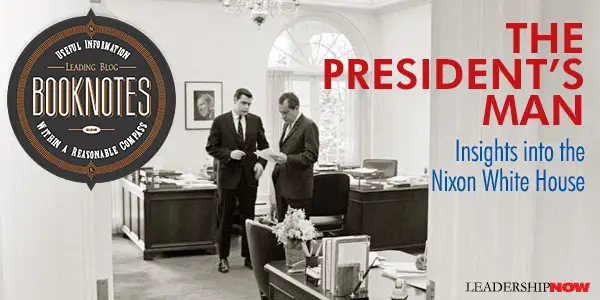
ON the 50th anniversary of the Watergate break-in, we have a more nuanced account of the Nixon White House in The President’s Man, from the perspective of his personal aide Dwight Chapman. To the curious and open-minded, his perspective is illuminating. Time always provides depth. Chapman says his life changed for the better and forever when he was introduced to Bob Haldeman on the campaign for Nixon’s 1962 run for California governor. As they say, the rest is history. Haldeman, an “unbelievably intelligent” and an “unfailing decent man,” became his mentor and closest friend. Over time, he learned Nixon’s needs and habits and became a trusted aide and Deputy Assistant. Nixon once advised him, “Dwight, as you go through life, just always remember the key thing is keeping your learning curve vertical.” Never stop learning. Here are some of the insights from the memoir: UNDERSTANDING NIXON ❧ Sometimes out of anger or his own frustration or whatever his emotion, [Nixon] just spouted off. He would say things he didn’t really mean. Some historians have overlooked that very human trait—that he was subject to the same passions and shortcomings as the rest of us. ❧ Great damage was done to President Nixon’s reputation by his inclination to issue knee-jerk orders or demands that he really didn’t expect to be carried out. These impulsive reactions, when taped and then replayed by the media, served to undermine his character and created a false impression of the man I knew. ❧ Nixon always cared about how people were treated. He knew that little things mattered. The bigger and more prominent the person was, the more the little things they did mattered to those they encountered. ❧ [Nixon] was a reader, especially about the great men of both recent and distant history. ❧ Meeting leaders in Europe and Asia, he learned from those men how they “think.” He loved talking about thinking. He asked those leaders, personally, how they thought, why they governed the way they did. Nixon was intellectually curious. He was a seeker of the “hows” of leading, of political life. KISSINGER ❧ Some former colleagues were critical of Kissinger’s maneuvering and what they saw as his “propensity to eclipse” the president. I never saw it that way. Nixon towered over Kissinger, in my view. I dismissed Kissinger’s need for gratification as being just that: a need for gratification. I never saw him as anti-Nixon. ❧ The two of them [Nixon and Kissinger] had tremendous chemistry. Both were extremely smart, knowledgeable, and creative. They were both strategic thinkers. They fed off each other’s minds. They were able to talk to each other on a very sophisticated level. Nix on would develop his strategy and henry would get on an airplane and fly off to negotiate. I have always described their relationship as Nixon being the architect and Henry being the builder. That was certainly true where Vietnam was concerned. DECISION-MAKING ❧ Richard Nixon did not make impulsive or emotional decisions. Everything he did was considered and weighed. ❧ The president wanted Haldeman to put in place a system that maximized the efficient exchange of ideas; put a focus on providing the information necessary for informed and wise decision-making; and provided for the discipline necessary to make it all work. ❧ He would review options incessantly, looping back over subjects previously covered, until, in his mind he had finally reached a decision or point of view with which he was comfortable. If a decision had to be made quickly, he could make it quickly. ❧ Nixon chose to surround himself with intelligent people who he knew wouldn’t necessarily agree with him on everything. He wanted to work with people who would challenge him intellectually. ❧ What Nixon did so well, usually, was move people toward a consensus. This was great when there was no time pressure. He was a very perceptive man and had the ability to get things done. When necessary, he would pit those people against each other, in an intellectually competitive way, using them as a way to forge a solution. PRESS ❧ I think his anticipation of the continual negative attacks by the press became too ingrained in his psyche and created complicated and unnecessary mental roadblocks for him. ❧ The press did everything possible to reinforce the negative image it had helped create, too often misrepresenting details and facts. TAPES ❧ The abuse of power tapes are 5 to 7 percent of the total. How many people would want that grayer side of their illustrious life measured by the 7 percent where they may have done or said inappropriate things? VIETNAM ❧ Without the protestors knowing, they were reinforcing the enemy’s determination not to end the war short of complete U.S. capitulation, and therefore prolonging it. North Vietnam premier Pham Van Dong’s message of support to protestors before the October 15 moratorium was a nail in the coffin of Nixon’s plan to end the war by the end of 1969. The protestors forced Nixon to back off his threats to use force to end the war if North Vietnam wasn’t a productive partner in negotiations. ❧ It is important to note that black bag operations had been executed in previous administrations and were approved by, even run by, the FBI. In past administrations it was the FBI that conducted black bag operations under the cover of national interests. It was the Nixon White House that brought these operations in-house in order to find and plug leaks. CHINA ❧ Nixon said, “We are going to China because in fifty years we will be adversaries and we must be able to talk to one another.” WATERGATE ❧ One of the reasons the White House response was lacking is that the president had no idea of exactly what had happened, or why it had happened. He was treating it like a public relations problem. ❧ John Mitchell said, “The public generally does not understand what Watergate was all about and never will. Americans believe that everything that happened during the pertinent time was wrong because [they were] told that such was the case and never thought it out.” The result was that “the country lost a very competent president during a time when it needed him, particularly in the field of foreign affairs.” ❧ The main lesson to be learned from Watergate, wrote Haldeman, “would seem to be the basic point that any problem must be dealt with openly and realistically—not put aside or covered up.” ❧ There is no question that there was a real crime and that it was being covered up. However, people in positions of power were not thinking criminally. The were thinking, as Haldeman clearly believed, “containment,” political containment. Richard Nixon responded instinctively based on everything that had happened to him in his political career. His first thought must have been, Here they come. They’re coming after me again. This wasn’t paranoia. They really had come after him in the past and they were coming after him again. But rather than putting that feeling aside and focusing on how to best handle the situation, he made the worst possible decision. He started fighting back. Worse, he did so without knowing the facts. The president was being misled and wrongly advised by Joh Dean. His trusted counsel was providing the president with incomplete and often misleading information in an apparent effort to save himself—not to faithfully advise the president. 
Posted by Michael McKinney at 07:34 AM
11.07.22

A Man of Iron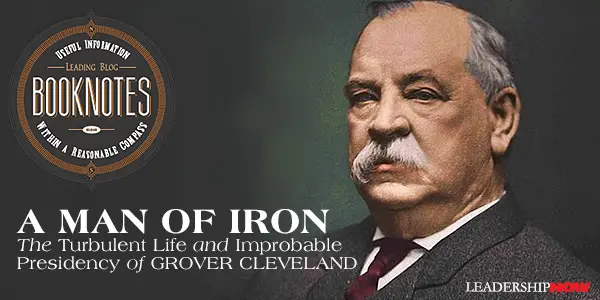
WHEN reading A Man of Iron by Troy Senik that reassesses the life and the improbable presidency of Grover Cleveland, you can’t help but reevaluate your notion of what makes a great leader. It is refreshing to read of a public figure willing to follow principle regardless of the political consequences. At the age of forty-four, the only elected office Grover Cleveland had ever held was sheriff of Erie County, New York—a role he had relinquished nearly a decade earlier, returning to a rather uneventful life as a workaholic bachelor lawyer. In the next four years, he would become, in rapid succession, the mayor of Buffalo, the governor of New York, and the twenty-second president of the United States. Four years later, he would win the popular vote but nevertheless lose the presidency. And in another four, he’d become the first—and, to date, only—president to be returned to office after having been previously turned out. ❧ The trick to Grover Cleveland was that he could only surprise you if you hadn’t been paying attention. The man in office was precisely the man who had been on the ballot, who was precisely the man who toiled long into the night behind his law desk, who was precisely the kid who showed up at the Eire Canal at 4 a.m. to get a jump on his competition. To the extent he was profound, it was because he was a simple, straight-forward man in a Janus-faced profession. To the extent his conduct was shocking, it was only because he had a habit of doing exactly what he had said he would do. ❧ Scan Grover Cleveland’s entire political career and there is but one principle—always articulated, if not always constantly applied—that shaped all others: government exists to protect the welfare of the people as a whole. And any preference government shows to one individual over another is to be regarded as per se suspicious. ❧ If Grover Cleveland wasn’t a political genius he had an incredible knack for stumbling into situations that made him look like one. ❧ That Cleveland was such a short remove from the unremarkable life of a Buffalo lawyer—combined with the fact that his no-frills personality seemed impenetrable by changes in status—went a long way to explaining the modesty with which he approached the presidential transition. He declined President Arthur’s offer to stay at the White House prior to swearing in, choosing a local hotel instead. He even paid for his own train fare for the journey from Albany to Washington, thinking it unbefitting a president to accept any benefits on account of his station. ❧ On a walk with a Buffalo acquaintance shortly after the election, he declared, “Henceforth, I must have no friends.” The American presidency is often lamented as the loneliest job in the world. For Grover Cleveland that was a necessity to be embraced rather than a tragedy to be endured. ❧ It would be the case from their wedding day forward that Frances—young, big-hearted, and beautiful—was the member of the Cleveland family who truly captivated the public. Not quite twenty-two years old, she had become the youngest First Lady in American history. The effect she had on Washington would be unrivaled until Jacqueline Kennedy’s tenure nearly a century later. ❧ Grover Cleveland died at home on the morning of June 24, 1908. His last recorded words were, “I have tried so hard to do right.” ❧ Mark Twain, a man not known for flattering politicians, declared Cleveland “the greatest and purest American citizen” and “a very great president, a man who not only properly appreciated the dignity of his high office but added to its dignity.” ❧ He possessed moral courage at almost superhuman levels. He was consistently motivated by conviction, even when he knew he’d suffer political harm as a result. As Woodrow Wilson observed, “His courses of action were incalculable to the mere politician, simply because they were not based upon calculation.”

Posted by Michael McKinney at 06:15 AM
10.24.22

Becoming FDR: The Personal Crisis That Made a President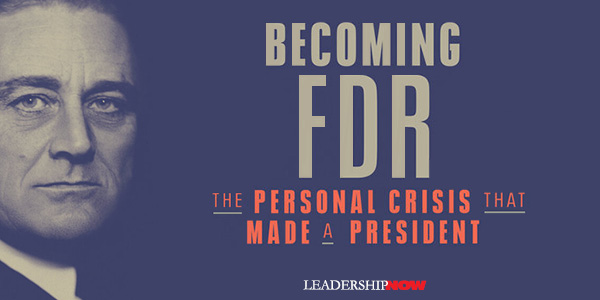
WHEN FEAR and suffering are all around us, how does a true leader inspire hope? asks author and journalist Jonathan Darman. He found the answer not in his presidency but in the years leading up to it. In an insightful book, Becoming FDR: The Personal Crisis That Made a President, Darman pulls back the curtain of Franklin’s personal tragedy to reveal the character and the change in perspective that he developed as he faced his diagnosis. In popular memory, Franklin Roosevelt is the quintessential political natural, a president with greatness in his blood. He was indeed born with many advantages—wealth, charm, and intelligence; loving attentive parents; and a famous cousin who was president of the United States. Had he never gotten polio, those things could have delivered him a life of achievement and accomplishment. Aligned with luck and timing, they might have even brought him to the White House someday.
It was sad that “His speeches were pleasant to listen to, but when he was done speaking, it was hard to remember anything he’d had to say.” Franklin was on track to follow in his cousin Theodore Roosevelt’s footsteps all the way to the White House. But on Wednesday, August 10, 1921, Franklin’s life changed forever. At the age of thirty-nine, he was diagnosed with Polio. He could have just quietly faded away, but he chose to believe in the possibility of a full recovery. Franklin used “his powers of feeling, perception, and intuition to create a foundation of hope.” In the early days of a serious illness or injury, the mind is destabilized.…Hope is the scaffolding that protects the traumatized mind….Pain becomes more bearable when it has a horizon. Suffering is more survivable when it has the promise or even the possibility of an end. And recovery seems more possible when it is spelled out in a detailed plan. His former lifestyle had prevented him from deep thinking. “Convalescence meant he could no longer search for distraction at the first hint of a difficult or uncomfortable idea.” A political aid that lived with the Roosevelts, Louis Howe, remarked Franklin “began to see the other fellow’s point of view. He thought of others who were ill and affected and in want. He dwelt on things which had not bothered him much before. Lying there, he grew bigger by the day.” In 1924, Franklin learned of a man that had regained his ability to walk after three years of therapy in the warm springs near the town of Bullochville, Georgia. Franklin believed. “The more time he spent there, the more he was awakened to what other people who had polio—most of whom were less fortunate and connected than he—had gone through.” Warm Springs did not bring his legs back to life, but they did awaken in him an “awareness of other people’s pain, and awareness of his own ability to ease it.” Gather the best available wisdom. Focus on practical action. Strengthen community. Nurture hope. These had been the cornerstones of his own attempts at recovery, and Franklin replicated then at Warm Springs. Later, when faced with the challenge of lifting his country out of an economic crisis that had spread dire terror and hopelessness throughout the land, these same principles would form the backbone of his response. His years of convalescence would shape his response to the nation’s crisis when he took office as the president in 1933. “Need and adversity, he now understood, not only caused suffering; they also robbed people of the dignity and purpose that comes from feeling useful.” His support of the Civilian Conservation Corps and the Works Program Administration was to that end—restoring dignity and purpose. “At the heart of Franklin’s relationship with the American people was his unique ability to envision their fears, hopes, and needs.” Years before, his Uncle Fred wrote to him—never worry, accept things as they are, look forward and not back—became his message too. In his inaugural speech, he told Americans, “the only thing we have to fear is fear itself”—they believed because they knew he deeply believed it. Although he kept much of the details of his illness private, they knew when he spoke of the struggle against fear that it was his fight too. 
Posted by Michael McKinney at 06:47 AM
09.20.22

Henry Kissinger on Leadership: Six Studies in World Strategy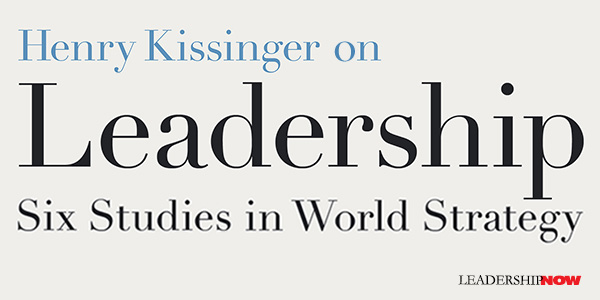
IN A SOCIETY’S transition between the past and the future, leadership is indispensable. “For strategies to inspire the society, leaders must serve as educators—communicating objectives, assuaging doubts and rallying support,” writes Henry Kissinger in Leadership: Six Studies in World Strategy. Leaders are subject to the constraints of their time, but they are also architects of the future. “Strategy arises from these constraints and uncertainty. “Strategy describes the conclusion a leader reaches under these conditions of scarcity, temporality, competition, and fluidity. In finding the way ahead, strategic leadership may be likened to traversing a tightrope: just as an acrobat will fall if either too timid or too audacious, a leader is obliged to navigate within a narrow margin, suspended between the relative certainties of the past and the ambiguities of the future.” Churchill captured these ambiguities and the need for a leader’s judgment when he wrote in The Gathering Storm; “Statesmen are not called upon only to settle easy questions. These often settle themselves. It is where the balance quivers, and the proportions are veiled in midst, that the opportunity for world-saving decisions presents itself.” Leadership is most essential during periods of transition, when values and institutions are losing their relevance, and the outlines of a worthy future are in controversy. In such times, leaders are called upon to think creatively and diagnostically. Kissinger offers an interesting discussion of transformational leaders and categorizes them into two types: the statesman and the prophet. The statesman has two tasks. First, “is to preserve their society by manipulating circumstances rather than being overwhelmed by them,” and second “is to temper vision with wariness, entertaining a sense of limits.” The prophet “treats prevailing institutions less from the perspective of the possible than from a vision of the imperative. The virtue of the prophets is that they define what appears possible. Believing in ultimate solutions, prophetic leaders tend to distrust gradualism as an unnecessary concession to time and circumstance; their goal is to transcend, rather than manage, the status quo.” All of the six of the leaders he profiles were a bit of both, but they all leaned toward the statesmanlike. He then asks if the individual makes a difference. Do they matter? He concludes yes. “They mattered because they transcended the circumstances they inherited and thereby carried their societies to the frontiers of the possible.” The six leaders, all of whom he knew personally, profiled here are:
Konrad Adenauer: The Strategy of Humility Adenauer was the first chancellor of the Federal Republic of Germany after World War II and the first leader of the Christian Democratic Union. His strategy of humility is evidenced by the fact that he acknowledged Germany’s great crimes in a way that was compatible with Germany’s unconditional surrender. He said that “the Germans could find their way toward a better future only by coming to terms with their past. His views were not always popular, but they paved the way for their full integration into Europe. “He was determined to turn submission into a virtue, and he saw that a temporary inequality of conditions was the precondition to equality of status.” Charles de Gaulle: The Strategy of Will Despite France’s humiliating defeat at the beginning of World War II, de Gaulle believed they still deserved a prominent seat at the table of world leaders. “De Gaulle presented himself as the emissary of destiny, whose task it was to reclaim France’s national greatness.” His “vision outpaced his nation’s understanding,” but his will and his “commanding, aloof, passionate, committed, visionary, ineffably patriotic” personality forged the destiny of France. Richard Nixon: The Strategy of Equilibrium Nixon “adjusted America’s role from faltering dominance to creative leadership,” and that approach guided much of the U.S. approach in the post-Cold War period. He adopted a strategy of equilibrium—a balance of power as a prerequisite for peace—to get America out of Vietnam, open relations with China, and began a peace process that would transform the Middle East. “Nixon’s strengths as a statesman resided at the two ends of geopolitical strategy: analytical rigor in design and great boldness in execution.” He was able to adjust America’s role in the world “from faltering dominance to creative leadership.” Kissinger explains, “A Nixonian flexibility, at once realistic and creative, is needed for American foreign policy” today. Anwar Sadat: The Strategy of Transcendence Sadat “inoculated himself against the conventional wisdom of his time and thus transcended ideologies that, for decades, had contorted the Middle East and bled Egypt dry.” Sadat was able to demonstrate that it was possible to transcend the pattern of recent history. “His triumphs were mainly conceptual in nature, and their mentation was truncated by his assassination,” Kissinger observes. “Sadat’s overall vision was too out of joint with that of his colleagues and contemporaries to be sustained. What survived him were the practical elements that he considered ephemeral.” Lee Kuan Yew: The Strategy of Excellence Any discussion of Lee Kuan Yew’s leadership is worth a read. He was the founder and long-time prime minister of the city-state of Singapore between 1959 and 1990. Lee’s strategy of excellence was to permeate not just government but every level of society. That excellence would knit together his society despite their differences. “Lee’s ultimate gift to his multi-ethnic people was his unremitting faith that they were their own greatest resource, that they had the capacity to unlock possibilities in themselves that they had not known existed.” The development of Singapore is a remarkable success story. Speaking of governmental policies, Lee said, “I was never a prisoner of any theory. What guided me were reason and reality. The acid test I applied to every theory or science was, would it work?” Kissinger concludes: Most significantly, Lee’s statesmanship illustrates that the best determinants of a society’s fate are neither its material wealth nor other conventional measures of power but rather the quality of its people and the vision of its leaders. Margaret Thatcher: The Strategy of Conviction Thatcher, prime minister of Britain between 1979 and 1990, defined the era in which she governed. She “labored to cast off the shackles that had limited her predecessors—particularly the nostalgia for lost imperial glories and the abiding regret of national decline. The Britain that emerged as a result of her leadership was, to the world, a newly confident nation, and to America, a valued partner in the late Cold War.” Kissinger states that “At the heart of her successes lay personal fortitude.” Fortitude in that she departed “so dramatically from the received wisdom of the time,” and she had the character to stay the “course consistently as her tough medicine drew sharp complaint from the patient.” All of the leaders profiled came from humble origins, which gave them a long-term perspective. “Their origins and experiences far from power lent them perspective, allowing them to articulate the national interest and transcend the conventional wisdom of their day.” They were steeped from their childhood in values like “personal discipline, self-improvement, charity, patriotism and self-belief.” We have let down future leaders. Our secondary schools and universities shortchange them. They offer little in the way of history or philosophy, which are the “traditional wellsprings of the statesman’s imagination.” Kissinger sadly notes that while our schools “remain very good at educating activists and technicians, they have wandered from their mission of forming citizens.” 
Posted by Michael McKinney at 08:28 PM
09.09.22

Queen Elizabeth II: 1926—2022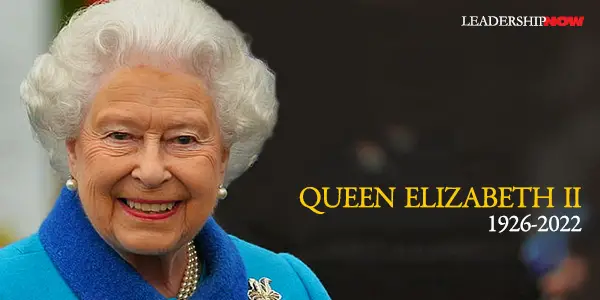
ELIZABETH ALEXANDRA MARY WINDSOR was born on April 21, 1926, during the reign of her grandfather, King George V. She died peacefully at Balmoral Castle in Scotland at age 96 on September 8, 2022 after having recently celebrated 70 years on the throne. She was the longest-lived and longest-reigning British monarch. Although the Queen shared a name with Elizabeth I they are not related. Elizabeth I was the last of the Tudor royal line, whereas the Elizabeth II is of the Windsor family. When King George V died in 1936, his son David took the throne as King Edward VIII, only to renounce it within a year to marry American divorcee Wallis Simpson. Consequently he abdicated and brother Albert was proclaimed King George VI. Upon his sudden death in 1952, he was succeeded by his elder daughter, Elizabeth II.
In 1947, 21-year-old Elizabeth married the man she had fallen in love with when she was 13: Greek-born British naval officer Philip Mountbatten, a distant cousin. Two years later, they moved to Malta, where Philip was stationed with the British Navy. Royal observers have thought that these were some of the happiest years of her life. In Malta she was able to drive her own car and mingle with other officers’ wives without the layers of security and protocol that have defined her reign. Philip died in April of 2021, just a few months shy of his 100th birthday. He and Elizabeth were married for more than 73 years, and the Queen often spoke of Philip as her “strength and stay.” Elizabeth’s coronation took place on June 2, 1953, coming to the throne as a 25-year-old mother-of-two. Winston Churchill was the first of 15 prime ministers to serve under her. She met every U.S. president during her time as Queen except Lyndon Johnson. The vast majority of Britons have never known another monarch, and she was overwhelmingly popular until her death. But it was never easy. As a leader she was authentic and a stabilizing force leading Britain through its reinvention after World War II. She enthusiastically enabled a community of nations as the Empire came to an end and bridged the gap between past and present. Through tragedies and triumphs, she kept calm and carried on.
“Criticism is good for people and institutions that are part of public life. No institution — City, Monarchy, whatever — should expect to be free from the scrutiny of those who give it their loyalty and support, not to mention those who don’t.
Posted by Michael McKinney at 08:16 AM
07.15.22

Leading in Volatile Times: 3 Lessons from Alexander the Great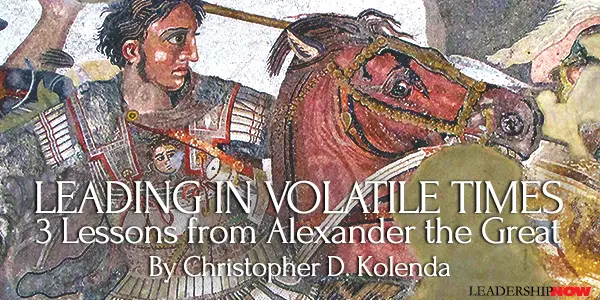
ALEXANDER THE GREAT (356–323 BCE) faced a volatile and uncertain world when he inherited the throne at the age of 19. His father, Philip II of Macedon, had been assassinated. Treachery came from rivals to the throne and powerful neighbors who wanted to test the new king. The calamitous Peloponnesian War, which engulfed the Greek world, had ended barely 70 years before. Nearby, the massive Persian empire threatened Greek independence. War, political instability, economic dislocation, and pandemics jeopardized young Alexander’s reign. Thanks to Aristotle’s tutoring on subjects ranging from politics and economics to ethics and rhetoric, the young king was ready to lead. Alexander knew how to think, so he could adapt to circumstances rather than be hidebound to a certain playbook. As I’ve studied Alexander the Great, three insights seem deeply relevant today. 1. Success starts with the ABCs: accountability, buy-in, and clarity Alexander made his priorities clear: secure the throne so that he had freedom of action, assert leadership over the Greek city-states to avoid civil war, and end the Persian threat so that the people of Greece could live and prosper in peace. Alexander had no time to waste as key Greek cities allied to fight against him. Though Alexander’s father had defeated many of the city-states and formed the Hellenic Alliance, with Philip’s death, Athens, Thebes, and others saw an opportunity to shift the balance of power. Alexander used a combination of diplomacy and cunning to gain their buy-in. Before marching on Athens, he stopped at Thermopylae to pay his respects for the heroic defense against the Persian invasion—and Athens came over to his side. Instead of having the iconic city militating against him, Alexander won its support. When Thebes revolted and refused to talk, Alexander sacked the city. He rewarded successful leaders with greater responsibility and fired incompetents. Consistency created accountability. Alexander also used the ABCs during his campaign against the Persians. He provided clarity about removing the Persian threat that had divided the Greeks and damaged their prosperity. He encouraged junior officers to come forward with ideas on how to best defeat the enemy. After beating the Persians in three massive battles, he adjusted his aims to conquest. By allowing trusted local leaders to rule, Alexander gained the buy-in of the Persian people as he marched across the Middle East and into modern-day Iran. He even adopted Persian customs and dress at court to increase the Persians’ sense of belonging. This practice caused a rift with his Greeks, who believed that Alexander was acting as if he were a god, so he adjusted his actions to reduce the tensions and maintain buy-in from all. With the right systems in place and high levels of buy-in across the empire, Alexander was able to focus on strategy and growth and not worry about whether people were doing their jobs. 2. Innovation is the best weapon Alexander applied ingenuity to vexing problems. For instance, when presented with the Gordian knot, he famously cut it rather than try to untie it. He used a similar approach in his battles. In his coastal march through modern-day Lebanon toward Egypt, Alexander was confronted by the city of Tyre, which was accessible only by sea. Leaving a hostile city in his rear would leave his logistics vulnerable. Rather than attempt a blockade or naval landing, Alexander built a causeway over the straits and joined the city to the continent, where it remains to this day. Alexander employed novel battle strategies that consistently surprised his numerically superior foes and allowed Alexander’s forces to win at the lowest possible cost. He maintained his practice of using diplomacy first, offering people a chance to join instead of fight, and was often welcomed as a liberator. Keeping trusted local officials in charge and respecting local customs and religion—while centralizing finance, logistics, and military training—allowed Alexander to maintain a functional balance. 3. When you let in the fresh air, you avoid suffocating on your own gas Autocratic rulers are at high risk of inhaling their own gas, egged on by favor-currying sycophants eager to tell the boss what he or she wants to hear. This situation leads to bad decisions with disastrous results. Here, Alexander’s last days serve as a cautionary tale. Alexander flirted with the line between conviction and obstinance. Greeks began to resent his adoption of Persian customs and dress and were horrified at the practice of obeisance at court, though Alexander wisely exempted Greeks from the practice. The stress of war and maintaining a cosmopolitan empire led to bouts of drinking and intoxicated rage. Alexander murdered one of his trusted subordinates who questioned the king’s judgment. Conspiracies to murder Alexander sprouted with greater frequency. The king self-corrected when he realized he lacked buy-in for greater conquest and a cosmopolitan empire. When confronted by his subordinates in India, Alexander turned his army around for Babylon, taking the perilous route through the Gedrosian desert. Dying of mysterious circumstances at 33, he left no successor. His subordinates divided the empire, and some of their kingdoms lasted 300 years or more. Lessons for today’s leaders Volatile and uncertain times have great hazards and opportunities. Limit the risks with the ABCs. Accountability, buy-in, and clarity will ensure that you maintain cohesion and do the fundamentals well. Innovation in the face of risk-averse competitors holds the potential for massive gains; you’ll ride the wave of change onto new shores as they tread water. Suffocating on your own fumes will be the biggest risk to your success, so surround yourself with trusted advisers who keep the fresh air flowing. 
Posted by Michael McKinney at 06:43 AM
07.04.22

The Improbable Achievement That Was the American Revolution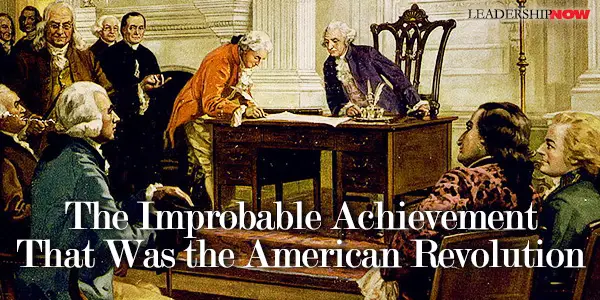
AMERICAN writer and pamphleteer Thomas Paine believed that it was common sense that an island could not rule a continent. “No event in American history which seemed so improbable at the time has seemed so inevitable in retrospect as the American Revolution,” writes Joseph Ellis in Founding Brothers. He adds: The creation of a separate American nation occurred suddenly rather than gradually, in revolutionary rather than evolutionary fashion, the decisive events that shaped the political ideas and institutions of the emerging state all taking place with dynamic intensity during the last quarter of the eighteenth century. No one present at the start knew how it would turn out in the end. It is easily assumed that all of the citizens of the American colony were on the same page. How else could it have worked? “The very term ‘American Revolution’ propagates a wholly fictional sense of national coherence not present in the moment.” It is only in hindsight that we assume the outcome. It is ironic that the very thing they were fighting against was an element in the nation they were trying to create. The key insight shared by most of the vanguard members of the revolutionary generation, is that the very arguments used to justify succession from the British Empire also undermined the legitimacy of any national government capable of overseeing such a far-flung population, or establishing uniform laws that knotted together the thirteen sovereign states and three or four distinct geographic and economic regions. The creation of the United States was a daunting task, to say the least. The United States is the world’s oldest enduring republic because “in 1787 a tiny minority of prominent political leaders from several key states conspired to draft and then ratify a document designed to accommodate republican principles to national scale.” The core principle being personal liberty and, therefore, personal responsibility. It may be easy to criticize what they accomplished almost 250 years later, but we would be wise to remember the words of historians Will and Ariel Durant, “No one man, however brilliant or well-informed, can come in one lifetime to such fullness of understanding as to safely judge and dismiss the customs or institutions of his society, for these are the wisdom of generations after centuries of experiment in the laboratory of history.” The checks and balances that permitted the infant American republic to endure were not primarily legal, constitutional, or institutional, but intensely personal, rooted in the dynamic interaction of leaders with quite different visions and values. What made it work was trust in the intentions of the other person. Their differences provided checks on each other. Character mattered because the fate of the American experiment with republican government still required virtuous leaders to survive. Eventually, the United States might develop into a nation of laws and established institutions capable of surviving corrupt or incompetent public officials. But it was not there yet. It still required honorable and virtuous leaders to endure. What happened in Philadelphia was truly a miracle. And on July 4th, we can be grateful that they, through all of the uncertainty, made it happen. 
Posted by Michael McKinney at 10:12 AM
05.30.22

Patton's Principles of Leadership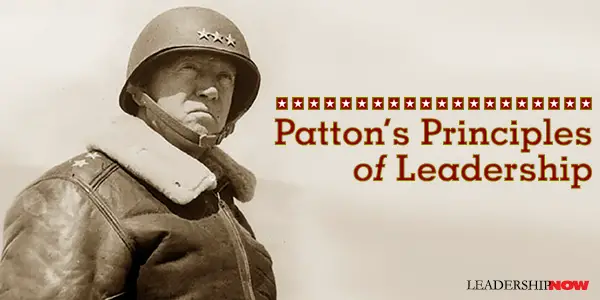
BORN in San Gabriel, California, in 1885, George S. Patton, Jr. was the general deemed most dangerous by the German High Command in World War II. Known for his bombastic style, it was mostly done to show confidence in himself and his troops, says author Owen Connelly. On December 21, 1945, Patton died in Heidelberg, Germany. The following day the New York Times wrote the following editorial: History has reached out and embraced General George Patton. His place is secure. He will be ranked in the forefront of America’s great military leaders.
Adapted from On War and Leadership: The Words of Combat Commanders from Frederick the Great to Norman Schwarzkopf by Owen Connelly
Posted by Michael McKinney at 07:26 AM
05.13.22

Disrupting the Game: Lessons from Nintendo’s Reggie Fils-Amié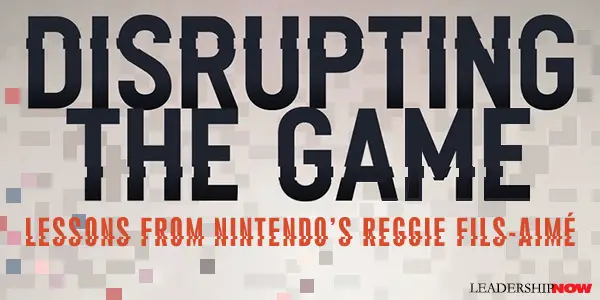
GROWING up the son of Haitian immigrants in the Bronx, Reggie Fils-Amié became the president of Nintendo of America through preparation and making the most of every opportunity. Curiosity drove him to new experiences. He writes in Disrupting the Game: Opportunity came when I saw the potential to achieve in ways that others didn’t immediately see. This led me to often choose untraditional paths that ran counter to expectations. Disrupting the Game is both a memoir and leadership guide. Placed throughout the journey he shares with us are what he calls “The So What.” These are the lessons gained from those experiences that he hopes will provide actionable advice in our own lives. Below are a several of the over forty lessons presented in the book: There’s a fine balance between staying true to your belief versus just being stubborn. Do you truly believe in a particular course of action, or is it your ego talking? When you are making a difficult or complex judgment, it’s especially difficult to know your own motivation. Be honest with yourself. Separate your own desire to be right or win an argument from your own core beliefs. Can you honestly say that you believe in your recommendation because it’s the right thing to do—that you’d get behind it even if someone else suggested it? 
Posted by Michael McKinney at 08:33 AM
02.21.22

First Friends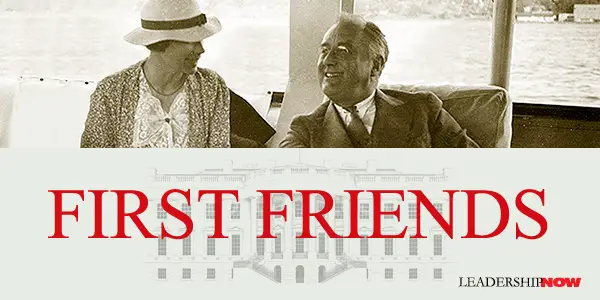
FRIENDSHIPS make a difference in the trajectory of our lives. Our friends can help shape who we are because they affect our choices and thus the paths we follow. It’s no different for people in power. Gary Ginsberg reports on the friendships that made a difference in the lives of nine of the presidents of the United States in First Friends: The Powerful, Unsung (And Unelected) People Who Shaped Our Presidents. When vetting Al Gore for the potential VP spot, Ginsberg came into contact with LBJ’s White House lawyer and chief speechwriter Harry McPherson. McPherson’s overriding concern was, “Does he have any friends?” People he can relax with, have drinks with and share the issues with. Reflecting on his time spent with Johnson, McPherson “recognized that there was a gaping hole in Jonhson’s life, one that could have been filled with a friend who might have enabled him to be a more successful president. Over his long agonizing debate over Vietnam, for example, Harry had theorized an intimate could have helped clarify his thinking and eased the pressure as the country divided over the war and ultimately forced his early retirement.” A presidential friend may not be essential to their success, but it does say something about them. McPherson concluded, “If he can’t develop or even claim one real friendship, how’s he going to lead a nation?” Ginsberg explores the relationships and the impact they had between:
Most of the presidential friends were content with staying in the background and just being a friend, which made them so valuable as friends. Their friendship didn’t depend on political office or a personal agenda. They often provided the Yin to their Yang: “For Jefferson to be Jefferson—big thinking and idealistic to the max—he needed as his stabilizer and actualizer the more practical, cautious Madison.” They made them better: “Jackie loved in Jack the man he wanted to be, and David was the man helping him, in her eyes, to be the man Jack wanted to be.” Sometimes they were just a sounding board, there to listen while they worked through their thoughts. Ginsberg writes, “those presidents who did have First Friends were almost always the better for it—and so was the country.” And we are too. We all need some First Friends. 
Posted by Michael McKinney at 07:14 PM
02.14.22

Corruptible: Who Gets Power and How It Changes Us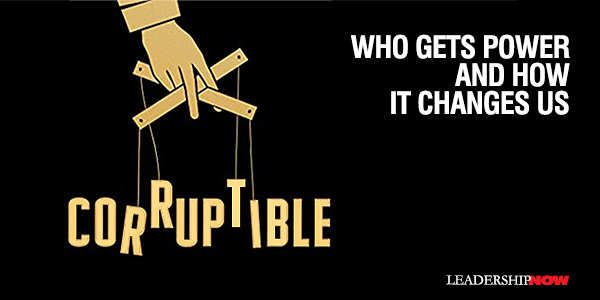
DO worse people get power? Does power make people worse? We’ve all heard Lord Acton’s words lifted from a letter taking Bishop Creighton to task for his indifference to the torture and execution of innocents: “Power tends to corrupt, and absolute power corrupts absolutely. Great men are almost always bad men.” Thomas Jefferson Jefferson held a similar view. Writing to a friend, he observed, “Whenever a man has cast a longing eye on [office], a rottenness begins in his conduct.” Power does indeed corrupt. But as Brian Klaas states in Corruptible, “our overly cynical view of how much power corrupts is wrong. Some of that has to do with four phenomena that are too often overlooked when we praise or condemn authority figures. I call these four phenomena dirty hands; learning to be good at being bad; opportunity knocks; and under the microscope.” Dirty Hands What happens when an unbearable choice has to be made? Sometimes people in power, when faced with two bad choices, try to choose the lesser evil. The dirty hands problem skews our evaluations of leaders by making them appear worse than they actually are. When we say “power corrupts,” we mean power makes people worse than they previously were. Instead, much of the time, they just have to make worse decisions, which isn’t the same. Learning to Be Good at Being Bad Bad people learn over time how to get better at being bad. Power didn’t make them bad. They have always had questionable character. Learning is an integral part of getting power and holding on to it. That creates a misperception. If you analyzed the data, it would appear as if someone were getting worse over time—that power was corrupting them. In fact, their bad intent may have been static while their effectiveness increased. They were always corrupt. They just got better at it. Opportunity Knocks Give someone power, and they have more opportunity to do harm and to more people—the consequences are greater. Just because someone doesn’t have the opportunity to do harm doesn’t make them virtuous. Our intuition is to determine who the “bad people” are by how often they do bad things. We make those judgments without any reference to how often an individual faced with an easy opportunity to behave badly and hurt other people. That’s a particularly relevant insight for people in power, because being put in a position of authority necessarily produces more frequent—and more consequential—opportunities for wrongdoing. Under the Microscope Those in power are scrutinized more than those with less power. No news flash there. But it skews how we view those in power—and those who are not. Sometimes, the rich and powerful can use their considerable resources to divert that gaze, or to disguise abuse or crimes as legitimate activity. But much of the time, seemingly worse behavior by those in power can be chalked up to an exploration that we consider less often: they’re simply more scrutinized than the rest of us. Nevertheless, most studies find that power makes us worse. One study called the “dictator game” found that as power increased, so did selfish behavior. Before the dictator game was played, they asked participants how a leader should behave in a situation in which they’re tasked with sharing resources. As you’d expect, most said that a leader should be magnanimous and share fairly with others. Yet, when they soon found themselves in a leadership position faced with that exact choice, only half of the people in the low-power group actually behaved as they said a leader should. In the high-power group, only one in five stuck to their stated principles and shared fairly. Power doesn’t just corrupt, it also makes you more of a hypocrite. Then there is the Dark Triad: Machiavellianism (the end justifies the means), narcissism (self-absorption, arrogance), and psychopathy (lacks empathy, is impulsive, reckless, manipulative, and aggressive). We probably all have a little of this inside, but at the far end of the continuum, we have much more than control freaks. We have tyrants and dictators who act their whims with abandon. Psychopaths, the darkest of the Dark Triad, can blend in. “The psychopaths in the boardrooms are the intelligent ones who figured out a way to control themselves as they sought to control others.” They are “drawn to power and are better at getting it.” And they are rare. Fortunately, as Klaas shows, most bosses don’t peg the needle on the Dark Triad needle. Since all of the available evidence points in one direction—“becoming powerful makes you more selfish, reduced empathy, increases hypocrisy, and makes you more likely to commit abuse”—why then do we let people control us that have no business being in power? And how do we keep them out? Klaas offers ten prescriptions to this problem from improving our recruitment process, better oversight, rotation of leaders, to reminding them of their responsibilities, and the most effective tool of all, stop waiting for principled saviors—make them instead. You may remember the story of Cincinnatus. As the legend goes, The Roman army was surrounded. The country was in need of a leader who would seize the moment and turn the situation defeat into victory. They called upon a man who was out plowing his field, a farmer. He came. He saw. He conquered. He went home. Cincinnatus gained fame for his selfless devotion to his country. This half-legendary hero of the Roman Republic gave his all in a time of crisis and then gave up the reins of power when the task was done and went back to his plow. George Washington did the same thing over two thousand years later. After two terms as president, he refused to continue and returned to Mount Vernon. Neither man sought power, and perhaps that is why they were able to use their power wisely. Instead of waiting for our principled saviors to leave their farms, a more realistic goal is to change our systems to make ordinary people behave like Cincinnatus: answering the call to power rather than seeking it, and relinquishing control rather than relishing its intoxicating effect as it corrupts. Incorruptibility requires a character that we don’t see too often in our most visible leaders. It is not encouraged by social media, taught at schools, or in many homes. But that is the path for making power a tool for good for all. If we understand power, we know that we all have to potential to abuse it. That alone should temper our tweets when we want to attack someone who disagrees with us. Otherwise, we fall into the same trap we are condemning. Our stubborn assumptions corrupt our thinking. Fortunately, Klaas manages to avoid that in this exposé on power. As Barbara Tuchman reminds us in The March of Folly, “Chief among the forces affecting political folly is lust for power, named by Tacitus as ‘the most flagrant of all the passions.’ Because it can only be satisfied by power over others, government is its favorite field of exercise.” 
Posted by Michael McKinney at 08:26 AM
01.26.22

Indra Nooyi: My Life in Full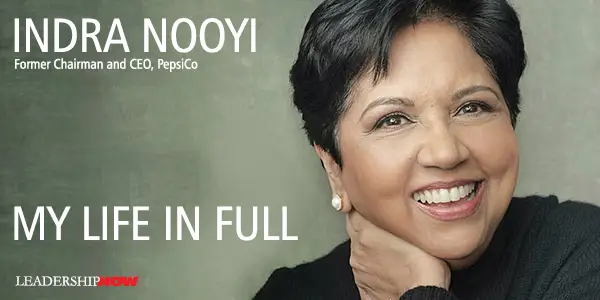
THE life story of Indra Nooyi is compelling and instructive. She grew up in Madras (now Chennai), India. Her memoir, My Life in Full is much more than an event-driven biography. It is full of candor and insights that reveal much about her character. She is a driven yet humble leader. It’s hard to put down. Growing up in the 50s and 60s, she recalls, Madras was a place that came to life at 4 a.m. and shut down at 8 p.m. Her family played a huge role in her life, as much of her success can be credited to her upbringing. Our Madras household was always noisy, with plenty of laughing, arguing, and shouting. It was a strict environment. Our life was steady and pushed me to learn both self-discipline and how to speak up. I got the courage to branch out and prove myself because I was raised with a framework that gradually gave me the freedom to explore. There was always home to anchor me. “The twin demands that define me have always been my family and my work.” She states this truth that, unfortunately, has been lost on so many today: Family, I learned from the very beginning, is fundamental to our lives on this planet. It is both my foundation and the force that has propelled me. We thrive, individually and collectively, when we have deep connections with our parents and children, and within larger groups, whether we are related or not. I believe that healthy families are the root of healthy societies. Refreshingly, she talks candidly about the obstacles she faced in a constructive way—never playing the victim. Always juggling family and career. The challenges of being a woman. Personal responsibility and self-efficacy are very much a part of who she is. In college, she joined the debating team. “Looking back, I can say that debating helped me build my confidence and hone my ability to persuade others to accept my point of view, and artfully push back on an opposing perspective. It was endlessly helpful.” In 1978 she moved to the United States to study at Yale University. “I entered the US through the front door, with a visa and a seat at a prestigious university. It was my choice, and I knew it meant that I had to work my way up. Maybe this prepared me for a tough life in the corporate world; it certainly required me to accept heartache and pain in my personal and professional lives and to just plow on. My duty was to honor this opportunity.” After Yale and her marriage to Raj Nooyi, she takes us through her career changes and the lessons she learned along the way. “Leaders need to understand the details behind what they are approving before they affix their signature to anything,” says Nooyi. “This is not about trusting the people that work for you. It’s about basic responsibility. Don’t be a ‘pass-through.’” Earlier in her career, when working for Motorola, she demonstrated the need to get herself up to speed before making any decision. She recalls, “I knew nothing about cars and electronics. So, I had two community college professors come twice a week to my office for lessons.” A pattern she followed for the rest of her career. In 1994 she took her first position at PepsiCo and eventually rose to CEO in 2006. Her plan was to rethink the company and add three imperatives to their work: nourish humanity and the communities in which we live, replenish our environment, and cherish the people in our company. She called it Performance with Purpose. No business can ever truly succeed in a society that fails. I believe that a company’s impact on society needs to be written through all business planning, and that this cannot be an afterthought. What’s good for commerce and what’s good for society have to go together. This leadership philosophy has guided her success: “The fundamental role of a leader is to look for ways to shape the decades ahead, not just react to the present, and to help others accept the discomfort of disruptions to the status quo.” She says the “frustrations of motherhood persisted for me, and I still felt plenty of low-lying guilt. For all my work stress, travel, and impossible schedules, I really tried to make sure I was a caring, involved mother to the extent I could.” I have to share this story as it says so much about her and her family and the grounding it gave her. After she got the news that she would become the president of PepsiCo, she headed home at about 10 p.m. The wintery roads were peaceful and dark. In those fifteen minutes behind the wheel, I let myself enjoy my accomplishment. I had worked so hard, learned so much, and earned my place. As she reflected on her mother’s comment, she thinks it speaks to something “deeply important about how we combine work and family. She was right, of course, that no matter who we are or what we do, nobody can take our place in our families.” At the same time, yes, she should have let her share her news. “I have a feeling that if I were a man, a husband, a father, I might have had a little more leeway.” I know it’s easier said than done, but we really need to let go of perfection. I often felt that, even as I was gaining influence and power in the corporate world, I was failing my family because I wasn’t home more. Looking back, I’m a little heartbroken that I spent so much energy worrying about this. Nooyi is grateful for her relationship with her husband, Raj. “The only way our marriage works and lasts is because we are on this journey together for the success of our entire family. For any working woman with kids, a supportive spouse can compensate for all of the guilt we carry around.” The “crown in the garage” comment also speaks to the broader relationship between power and humility. This is an incredible lesson for those who rise in their careers and end up in roles that give them real authority in the workplace and in society. Don’t miss this book—My Life in Full. 
Posted by Michael McKinney at 09:01 AM
09.10.21

Elon Musk: In His Own Words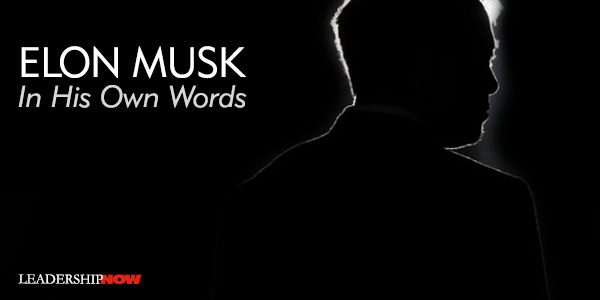
ELON MUSK is a polarizing figure. In part, because he thinks differently than most people. At a 2017 World Government Summit, he once told an audience, “Some people think I’m an alien.” His raw ideas may sound irrational, but in time they seem obvious — even to his critics. Editor Jessica Easto has compiled his thoughts in Elon Musk: In His Own Words. Easto has organized the book into three parts: Getting Started, Growth, and Wit, Wisdom, and Personal Values. Here are several: ☙ I think I would make far fewer mistakes [if I were to go back in time and talk to my 20-year-old self], like, “Here’s a list of all the dumb things you’re about to do. Please do not do them.” It’d be a very long list. ☙ Do you have the right axioms, are they relevant, and are you making the right conclusions based on those axioms? That’s the essence of critical thinking, and yet it is amazing how often people fail to do that. I think wishful thinking is innate in the human brain. You want things to be the way you wish them to be, and so you tend to filter information that you shouldn’t filter. ☙ I do think a good framework for thinking is physics, you know, the first principles reasoning. What I mean by that is boil things down to their fundamental truths and reason up from there as opposed to reasoning by analogy. Through most of our life, we get through life by reasoning by analogy, which essentially means kind of copying what other people do with slight variations. And you have to do that, otherwise mentally you wouldn’t be able to get through the day. But when you want to do something new, you have to apply the physics approach. Physics has really figured out how to discover new things that are counterintuitive, like quantum mechanics; it’s really counterintuitive. ☙ A lot of times people think creating companies is going to be fun. I would say it’s not. It’s really not that fun. There are periods of fun, and there are periods where it’s just awful. Particularly if you’re the CEO of the company, you actually have a distillation of all the worst problems in the company. There’s no point in spending your time on things that are going right, so you only spend your time on things that are going wrong.... I think you have to feel quite compelled to do it and have a fairly high pain threshold. ☙ It’s better to approach this [building a company] from the standpoint of saying—rather than you want to be an entrepreneur or you want to make money—what are some useful things that you do that you wish existed in the world? ☙ Fundamentally, if you don’t have a compelling product at a compelling price, you don’t have a great company. ☙ Things move as fast as the least lucky and least competent supplier. Any natural disaster you care to name—all of those things have happened to our suppliers. The factory has burned down, there’s been an earthquake, there’s been a tsunami, there’s been massive hail, there’s been a tornado, the ship sank, there was a shoot-out at the Mexican border—no kidding. That delayed trunk carpet. ☙ If we don’t succeed, then we will be certainly pointed to as a reason why people shouldn’t even try for these things. So I think it’s important that we do whatever is necessary to keep going. ☙ Always take the position that you are, to some degree, wrong, and your goal is to be less wrong over time. ☙ You should actually take the approach that the constraints that you are given are guaranteed to be some degree wrong.… The counterpoint would be that they're perfect [which is never].... Question your constraints. It does not matter if the person handing you those constraints won a Nobel Prize—even Einstein was wrong some of the time. ☙ I have no problem with negative feedback, nor do I have a problem with critical reviews. If I had a problem with critical reviews, I would spend all my time battling critical reviews. There have been hundreds of negative articles—hundreds—and yet I’ve only spoken out a few times. I don’t have a problem with critical reviews, I have a problem with false reviews. ☙ The first step is to establish that something is possible; then probability will occur. ☙ As you get older, your obligations increase. And once you have a family, you start taking risks not just for yourself but for your family as well. It gets much harder to do things that might not work out. So now is the time to do that—before you have those obligations. I would encourage you to take risks now; do something bold. You won’t regret it. ☙ I just want to emphasize that sometimes—in fact, most of the time—I get way too much credit or attention for what I do. I’m just the visible element. But the reason those companies are successful is because we have extremely talented people at all levels that are making it happen. ☙ Honestly, I really am just trying to do the most amount of good with the time that I have on this earth. And, you know, not always succeeding, but that’s the goal. ☙ Really should be a rule that oatmeal-raisin cookies can’t look too much like choc chip. Doppelgänger cookie trickery! 
Posted by Michael McKinney at 10:47 AM
08.30.21

Made From Scratch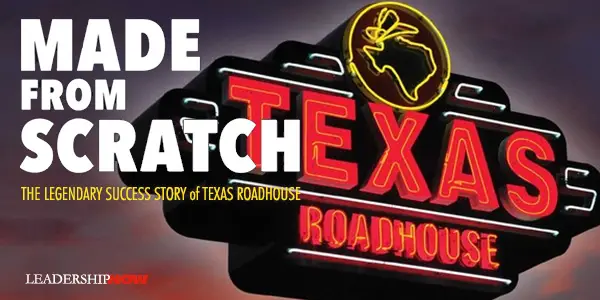
THE KIND OF SUCCESS Texas Roadhouse has enjoyed didn’t happen by doing things the conventional way. But then founder Kent Taylor is not a conventional guy. He dropped out of business school and threw away the rule book. Through trial and error and a whole lot of perseverance, he opened the first Texas Roadhouse in 1993. He describes Texas Roadhouse as “a people company that just happened to sell steaks.” In 1997 he was awarded an Emerging Entrepreneur of the Year. Regarding that occasion, he said that his “emerging” took him thirteen years “from idea to rejection, from success to failure, and finally from failure to a glimmer of success.” His story is told in Made from Scratch. It is a well-written story that takes us from his days as a student-athlete through his formative years working his way up in bars and restaurants from busboy to manager, to the wild ride founding and growing Texas Roadhouse into the international success it is today. In 1997 he was awarded an Emerging Entrepreneur of the Year. Regarding that occasion, he said that his “emerging” took him thirteen years “from idea to rejection, from success to failure, and finally from failure to a glimmer of success.” Throughout the book, his colleagues, friends, and family members weigh in on Taylor’s remarkable journey, and at the end of each chapter, he summarizes lessons he had learned along the way. It is a great mix of the lessons, the mistakes, the rejections, personal growth, and the counterintuitive ideas that worked. Some of the lessons Taylor shares are: There’s a perception that we can’t do much about our weaknesses in life, so we should only focus on our strengths. That’s BS. We can often get better at something if we love it and are willing to put in the work (running, in my case). In some cases, we can even become outstanding. Weaknesses can become our strengths. 
Posted by Michael McKinney at 09:09 AM
04.23.21

Hot Seat: Jeff Immelt at GE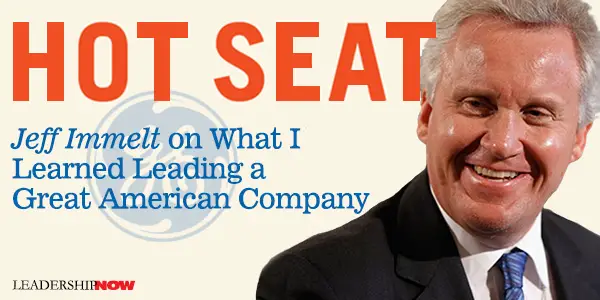
IN SEPTEMBER 2001, Jack Welch was a tough act to follow. The day after Jeffrey Immelt became CEO of General Electric, he had an even bigger challenge to deal with—the 9/11 terrorist attacks. Immelt states in Hot Seat: What I Learned Leading a Great American Company: The best leaders absorb fear. I’m not talking about soothing people by blowing smoke or giving false assurances. I’m talking about giving people the truth but also giving them a way forward. In the wake of 9/11, GE’s people needed to hear, and to believe, that we had a plan and that, working together, they could help us execute it. They didn’t need to hear that I was so agitated that I struggled to keep food down. That’s baptism by fire. Jack Welch led GE to some impressive numbers. In his twenty years as CEO, GE’s value had risen 4,000 percent. But numbers can hide looming issues until they don’t. GE had internal problems, it was overly reliant on GE Capital, and it was not digitally literate and innovative. And in 2001, the economic tailwinds that Welch enjoyed were about to shift. Much of what needed to be done at GE were long-term propositions. It’s always a challenge to help the naysayers within your own ranks, let alone helping the investors and pundits understand the value of what needs to be done. This was the case with GE Digital, a new subsidiary created to provide software and Industrial Internet of Things services to industrial companies. Tech start-ups define success, especially in the first decade, on how well they acquire customers, build capability, and penetrate their emerging markets. That wasn’t how GE had traditionally defined success. We were about increasing revenues and making our numbers. Analyzed by that metric, this little start-up within a big parent company was seen by many as a disappointment. Immelt gives us an inside look—the other side of the story—at what happened at GE while he was CEO. He reveals the complexities of running a global company of over 200,000 employees. I don’t think if Welch stayed on, it would have been much different. Times were changing, hidden problems were beginning to surface, and unforeseen events were to impact the nation. What Welch built was not sustainable. There were lapses in judgment (Yes, he talks about the chase plane) and mistakes made, to be sure, as he admits in this book. GE Capital should have been reined in faster for one thing. Acquisitions were made in an attempt to move GE in a new direction in accordance with the marketplace and to shore up businesses GE was already in. When stock value drops 30% on your watch, you can bet people are looking for a scapegoat. It’s easy to point fingers and have all of the answers from the sidelines, but when you’re actually in it working through the ambiguity, it’s another story. That should be a lesson for all of us. Some people point fingers in a crisis, others solve problems, and there’s very little overlap between these two groups. In a blaming culture, people can stop working in order to cover their own asses. If you can nurture an ethos of “all for one and one for all,” it can save your bacon. Good people will stand alongside you in a righteous fight. When you have a strong team, you can weather any crisis. Without that, you are lost. Jeff Immelt and his co-author Amy Wallace have written a very readable, inside look at Immelt’s 16 years as CEO of GE. There are many lessons and takeaways to be found inside. Immelt is now a partner at New Venture Associates, a Silicon Valley venture capital firm. He also lectures at the Stanford Graduate School of Business. “The media always look for a single person, a CEO or an entrepreneur, to personify the accomplishemnts of an entire company or industry. It makes good reading, but it’s simplistic.” 
Posted by Michael McKinney at 03:50 PM
12.11.20

The Company I Keep: How Leonard Lauder Built Estée Lauder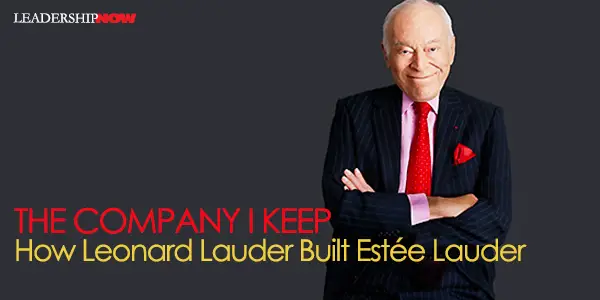
ESTÉE LAUDER founded what would become the Estée Lauder Corporation in 1933 on the conviction that “every woman can be beautiful.” Her ambition was to have a life filled with beautiful things, and that “rested entirely on her ability to sell her skincare products.” The first five chapters of The Company I Keep: My Life in Beauty are a must-read for any entrepreneur. Her son, Leonard, details the tenacity, business acumen, salesmanship, and mindset of a superstar businesswoman. Her Uncle John developed a face cream, and she began demonstrating it in high school. She wrote, “Deep inside, I knew I had found something that mattered much more than popularity. My future was being written in a jar of cream. My moment had come and I was not about to miss seizing it.” She pioneered the “sales technique of the century:” the free sample. No woman would ever leave empty-handed. Estée Lauder was built on the free sample.
My mother didn’t realize it at the time, but her insistence on personally training saleswomen would be a key differentiator when she eventually opened counters in department stores. Other brands used saleswomen to merely sell products; thanks to my mother’s training program, her salespeople taught customers how to use her products to look their best. Her hands-on approach—what her father had dismissed as “fiddling with other people’s faces” —was a charm. “Touch your customer and you’re halfway there,” she would preach. And she was a tenacious saleswoman even following New Yorkers who headed south to winter in Miami—staying for months. My mother stopped at nothing in order to inform every woman about her products so that she would tell more women. No one escaped. She stopped strangers on the street and on trains to give them beauty tips. She famously interrupted a Salvation Army sister’s bell-ringing to explain how she could make her skin look and feel fresher. “There’s no excuse for looking untidy,” she admonished. An acquaintance from those years remembered how my mother would approach someone she had never met before, evaluate her makeup, and proceed to tell her how to correct it. “She would end up selling her $40 worth of Cosmetics.” Leonard learned many lessons watching his mother, and his quest for excellence served him well during his time in the Navy. One of the greatest lessons he learned there was, “No matter how smart you think you are, there’s always someone who’s smarter. No matter how good you are, there’s always someone better. I would search out and hire exactly those people.” This belief, he says, would help play an enormous role in the growth Estée Lauder. And if he had to fire someone, he took responsibility. “Everyone has worth. The fact that we have no been able to take advantage of your skills is not your fault. It’s our fault.” He wanted to build Estée Lauder into the General Motors of the beauty business, “with multiple brands, multiple product lines, and multidimensional distribution.” The book is full of great lessons and the stories behind them. Here are some I pulled out. Positioning is the product. 
Posted by Michael McKinney at 02:12 PM
09.18.20

Time to Lead: What We Can Learn from Great Leaders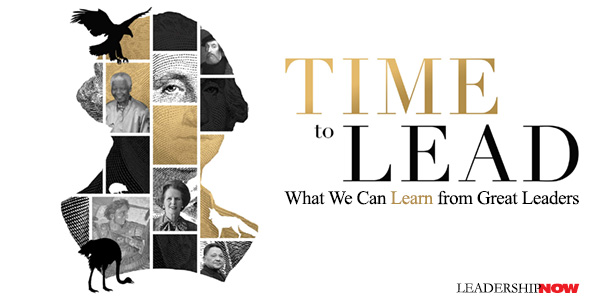
AS professor Jan-Benedict Steenkamp states in Time to Lead, “Everybody can improve their leadership qualities by reading about other leaders, how they resolved their dilemmas, and why they were successful.” Peter Drucker was asked whether he considered himself more of a historical writer or a management thinker: “More a historical writer,” Drucker answered. He explained that the human being has changed relatively little during the known course of history. We therefore gain more valuable leadership insights from historical analogies and examples than by embracing the latest management fads. A quick survey of the world today would suggest that historical knowledge and the lessons we can learn from it, is critically lacking. Steenkamp begins to shore up that deficiency, by looking at the lives of 16 men and women and the decisions they were faced with that changed the course of history. He analyses each in terms of three dimensions. First, he looks for seven leadership traits: Intelligence, Self-Confidence, Integrity, Sociability, Emotional Intelligence, Humility, and Grit. The leaders in the book differed greatly in this area. While some showed no sign of some of these traits, they all demonstrated a high degree of grit or determination. Second, he identifies four types or leadership metaphors: the hedgehog, the fox, the eagle, and the ostrich. Developed from Isaiah Berlin’s expose of the Greek poet Archilochus statement that “the fox knows many smaller things, but the hedgehog knows one big thing.” He writes, “According to Berlin, the distinction between hedgehogs and foxes marks ‘one of the deepest differences, which divide … human beings.’”
Hedgehogs “know much better where they are going (ends) than how to get there (means).” They are guided by a single long-term vision, seeing the forest rather than the trees. On the other hand, foxes “know much better how to get somewhere (means) than where they are going (ends). They are operation rather than strategic leaders.” (As a side note, all of the leaders profiled with the exception of Campbell-Bannerman, exhibited strong hedgehog qualities. However, all were eagles because, in time, they were able to align their means with goals.) Eagles are a combination of the hedgehog and the fox. They “know where they are going (ends) and how to get there (means).” While dealing with the trees they never lose sight of the forest. They are agile and adaptive. Ostriches have neither the qualities of the hedgehog or the fox. They “neither have a clear idea where they are going (ends) nor how to get there (means). Being clueless, they lack a compelling central vision. Next, Steenkamp looks at each leader in terms of seven leadership styles: Adaptive, Persuasive, Directive, Disruptive, Authentic, Servant, and Charismatic leadership. In the appendix of this book you will find three assessment tools: the Grit Scale, the Hedgefox Scale, and SAILS an assessment for leadership styles. Since the point of looking at these leaders live is to learn lessons that we can apply to our leadership today, he chose leaders that could be used to explain a certain leadership style, show the application of a leadership style in practice, prove the possibility of a leadership style across different circumstances, and leaders whose experiences he could derive general insights. In each of the seven leadership styles, he looks at the following leaders: Adaptive Leadership—Modify According to the Circumstances
Persuasive Leadership—Change the Minds of Your Followers
Directive Leadership—Define the Marching Orders
Disruptive Leadership—Break with The Past
Authentic Leadership—Set the Example
Servant Leadership—Put Followers First
Charismatic Leadership—Buy into the Leader, Then Follow Their Vision
All of these great leaders are human and struggle with the same kinds of things we all do. The stories of their lives and the decisions they were faced with are encouraging if only to show that you don’t have to be super-human to face your own critical moments. From these accounts you will see that no one style or set of traits will bring you leadership success. But by learning to understand these leaders in their times, you will begin to understand yourself better. 
Posted by Michael McKinney at 08:05 AM
01.22.20

What Robert Greifeld Can Teach You About Getting Your Organization On Track
TURNING AROUND an organization requires a new story. A very clear and well-told story. When Robert Greifeld was asked to take the helm of Nasdaq in 2003 to execute a turnaround, he came with a new story. As he relates in Market Mover, the story had five parts: 1. Get the Right People on Board
In any cultural or business turnaround, the right people make all the difference. You can’t predict the future, so you need people that get the new story. You can’t control circumstances, but what you can do is to ensure that you have the best people in place so that when the world changes around them, they can adapt, respond, and step up. That’s why my motto has always been people first. He believes that you should promote before you recruit and offers this advice on finding them: Often, the people who are right for the new culture are not individuals who thrived under the previous regime. Change the culture, and inevitably, people with skill sets more apropos to the next context suddenly stand out. He wasn’t looking for just smart people, but people with bandwidth. That is, people with the “capacity to fruitful focus one’s attention on multiple areas.” He also encouraged debates among his executive team. The point of the debate wasn’t to enact a perfectly democratic ideal. It was to achieve better clarity on all of the issues involved so everyone understood the reasons for proposed changes, and my decision-making was both transparent and much better informed. Next, Greifeld had to get people working on the right things. “A common trait of those who fail, I believe, is that they end up working on the wrong things.” Prioritizing is the challenge. As a leader, I consider it my job to focus on what’s not working. Optimism is essential if you’re to take risks and succeed; indeed, it’s probably true that the only people who really accomplish things are the optimists. But that optimism must be tempered by a disciplined and critical perspective. A focus on cash is vital, but it’s important to remember that you can’t save your way to success. “When a culture is focused entirely on thrift, the next big thing is usually invented somewhere else.” To address the technology gap at Nasdaq, Greifeld went outside to buy winners—smart acquisitions. Today’s outsiders are tomorrow's establishment. Business leaders should always cultivate an attentive disposition toward outsiders, especially in industries impacted by technology. Always be on the lookout for new ideas, products, and technologies happening on the edges of your business ecosystem, where outsiders are developing a different picture of your future in apocryphal garages and basements. Naturally, Nasdaq must deal with regulation and government oversight, but no matter what business we are in, we must sell ideas to others. “Don’t feel like you’re above politics—none of us are. Learn to work with it and use it to increase your competitive advantage. Lobbying is education. It’s an opportunity to get important perspectives on the table so legislatures and regulators can actually make informed decisions.” Motivation to change is easier when you are threatened, but when times are good, when you have things where you want them, change is much harder. You always need to be looking for ways to change and grow. As NASDAQ grew and matured, Greifeld realized that he was not as essential as he had been. It was time to move on. He left the CEO position to someone he promoted when he first arrived, Adena Friedman. “Business is a marathon, not a sprint, and to be a leader in the marathon takes an unusual degree of fitness—mental, emotional, and physical.” Market Mover is of course, full of the nuts and bolts of financial technology and the digital economy, but it is so much more. It is not just about the revival of Nasdaq’s near-death experience but is a course in leadership and the entrepreneurial spirit that drives innovation and growth. He writes candidly of the most critical moments of his thirteen-year career at Nasdaq with each chapter focusing on a headline-making event. He takes us through his response and the lessons he learned. This book will not only help you be a better leader, but the insights you will find here will prove invaluable in guiding you as you build your organization. 
Posted by Michael McKinney at 02:35 PM
01.20.20

You Can Never Do Wrong, Doing Right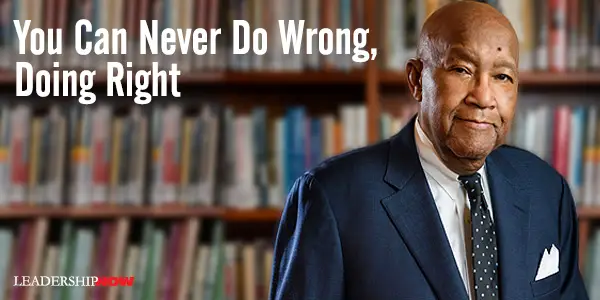
ON Martin Luther King Day, it is worth meeting a close friend of his, Robert J. Brown. Brown is the great-grandson of a slave. Raised by his grandmother in High Point, North Carolina, she used to tell him, “Bobby, do the right thing because you can never do wrong, doing right. You can’t go wrong.” And that has proven true for him over and over again. Although he grew up in poverty, his grandmother—he called her Mama—taught him about stewardship early on. Once when he was young, he asked her, “why do we give our food to these people who spend their days and nights drinkin’ and sleepin’ in the street when you and Daddy and Bill and me work so hard to put it on the table?” My question must have touched something in her. Mama waved for me to come up and sit in the chair with her. When I’d settled in, she told me a story from the Bible, of the time when Jesus knocked on someone’s door for help, but they turned Him away because He was dressed in rags. 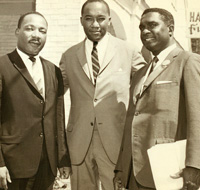 Sir Isaac Newton said, “If I have seen further, it is by standing on the shoulders of giants.” Great people stand on the shoulders of great people, and for Martin Luther King, Nelson Mandela and many others, Bob Brown helped make their success possible. His remarkable story is chronicled in his inspiring autobiography, You Can’t Go Wrong Doing Right: How a Child of Poverty Rose to the White House and Helped Change the World. 
Posted by Michael McKinney at 07:00 PM
10.14.19

Robert Iger's 20 Leadership Lessons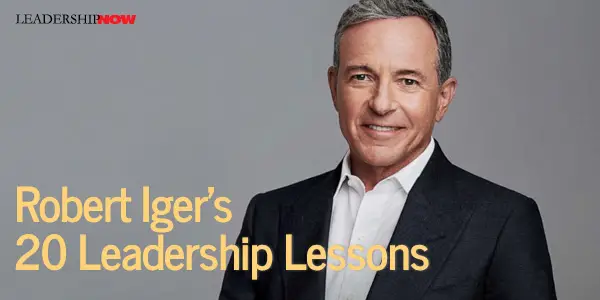
ROBERT IGER has worked for the same company for forty-five years: twenty-two of them at ABC, and another twenty-three at Disney, after Disney acquired ABC in 1995—the last fourteen of those years, as the CEO of Disney. He shares it all in The Ride of a Lifetime. Like the biggest, most exciting rides were once called at Disneyland, he says his time as CEO of Disney has been like a fourteen-year ride on a giant E-Ticket attraction. After sharing a bit of his background, he quickly delves into his career beginning at ABC, and the lessons he’s learned and the principles that have guided him that help “nurture the good and manage the bad.” He explains the thinking behind his habit of waking at 4:15 am. It’s vital to create space in each day to let your thoughts wander beyond your immediate job responsibilities, to turn things over in your mind in a less pressured, more creative way than is possible once the daily triage kicks in. I am certain I’d be less productive and less creative in my work if I didn’t also spend those first hours away from the emails and text messages and phone calls that require so much attention as the day goes on. Iger writes of the key mentors in his career and his relationship with Steve Jobs, George Lucas, and Michael Eisner. Iger truly embraces innovation. When he took over as CEO in 2005, he laid out three strategic priorities saying it should be about the future, not the past: Recommit to the concept that quality matters, embrace technology instead of fighting it, and think bigger—think global—and turn Disney into a stronger brand in international markets. These priorities have guided the company through all of the growth and acquisitions since he was named CEO. Today, Disney is the largest media company in the world, counting Pixar, Marvel, Lucasfilm, and 21st Century Fox among its properties. Its value is nearly five times what it was when Iger took over. You have to approach your work and life with a sense of genuine humility. The success I’ve enjoyed has been due in part to my own efforts, but it’s also been due to so much beyond me, the effort and support and examples of so many people, and to twists of fate beyond my control. What follows are 20 leadership lessons from the book but stripped of the stories that brought them to life. You’ll have to read the book to get that. 1
2
3
4
5
6
7
8
9
10
11
12
13
14
15
16
17
18
19
20

Posted by Michael McKinney at 10:39 AM
10.07.19

Stephen Schwarzman’s 25 Rules for Work & Life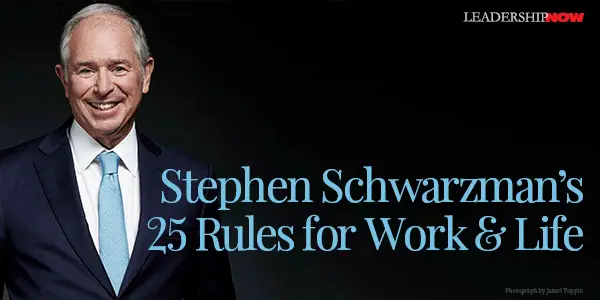
BLACKSTONE chairman, CEO, and co-founder Stephen Schwarzman has written a book about the potential that can be realized when you combine personal responsibility with ambition. What It Takes: Lessons in the Pursuit of Excellence chronicles his life leading up to the founding of Blackstone and the journey to build it into what it has become today. He shares the lessons and the opportunities that have come his way as a result of his success. It is inspiring and instructive. Well worth the time to read. Schwarzman grew up in a successful entrepreneurial family selling curtains and linens in Philadelphia. His Dad was content with the one store. Schwarzman was not. He had more ambition. Even in high school he wanted to create something more than the status quo. Through connections and hard work, he got a popular rhythm and blues group of the late 50s, Little Anthony and the Imperials, to come and play at his school. He learned that “if you want something badly enough, you can find a way. You can create it out of nothing. But wanting something isn’t enough. If you’re going to pursue difficult goals, you’re inevitably going to fall short sometimes. It’s one of the costs of ambition.” But you try anyway. With good grades and being fleet-of-foot, he was admitted to Yale University. Like most freshmen, he was lonely and intimidated. He got through it and during the summer he grew in confidence by taking a job at sea. With a new mindset he began his sophomore year determined to make it create something out of nothing as he did in high school. He started a dorm room business and a dance society to bring girls around. His determination and creativity make for a good read. After graduation he got a job at Donaldson Lufkin Jenrette, went to Harvard Business School and ended up at Lehman. This is where he really learned about finance and discovered his strengths. He left Lehman and in 1985 Schwarzman co-founded Blackstone with his mentor and friend Pete Peterson with a $400,000 investment. Today, Blackstone has over $500 billion in assets under management. But as with all new ventures it had its share of inflection points, setbacks and disappointments. He says, “To be successful you have to put yourself in situations and places you have no right being in. You shake your head at your stupidity. But through sheer will, you wear the world down, and it gives you what you want.” Here are 25 more rules for work and life that are woven throughout his book: 1
2
3
4
5
6
7
8
9
10
11
12
13
14
15
16
17
18
19
20
21
22
23
24
25

Posted by Michael McKinney at 07:51 AM
09.11.19

No Better Friend, No Worse Enemy.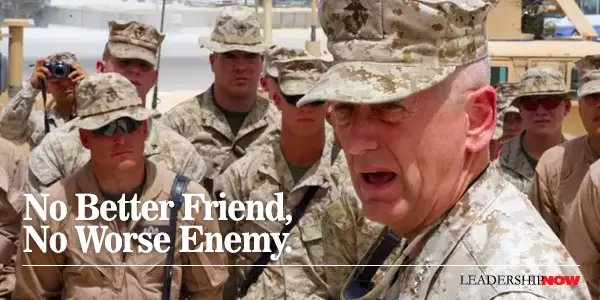
AFTER THE TERRORIST ATTACKS on September 11, 2001 and on the eve of the 2003 invasion of Iraq, Major General James Mattis needed to connect with every member of the 1st Marine Division. He writes, “I limited myself to one page they could carry with them, a message reconciling ferocity toward the foe with abiding concern for the innocents caught on the battlefield.” A letter like this serves to encourage, but it also provides what Mattis calls “commander’s intent.” Marines are aggressive, have a bias for action, and are trusted to act within the commander’s intent. In other words, they are given direction and not a lot of instructions. Here’s what we want to accomplish and why. Here’s what we don’t want to do, and why.” It provides context to the action, explicit boundaries, and the trust to act and improvise in any way necessary within those boundaries to achieve the desired result. This is easily applied to any team. This model of leadership encourages initiative and brings out individual talents, and more importantly, it demonstrates trust. It is one thing to say you trust your team. It is quite another thing to show them that you do. He signs off with a phrase he made the motto of 1st Marines: "No Better Friend, No Worse Enemy." It was adapted from a remark attributed to the Roman general Lucius Cornelius Sulla, “No friend ever served me, and no enemy ever wronged me whom I have not repaid in full.” His letter to the Blue Diamond: MARCH 2003 1st Marine Division (REIN)
For decades, Saddam Hussein has tortured, imprisoned, raped and murdered the Iraqi people; invaded neighboring countries without provocation; and threatened the world with weapons of mass destruction. The time has come to end his reign of terror. On your young shoulders rest the hopes of mankind. When I give you the word, together we will cross the Line of Departure, close with those forces that choose to fight, and destroy them. Our fight is not with the Iraqi people, nor is it with members of the Iraqi army who choose to surrender. While we will move swiftly and aggressively against those who resist, we will treat all others with decency, demonstrating chivalry and soldierly compassion for people who have endured a lifetime under Saddam's oppression. Chemical attack, treachery, and use of the innocent as human shields can be expected, as can other unethical tactics. Take it all in stride. Be the hunter, not the hunted: never allow your unit to be caught with its guard down. Use good judgement and act in best interests of our Nation. You are part of the world's most feared and trusted force. Engage your brain before you engage your weapon. Share your courage with each other as we enter the uncertain terrain north of the Line of Departure. Keep faith in your comrades on your left and right and Marine Air overhead. Fight with a happy heart and strong spirit. For the mission's sake, our country's sake, and the sake of the men who carried the Division's colors in past battles—who fought for life and never lost their nerve—carry out your mission and keep your honor clean. Demonstrate to the world there is "No Better Friend, No Worse Enemy" than a U.S. Marine. J. N. Mattis
In Call Sign Chaos, he recalls that he learned a lot from the British officers at that time. “I adapted their approach of showing no triumphalism—we had come to liberate, not dominate. We did not push our way around.”

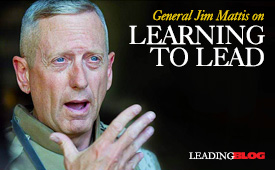 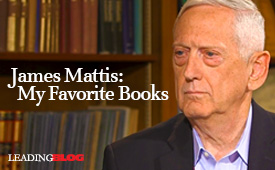
Posted by Michael McKinney at 08:12 PM
09.09.19

Learning to Lead with Ron Williams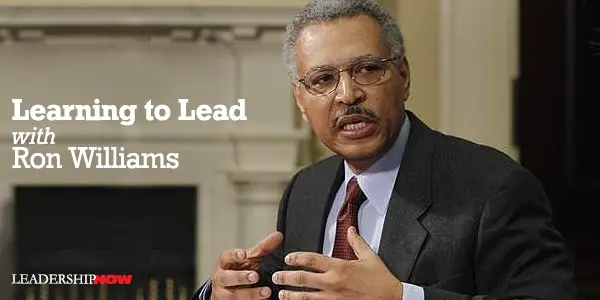
WHO IS looking out for you? “No boss or mentor drove my success—although they did open doors for me. My success came about through a combination of hard work, continual learning, fortunate career choices, and a bit of luck—by being in the right place at the right time,” writes Ron Williams. Williams is best known for his tenure as CEO and Chairman of Aetna, where he transformed a $292 million operating loss into $2 billion in annual earnings. In Learning to Lead, Williams shows how anyone can grow and succeed as leaders. He grew up in a working-class family in one of the poorest neighborhoods of Chicago in the 1960s. The book is exceptional. He weaves the experiences of his career with the lessons we can all learn from them. Well told and insightful. He begins by asserting that the single most important asset you have is you. As a result, you need to focus on getting better. “Two things are essential: a deep personal commitment to excellence in everything you do and a commitment to continual improvement.” He encourages us to strive to become 15% better each year in concrete and actionable ways. To do that you need to really think about what you are going to do differently. If you want to be extraordinary, you need to stretch yourself above the average person. Exceed your job description. Do it for you and build a reputation. “By sticking to tasks listed in your job description, you are refusing to demonstrate your ability to perform at a higher level. Why should anyone think of you as a potential leader when you’ve provided them with no evidence to suggest it?” For him, his underprivileged background represented an opportunity. “The world and its people were a puzzle for me to solve.” He reframed his world. It is our mindset that often makes it impossible to escape the box we find ourselves in. “Reframing is about creating a new mental landscape with a larger scope of freedom, a greater degree of flexibility, and a set of alternative ways of approaching any problem—which can often lead to new and unexpected solutions.” You know you need to reframe when what you hear around you is, “Everybody knows” and “It’s obvious that.” “It’s a sign that you and your colleagues may be trapped in a box of your own making—one in desperate need of reframing.” On the topic of mentors, Williams believes that they are helpful, but you shouldn’t spend your time looking for one. “Mentors come along without planning. Mentorship must arise naturally out of the situation rather than being forced.” However, and his is key, “that doesn’t mean you can’t make a conscious effort to learn from the people around you. As you work on learning to lead yourself, you should also seek out others whose examples, experiences, and insights can be of value to you.” When people do (or seem to) get in your way, rather than finding blame, assume positive intent. You can choose how you respond to negative events. We don’t need to take it personally. “If there’s something that will make you feel really good to say—something you are itching to say—don’t say it. Blowing up in the face of provocation is a way of losing power, not of claiming it.” Assuming positive intent has been one of William’s secret weapons throughout his career. It is an “empowering strategy that disarms defensiveness and turns potential enemies into allies.” When leading others and you are faced with opposition to a project or deadline, Williams says that the leader’s job is to ask a lot of pointed questions. “When people protested that a particular deadline I suggested was ‘impossible,’ I would ask, ‘Can you help me understand how you determined that?’ or ‘What are the factors that led you to conclude it’s impossible?’ I avoided starting my questions with the word why, having long ago discovered that ‘why’ questions tend to make people feel defensive—and respond accordingly. By contrast, the more oblique wordings I used directed attention away from the blame game and exactly where I wanted it—toward uncovering the root causes behind their objections.” A leader also needs to ask questions that lead people to think about the problems they face in a new way; to overcome their mental barriers—“those unquestioned assumptions, unexplored options, or unchallenged rules of thumb that keep people stuck at a low level of achievement.” These mental barriers cause us to reinforce them with information that supports them and ignore the evidence that should alert and enlighten us. We hurt ourselves and our organizations when we act on our untruths. Williams includes a chapter on managing up and down and presents his Two-Up/Two-Down System. “Paying close attention to the ideas, information, and concerns of the people around you—especially those operating from a different perspective or from a different location in the organizational hierarchy—is key to leadership success. Learning to correctly grasp what I call strategic intent of those in important positions above you and below you in the organizational hierarchy is a vital leadership practice, one that you should try to make into a daily habit.” Williams provides lessons in communication, creating a positive culture, defining reality, and many more. Putting in practice what he presents here does not require extraordinary gifts. “Your own abilities can suffice to make you an effective leader—provided you focus on the daily challenges around you and then work doggedly, thoughtfully, and positively with the people around you to overcome them.” There is a lot of emotional intelligence contained in this book. Reading it is a good way to develop your own EQ and check your self-awareness. Use Learning to Lead to prepare yourself answer the call to lead when it comes. 
Posted by Michael McKinney at 12:10 PM
02.18.19

Lessons from Washington & Lincoln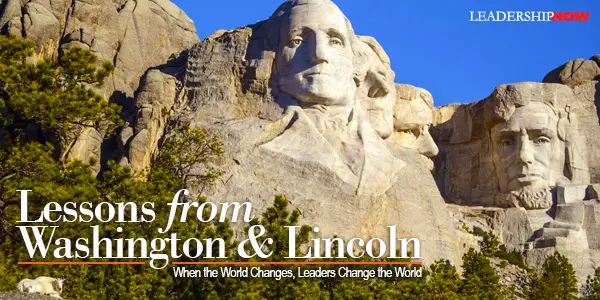
PRESIDENTS DAY was created in 1968 when George Washington’s birthday (February 22) was moved to the third Monday of February as part of the Uniform Holidays Bill. Today it is thought of as a day to remember all U.S. presidents but with a focus on the lives of Washington and Lincoln who was also born in February (12th). Both of these leaders possessed a great deal of self-awareness. Washington’s success, in part, came from knowing his weaknesses and controlling them. Lincoln listened. Lincoln took the time to cultivate personal relationships with his subordinates so he could learn from them. Lincoln accepted criticism, but always, he kept a good sense of humor. He chose not to brood over any criticism. No one is a born leader. Their leadership development began early in life—as it should. Great leaders are revealed in extraordinary circumstances, but they are made long before. By age sixteen, Washington had copied out by hand, 110 Rules of Civility & Decent Behavior in Company and Conversation. These rules proclaim our respect for others and in turn, give us the gift of self-respect and heightened self-esteem. These leaders knew who they were and their times. And they lead. Their lives are an example for each of us, and if we are wise, we can use them to inform our own leadership in any context. When the world changes, leaders change the world. Explore the links below to learn more.
Posted by Michael McKinney at 04:57 PM
02.17.19

Thomas Jefferson's Ten Rules to Live By
THOMAS JEFFERSON was skilled in many fields. In December 1962, John F. Kennedy entertained a group of Nobel prize winners in the White House and welcomed them as the most distinguished gathering of intellects to dine in the Executive Mansion “with the possible exception of when Mr. Jefferson dined here alone.” Jefferson cared for people and always offered advice when asked. A year before his death, he was asked by a father to give some counsel to his young son, Thomas Jefferson Smith. He responded with a letter that began: Monticello Feb. 21. 1825. The letter concluded with ten rules to live by Jefferson titled A Decalogue of Canons for observation in practical life:
The complete letter can be found on the National Archives website.
Posted by Michael McKinney at 04:40 PM
02.03.19

Super Bowl Edition: Julius Peppers Retires from the NFL 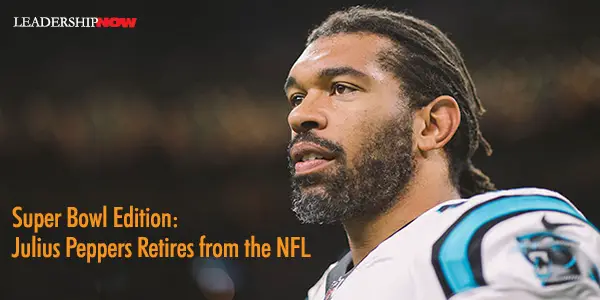
Dignity and class. On and off the field, Julius Peppers was a leader. New England Patriots quarterback Tom Brady said, “Julius has had an incredible impact in the NFL from the day that he came in. What an amazing player over the course of a long period of time. Just incredible physical, mental toughness. What an incredible career.” New England Patriots tight end Rob Gronkowski recalls, “I remember my first time lining up versus him, and I looked up and I was like 'This dude's a freak! His arms are like five times bigger than mine! He's a great player, and it was just an honor to be able to compete versus him.” Los Angeles Rams defensive tackle Aaron Donald remembers, “He's one of the best to ever do it. Made a lot of plays. I remember as a kid watching him play. Just a whole lot of respect for him. I remember being at a Pro Bowl, got an opportunity to talk to him and try to, like, feed off of him, ask him questions. One heck of a football player.” His accomplishments on the field are impressive but off the field, he demonstrated leadership, community, and empathy. In February 2009, Peppers donated $500,000 to a scholarship program that supports black students at his alma mater the University of North Carolina at Chapel Hill. After Hurricane Florence, the North Carolina native started the Julius Peppers Hurricane Florence relief fund by donating $100,000 and encouraged his teammates and other NFL players to join in. Actively involved in the recovery efforts, he told the Charlotte Observer, “I think a big part of the solution to these problems, and a big part of the help is the volunteers. People actually getting out there on the ground, putting in the work, going around helping other people and showing compassion for your neighbors. That really left an impression on me. ...People need to know that we’re all a big community and we all need help from time to time.” Julius Peppers announced his retirement Friday, February 1 after seventeen years in the NFL. He left us this video: “Thank you.
And thank you, Julius, for showing us the mind of a leader.
Posted by Michael McKinney at 09:02 AM
12.03.18

George H.W. Bush 1924-2018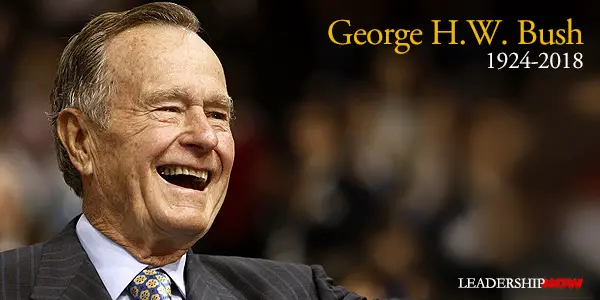
G As a leader produced by the greatest generation—a term coined by Tom Brokaw to mean those who lived during the Great Depression and then went on to fight in World War II—Bush lead with moral authority. A grounded and humble man, he understood that character matters in leaders. In 2012, he told Diane Sawyer in an interview that “I've been very blessed, when you look around, compared to ... others. But you must feel responsibility to others. You must believe in serving others. I think that's a fundamental tenet of my life.” Bush lead in various capacities. Serving in World War II, he became the youngest combat aviation officer in the war flying Bush flew 58 combat missions in the Pacific. Shot down in 1944, he was awarded the Distinguish Flying Cross for his bravery in action. Shortly after leaving the Navy, Bush married Barbara Pierce. They had six children, one of whom died of leukemia before she turned four. His oldest son George Walker Bush was elected the 43rd President of the United States in 2001 becoming the second president to assume the nation's highest office after his father, following the footsteps of John Adams and his son, John Quincy Adams. Bush later said, “I don't know what would happen, I don't know where I'd be in life if I wasn't blessed with a lot of kids and grandkids and family, including, of course, Barbara. Family means everything to me. And we're blessed a with lot of 'em.... We take great pride in what they do and what their plans are for the future. And through—through their eyes, I think of life a lot.” He led in various capacities in his life as an oil company executive, CIA director, an ambassador to the United Nations and liaison to the People's Republic of China, and a congressman representing Texas. Most notably, he served two terms as vice-president under Ronald Reagan before becoming the forty-first president of the United States. (The first incumbent vice president to do so since Martin Van Buren in 1836.) Here is a selection of his thoughts that reflect his view and approach to life and leading: America is never wholly herself unless she is engaged in high moral principle. We as a people have such a purpose today. It is to make kinder the face of the nation and gentler the face of the world. His last words were to his son George W. Bush: “I love you, too.” Of Related Interest: 
Posted by Michael McKinney at 09:44 AM
10.28.18

15 Fascinating Facts About Theodore Roosevelt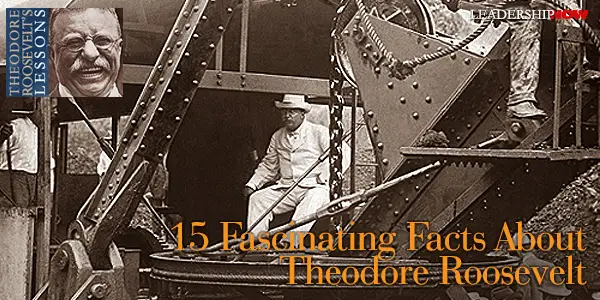
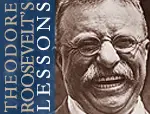  2. He was the first president to leave the country while president. A part of Roosevelt's foreign policy initiatives, he established the Panama Canal project. The project had suffered many setbacks, but by 1906, it was in full swing. In November of that year, Roosevelt embarked on a 17-day trip to Panama (and Puerto Rico) becoming the first president to travel outside the U.S. while holding office. The trip was a morale booster, and the press loved it. 3. He wasn't sworn in using a Bible. When Roosevelt took the oath of office on September 14, 1901, following the assassination of William McKinley, he did not swear an oath on the Bible. The event took place in the library of his friend Ansley Wilcox’s house in Buffalo, New York. Whatever the reason, by the time Roosevelt arrived at her house the country had been without a president for about 12 hours and everyone was anxious that the inauguration take place as quickly as possible. 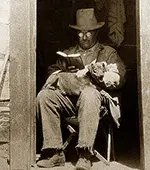 5. Roosevelt was a prolific writer. He was our most literary president. A voracious reader with an excellent memory, Roosevelt wrote 35 books and about 150,000 letters in his lifetime. He wrote on wide-ranging topics. His first book, The Naval War of 1812, was published in 1882. Some of his more popular titles were: The Rough Riders (1899), The Strenuous Life (1900), African Game Trails (1910), The New Nationalism (1910), An Autobiography (1913), Through the Brazilian Wilderness (1914), The Great Adventure (1918), and Letters to His Children (1919). For much of his life, he relied on income from his books to support himself. 6. Theodore Roosevelt had a photographic memory. He was known to recall not just articles, but entire newspaper pages long after he first read them. This remarkable memory also extended to names and conversations. This ability served him well as a leader. 7. He was and still is the youngest president in history. In 1901, vice-president Roosevelt was sworn in immediately following the assassination of President William McKinley, as the nation's twenty-sixth President. At the age of 42, he was the youngest president in the country’s history. John F. Kennedy was 43 when he became president. 8. At age 6, he witnessed the Abraham Lincoln funeral procession. On April 25, 1865, a funeral procession passed the home of TR’s grandfather in New York. The young TR and his brother watched from an open second-floor window as the procession went up Broadway in front of the house. 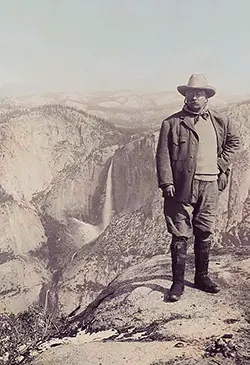 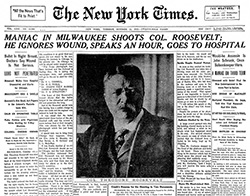 11. Roosevelt was the first President to win a Nobel Peace Prize. He was the first statesman to be awarded the Peace Prize. As President, he expanded America’s foreign policy and negotiated peace in the Russo-Japanese war in 1904-05. He is the only president ever called upon to negotiate a foreign war. The Nobel Prize organization reports that it is also the “first time the award was controversial. The Norwegian Left argued that Roosevelt was a ‘military mad’ imperialist who completed the American conquest of the Philippines. Swedish newspapers wrote that Alfred Nobel was turning in his grave and that Norway awarded the Peace Prize to Roosevelt in order to win powerful friends after the dramatic dissolution of the union with Sweden the previous year.” 12. Roosevelt became blind in one eye after a boxing injury while in the White House. A practice he started while the governor of New York, Roosevelt invited He enjoyed boxing with young military aides. In 1908, at age 50, his opponent landed a punch to his left eye that caused severe hemorrhaging, resulting in a detached retina. The incident was kept a secret though to protect the identity of the sparring partner. In his Autobiography he wrote, “Fortunately it was my left eye, but the sight has been dim ever since, and if it had been the right eye I should have been entirely unable to shoot.” 13. Theodore and Franklin Roosevelt were fifth cousins. But Franklin Roosevelt's wife Eleanor was more closely related. She was his niece. TR presented the bride at their wedding on March 17, 1905. As president, TR got much of the attention and press. 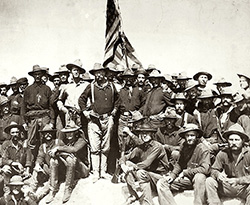 15. Roosevelt's mother and first wife died within 11 hours of each other. On February 14, 1884, his first wife of four years, Alice Lee, 22, died of Bright’s disease, a severe kidney ailment after giving birth to their daughter Alice. His mother Mittie died at age 49 of typhoid fever. In his diary he wrote, “The light has gone out of my life.” 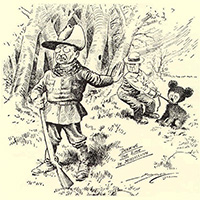
Posted by Michael McKinney at 05:20 AM

Books About Theodore Roosevelt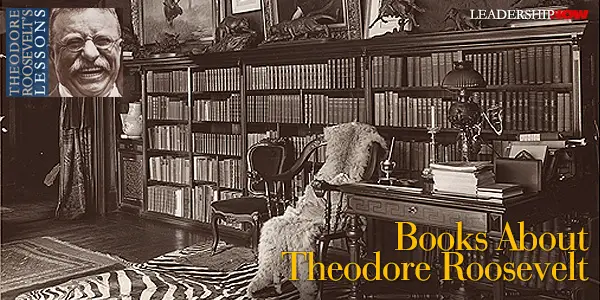
ON THE OCCASION of the anniversary of Theodore Roosevelt's birth on October 27, 1858, we have assembled a list of some of the better books about him:   
Posted by Michael McKinney at 05:20 AM
10.27.18

Theodore Roosevelt Was Born 160 Years Ago Today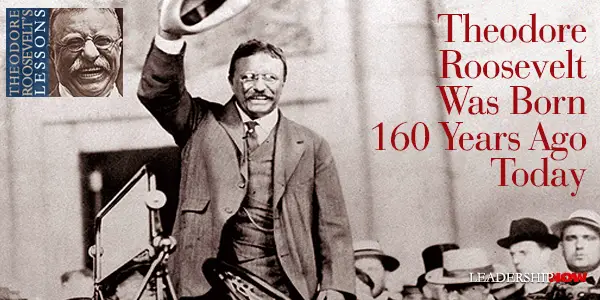
 When he was 6-years-old, he watched Abraham Lincoln’s funeral procession pass by his grandfather’s mansion. As a young boy, his family traveled to Europe and the Middle East. At eighteen he entered Harvard University. He was by this time an energetic, athletic, and knowledgeable. In June 1880 he graduated magna cum lude and ranked 21 out of a class of 177. Later that year he marries Alice Hathaway Lee only to lose her in childbirth three years later. His mother died the same day. He said, “The light has gone out of my life.” Devastated, he headed to the Dakota Territory and became a rancher. He wrote, “I have always said I would not have been President had it not been for my experience in North Dakota.” At 23, he dropped out of law school to become a politician. He was elected to the New York State Assembly. In 1886 he married his second wife, Edith Kermit Carow. He was a civil service commissioner in Washington and then the police commissioner in New York City before becoming the Assistant Secretary of the Navy in 1895. When war broke out between the United States and Spain he resigned to be the lieutenant colonel in the Rough Riders. The courage he demonstrated made him a war hero. Upon his return, his popularity made him a shoo-in for the governor of New York. In 1900 he became vice president under William McKinley. In 1901 after McKinley was assassinated, he became at age 42 the youngest president in U.S. history. In 1906 he won the Nobel Peace Prize. The first American to do so. His presidency ended in 1909. Roosevelt died in his sleep from a heart attack on January 6, 1919, in Oyster Bay, New York that cut short his plans to return to the presidency. His son wrote, “The old lion is dead.” When Roosevelt was born James Buchanan was president. Two years later Abraham Lincoln would take office. There were 32 states in the Union. A Union that was to be ripped apart three years later in 1861 as the first shots were fired at Fort Sumter. Roosevelt friend and conservationist Gifford Pinchot said in a February 1919 memorial speech: We who loved Roosevelt have not lost him. The qualities we treasured in him, his loyalty, his genial kindness, his unwearied thoughtfulness for others, the generosity which made him prefer his friends in honor to himself, his tenderness with children, his quick delight in living, and the firm soundness of his life's foundations, are potent with us yet. Of Related Interest:
Posted by Michael McKinney at 07:36 AM
10.26.18

Theodore Roosevelt on Leadership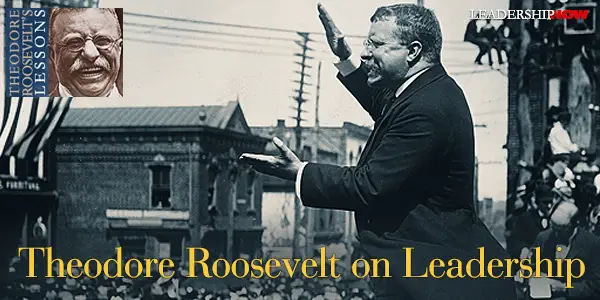
 Learning from the Past
Work While You Work—Play While You Play
Walk Your Talk
Character
Take Action
Virtue
Success
Face Your Fears
Work Hard
What Matters
Further Reading:
Posted by Michael McKinney at 10:28 AM
10.08.18

Leadership in Turbulent Times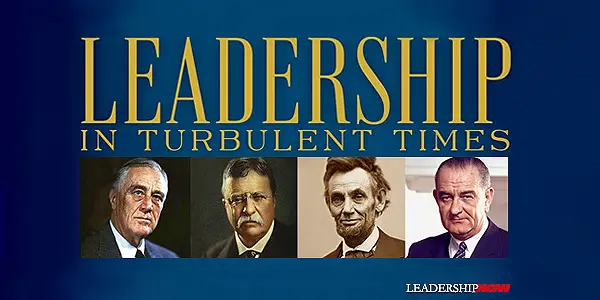
D In this well-structured study, she begins by looking at the lives of each leader in turn, when they first entered public life. Unremarkable at this stage of their life they, like most young leaders, made mistakes stemming from inexperience, cockiness, lack of caution, outright misjudgments, and selfishness.” But more importantly we “see the efforts made to acknowledge, conceal, or overcome these mistakes.” This, of course, is a key to their eventual success. For all of the differences in personality, temperament, and background, that separated them they were united “by a fierce ambition, an inordinate drive to succeed. With perseverance and hard work, they all essentially made themselves leaders by enhancing and developing the qualities they were given.” By the time these men were 30 they had developed the stuff of leadership. In Part Two, these leader’s lives again align when forced to deal with tragedy and setbacks that threatened their identity and end their prospects. Their adversities, though unique to each, cast doubt on who they were. “Abraham Lincoln suffered a blow to his public reputation and his private sense of honor that led to a near-suicidal depression; Theodore Roosevelt lost his young wife and his mother on the same day; Franklin Roosevelt was struck by polio and left permanently paralyzed from the waist down; Lyndon Johnson lost an election to the United States Senate.” These events became crucibles in their lives that deepened and redefined their leadership approaches. Abigail Adams wrote her son, John Quincy Adams, “It is not in the still calm of life, or the repose of a pacific station, that great characters are formed. The habits of a vigorous mind are formed in contending with difficulties. Great necessities call out great virtues.” How they responded to their reversals provides lessons for us all. They allowed these experiences to shape and mature them into leaders that would make a mark on their times. It is the lessons that each learned that they took to the White House. In Part Three we see how each dealt with the turbulent issues of their day. One might observe too that although we see our times as the worst of times because we are so close it, many periods of our own history had far more in the balance. Goodwin looks at how each leader applied their unique leadership composition to the crisis of the day. Lincoln’s decision to issue the Emancipation Proclamation did not come easily. His transformational and his transactional leadership made it possible. He combined the two. “For Lincoln, pragmatic, transactional strategies provided the nuts and bolts of principled, transformational leadership.” Theodore Roosevelt came into office after the assassination of President William McKinley. Shortly thereafter, he faced a national crisis—The Great Coal Strike of 1902. As the fall approached the six-month-old strike was not any closer to resolution and a widespread panic set in. There was no precedent or legal course of action that allowed presidential intervention. But he did. How he brought the parties together and eventually found a solution provides a blueprint for crisis management. The Great Depression was in full swing and unemployment had reached 25 percent when Franklin Roosevelt came into office. Indeed, he thought that “the whole house of cards” might collapse before he had a chance to be sworn in. But “the steps Roosevelt took during the next hundred days to stem the immediate banking crisis set in motion a turnaround that would forever alter the relationship between the government and the people.” It’s an engaging case study in turnaround leadership. Next, Goodwin turns to the visionary leadership of Lyndon Johnson. Assuming he presidency after the assassination of John Kennedy, he quickly assured the public and showed deference to Kennedy’s inner circle. “Checking his storied arrogance, softening his tone, he conveyed a deep humility, sharing his doubts, continuously requesting patience, advice, and assistance.” Johnson had a vision for a Great Society that he was able to actualize by making a dramatic start, leading with his strengths, simplifying the agenda, establishing an effective order of battle, honoring commitments, continual drive, and by mastering the narrative. While each was different, what serves each of these leaders is their understanding of human nature. Lincoln brought a team of rivals together because of his “empathy, humility, consistency, self-awareness, self-discipline, and generosity of spirit.” As was expressed by Theodore Roosevelt in his autobiography, Leaders “need more than anything else to know human nature, to know the needs of the human soul.” Goodwin writes, “At the core of Johnson’s success in the Senate was his celebrated ability to read character, to gauge the desires, needs, hopes, and ambitions of every individual with whom he interacted.” All four of these leaders hoped that they had made a difference. Goodwin turns to their legacy in Part Four. Unfortunately, Lincoln and FDR would die in office. TR and LBJ would have to deal with the “aftermath of leadership.” TR to his dying day wish to run for president. Living four years beyond his presidency, LBJ knew, “with a consuming sadness, that his days of active leadership had come to an end.” The lessons contained in these lives should guide us now in our own turbulent times. Of Related Interest:

Posted by Michael McKinney at 03:56 PM
06.12.18

My Father’s Business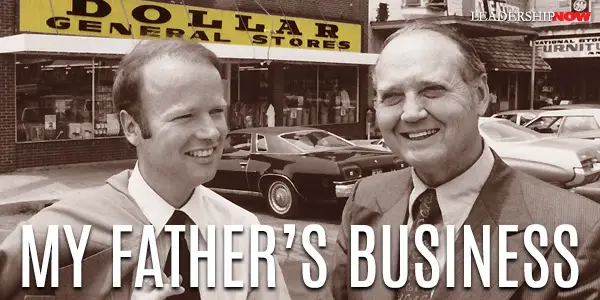
T In My Father’s Business: The Small-Town Values That Built Dollar General into a Billion-Dollar Company, Cal Turner, Jr. shares the ups and downs of running a family business for just over 37 years, and along with it some good down-to-earth common sense. Cal Jr, learned from his grandfather the value of listening. Because of a freak wrestling accident, his grandfather lost his Dad at age 11 and had to leave school to run the family farm. Finishing school with only a third-grade education might hold some people back, but not Luther Turner. He saw it as a plus. “He was convinced that everyone he met was smarter than he, and that he needed to learn something from each of them. He became a first-rate observer, a great listener, and a dedicated student to life. What he practiced was more than empathy. It involved valuing the other person and his or her information, insight, and perspective.” 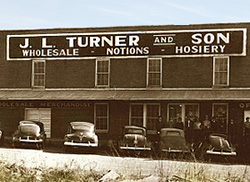 His mother had a huge influence on him. She valued principles. She believed that “if you have a commitment to moral integrity, you don’t need a bunch of picky rules. They aren’t necessary; in fact, they become just so much baggage.” She also taught him to separate the problem from the person. She told him, “Son, for a good boy, you get into a lot of trouble.” Cal Jr. learned to focus on the solution and the lesson. When you separate the problem from the person, everybody can come together to learn from the solution. If we focus on labels and affixing blame, we are not going to be good at solving problems. His Dad also provided much-needed support. He would compliment him in front of others. Cal Jr. finds that “so much of success and failure lies in what we take away from our primary relationships.” A family grounded in love can survive almost anything. A solid value-based upbringing makes it easier to focus on others. “Leadership exists when an organization overcomes having a boss or a boss mentality. A boss only gets results; a leader gets development.… A true leader vests the authority in the organization.” The company was built with no strategic plan. When Cal Jr. introduced it he thought he might get resistance from Cal Sr. But Cal Sr. knew it was time to make changes, but responded with, “I hope you won’t create plan planners but will have plan doers.” Thinking strategically allowed them to reexamine the way they had always done things and take a good look and individual strengths and weaknesses. A better leader emerges when a person owns his or her own weakness and reaches out to make a connection with other people to help fill in the gaps. He has said that the doors of the executive suite tend to keep everybody out, but strategic planning opens the doors to bring everybody in. Running the business becomes a company-wide proposition. On teamwork, Cal Jr. says, “Collaboration, then, is the process of raising individual selfishness to group cooperation and accomplishment, which can spur the group—or the organization, the nation, or the planet—to greater success.” What they created was a values-based dynamic in the organization. “The least control for the most development of our niche.” Those values included: “We believe that productivity is attained by emphasizing strengths in a positive environment, not by dwelling on weaknesses in an environment of guilt and blame.” A secret to their success he refers to as “selective unscrewing.” “Our past has always been screwed up, and every year, we just selectively unscrew a bit.” Continual improvement. The concept of “unscrewing” has to do with change, and change is something most of us resist. It may be simple fear of the unknown, for we cling to the security of a predictable structure or pattern, although it’s worth remembering that people also get bored with the predictable. A forgotten value his Dad believed in, is the idea that “your dress reflects the respect you are showing the other person.” The title of the book—My Father’s Business—is a bit of a double entendre. While Cal Jr. spent a lifetime tending to his Dad’s business, he also believed it was his calling. At one time he wanted to go into the ministry. A preacher convinced him otherwise. He told him not to do it. “Find anything else you can do and do that, because only if there’s nothing else you can do are you truly called to be a preacher of the gospel of Jesus Christ. There are far too many preachers who were never called in the first place.” But then it came to him from a few lessons learned working with customers what God wanted him to do. “I could have much more effect on the lives of our customers day in and day out in our stores than I ever could as a preacher conducting three services a week.” He discovered His Father’s business in his life—a principle that guided him throughout the rest of his life. 
Posted by Michael McKinney at 11:35 PM
04.17.18

Barbara Bush 1925-2018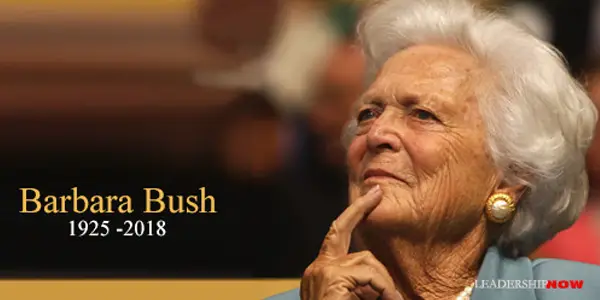
F Born Barbara Pierce on June 8, 1925, in Rye, New York, she was the daughter of a publishing executive and distant cousin of President Franklin Pierce. She has been called the “Matriarch of a Dynasty.” As the wife of the 41st president and the mother of the 43rd, George W. Bush, she was one of two women in American history to have a son of hers follow his father to the White House. The first was Abigail Adams, wife of John Adams and mother of John Quincy Adams. The Bushes had celebrated their 73rd wedding anniversary in January, making them the longest-married couple in presidential history. She was a valuable ally in her husband’s political career. Her son George W. Bush wrote in 41: A Portrait of My Father, “One thing was for sure, Barbara Bush was willing to speak her mind.” During her husband’s 1992 reelection campaign she told the Los Angeles Times, “Some people share in their husband’s work and some don’t. That’s going to depend upon the marriage or their wife’s work. But you have to have influence. When you’ve been married 47 years, if you don’t have any influence, then I really think you’re in deep trouble.” She worked relentlessly for family literacy. “You know sit with your arm around a little kid and read. It not only teaches them to read but it keeps the family strong.” She believed, “Everything I worry about would be better if more people could read, write and comprehend.” Here is a selection of her thoughts on life: “I think togetherness is a very important ingredient to family life.” “Never lose sight of the fact that the most important yardstick of your success will be how you treat other people - your family, friends, and coworkers, and even strangers you meet along the way.” “Your success as a family... our success as a nation... depends not on what happens inside the White House, but on what happens inside your house.” "George Bush has given me the world. He is the best -- thoughtful and loving." “If human beings are perceived as potentials rather than problems, as possessing strengths instead of weaknesses, as unlimited rather that dull and unresponsive, then they thrive and grow to their capabilities.” “You may think the president is all powerful, but he is not. He needs a lot of guidance from the Lord.” She told those gathered at Wellesley College for her June 1990 commencement address: I hope that many of you will consider making three very special choices. She concluded her 1994 memoir with: George Bush and I have been the two luckiest people in the world, and when all the dust is settled and all the crowds are gone, the things that matter are faith, family, and friends. We have been inordinately blessed, and we know that.
Posted by Michael McKinney at 08:41 PM
02.19.18

The Little Kindnesses Matter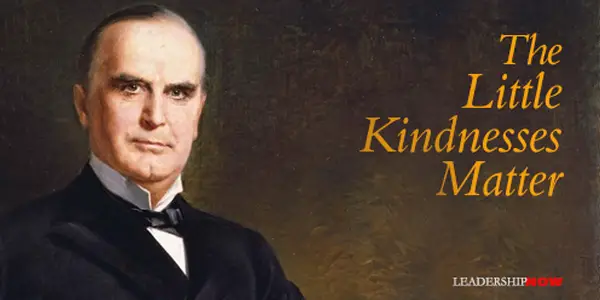
P He was considering the appointment of a minister to a foreign country. There were two candidates. The President outlined their qualifications, which seemed almost identical. Both were able, experienced, honest, and competent. Each was equally entitled to preference from a political standpoint. Then he told this little story, an incident apparently so unimportant that, except for its consequences, it never would have been told, an incident so trivial that the ordinary man would have forgotten it. But McKinley was not an ordinary man.Dawes relates this lesson: We never know what determines one's career in life. Indeed, it may be these little-forgotten deeds, accumulated, are the more important factors; for it is they which must, in many cases, provide us with the opportunity to do the greater deeds, and we unconscious of it. Why comes this reward in life? Why that disappointment or failure? We cannot know with certainty. This we can know, however, and this story illustrates it: There is no act of kindliness, however small, which may not help us in life; and there is no act of unkindness, however trivial, which may not hurt us. More than that: The habitual doing of kindness always adds to our happiness, for kindness done is duty performed. Unkindness always breeds an unhappy spirit, for unkindness is duty neglected.Malcolm Forbes once said, “You can easily judge the character of a man by how he treats those who can do nothing for him.”
Posted by Michael McKinney at 05:01 PM
11.10.17

The Making of Theodore Roosevelt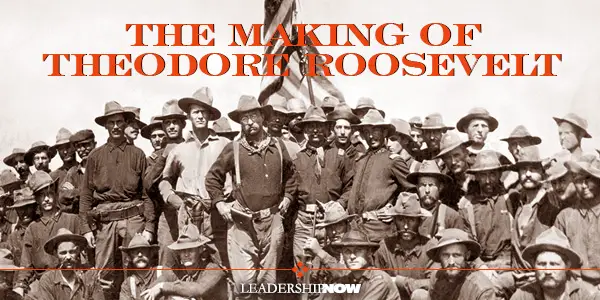
T How Roosevelt became the leader we remember is a remarkable story. His journey is skillfully told in Theodore Roosevelt and the Making of American Leadership by Jon Knokey. Using many unpublished letters and notes from Roosevelt’s contemporaries, Knokey insightfully chronicles TR’s journey to the White House. Theodore was born small and frail. He had life-threatening attacks of asthma as a child, and it consumed the family. “Though driven by good intentions, this over-protection could very well have been the root cause of Roosevelt’s overpowering sense of entitlement. The man needed to be at the center of attention for everything he undertook.” When the Civil War came, Roosevelt’s house was divided too. His father Theodore Sr. was a Lincoln Republican and his mother Mittie, was a Southerner. To keep peace in the family, Theodore Sr. limited himself to noncombatant work with the Union Army while his mother’s relatives fought heroically. Observing his relative’s deeds and his father’s principles and morality, Theodore wrote that, “I felt a great admiration for men who were fearless and who could hold their own in the world, and I had a great desire to be like them.” Knokey notes, “He embraced both contrasts seamlessly, almost naturally. And it was this ability—to embrace contradiction among diverse groups of people—that would become, over time, one of his greatest strengths as a leader.” When he was about twelve, he decided to beat his affliction through strenuous activity. His father told him, “Theodore, you have the mind, but you have not the body, and without the help of the body, the mind cannot go as far as it should. You must make your body.” And he did. Theodore was a curious man. One classmate said, “Never have I seen or read of a man with such an amazing array of interests.” The stores told here of his days at Harvard are revealing. After Harvard, Theodore headed for the New York State Assembly and tried to change the world from day one. He learned he could not and some valuable leadership lessons along the way. “Theodore needed to focus on incremental victories; instead he tried to change the entire culture overnight.” He learned, “It cannot be done by charging ahead alone, simply espousing virtues.” 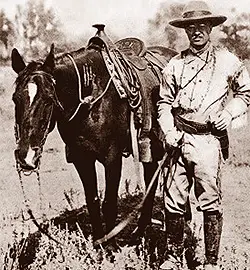 With the coming of the Spanish-American War, Theodore’s lessons begin to serve him well. “Theodore’s greatest leadership feat, and much more impressive than his charge on San Juan Heights, was that he understood where his followers were, and he led them from there.” He earned his leadership with his men by serving them. On March 4th, 1901 he became President McKinley’s Vice President. Following McKinley's assassination in September, Roosevelt became president and served two terms. Knokey concludes, Theodore “led by downplaying differences, focusing on inclusiveness—focusing on the greater good for all Americans. This made him genuine to the masses. He would fight for anyone, so long as that person worked hard, did their part, had character.” Knokey’s telling of Theodore Roosevelt’s leadership journey is an inspiring one. It is well told, and the anecdotes and accounts from TR’s contemporaries add much to the story. By the end of the book, you will feel like you know the man. A friend of TR’s recalled, “He had the virtues we like to call American, and he had the faults. He knew us, and we knew him.”

Posted by Michael McKinney at 07:29 AM
07.04.17

America Through the Eyes of the Founding Fathers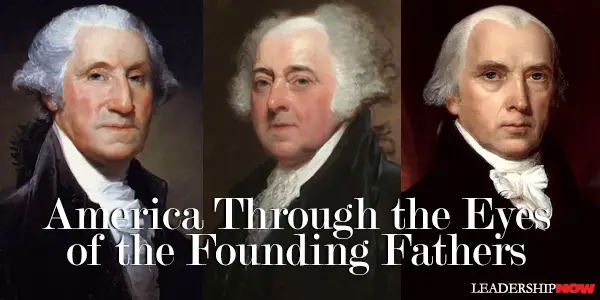
I But laws he believed, could not prevent this hypocrisy. No law, no constitution could save an immoral people. While the Founding Fathers believed in the necessary separation of Church and State, they believed no discussion of morals was possible without an agreed-upon philosophy – a philosophy that superseded the logic of men. So Adams concluded that “Our Constitution was made only for a moral and religious people.” George Washington also said as much halfway through his Farewell Address of 1796. He stated: “Of all the dispositions and habits which lead to political prosperity, Religion and morality are indispensable supports.” He added, “And let us with caution indulge the supposition that morality can be maintained without religion. Whatever may be conceded to the influence of refined education on minds of peculiar structure, reason and experience both forbid us to expect that National morality can prevail in exclusion of religious principle.” Both Adams and Washington are appealing to a morality that was eternal—beyond the customs of man. A morality that didn’t shift on convention. John Adams wrote to the Massachusetts Militia: While our country remains untainted with the principles and manners which are now producing desolation in so many parts of the world; while she continues sincere, and incapable of insidious and impious policy, we shall have the strongest reason to rejoice in the local destination assigned us by Providence. James Madison, the fourth President of the United States, believed that the governed were obliged to control itself. Furthermore, it was the responsibility of a virtuous people to select leaders that would reflect that ideal. Leaders that would be capable by virtue of their own character, to adapt these eternal morals that Adams often spoke of, to particular circumstances. Madison wrote: But I go on this great republican principle, that the people will have virtue and intelligence to select men of virtue and wisdom. Is there no virtue among us? If there be not, we are in a wretched situation. No theoretical checks--no form of government can render us secure. To suppose that any form of government will secure liberty or happiness without any virtue in the people, is a chimerical idea. If there be sufficient virtue and intelligence in the community, it will be exercised in the selection of these men. So that we do not depend on their virtue, or put confidence in our rulers, but in the people who are to choose them.
Posted by Michael McKinney at 12:47 AM
05.25.16

Robert Gates on the Essentials of Leading Change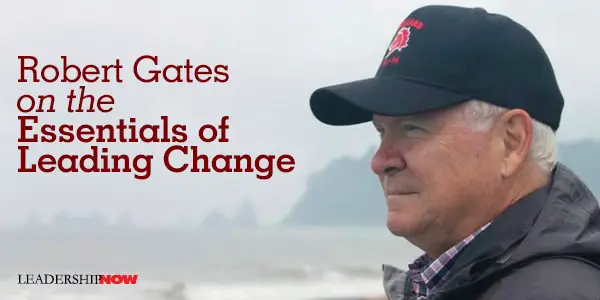
IN A TIME when change is not just inevitable, but must be encouraged and led, Robert Gates’ A Passion for Leadership is a must-read. Gates has led and continues to lead in a wide variety of organizations and organizational cultures. His collected wisdom serves to inspire us to lead others where they don’t often want to go and improve people’s lives. In addition to serving on numerous corporate boards, he has served as a United States secretary of defense, a director of the CIA, served eight presidents, served as president of Texas A&M University, and is currently the chancellor of the College of William and Mary and president of the Boy Scouts of America. The one feature of the institutions with strong cultures he has led has been a strong sense of family. He describes it as a “commitment to taking care of one another at all times but especially in adversity or times of need.” All great cultures do have this sense of family. At the same time, it is easy then to become insular and tolerate long-standing but inappropriate practices and behaviors because they are a tradition. It is important to define what traditions must be defended and those that must be changed to enable future success. “A good leader,” writes Gates, “must keep coming up with new perspectives, new ideas, new improvements. Only a committed leader can keep an organization—a bureaucracy—on its toes, continuously adapting, innovating, improving.” Gates recognizes that we need leaders at all levels in an organization that are able to mobilize the willing and bring about productive change. More often than not those leaders are there, they just need to be liberated by the person at the top in an organizational culture of leadership. Not surprisingly, he identifies listening as the most critical thing a new leader can do. “Never miss a good chance to shut up.” CIA director Bill Casey gave him some good advice early on. “Bill advised me not to focus on what I disagreed with but to see if there were one or two kernels of information or wisdom worth seizing on—finding a little wheat amid all the chaff. Just because 95 percent of what someone says is nuts, he would say, laughing, doesn’t mean you should ignore the 5 percent that might be useful. (He was always handing me pamphlets or books to read, warning, ‘This guy is crazy, but there’s an interesting idea on page x.’)” To be an effective leader, one must demonstrate from the start an understanding of and respect for the role and views of the career employees in an organization and be clear that the new boss intends to make them participants and partners in reforming the place. This is the best possible preparation of the bureaucratic battlefield. And that doesn’t mean just rearranging the organizational chart. “The main target is how people do their work, not where.” Gates offers from experience, strategies, techniques, and principles for implementing change. He includes many examples from the organizations he has served. Leading change is hard work and can’t be done from on-high. Gates cautions that while micro-knowledge is necessary, micromanagement is not. “For a leader to get the big things right depends a great deal on knowing the little things, especially when implementing difficult and controversial change. Without micro-knowledge, you are the prisoner of your bureaucracy and your staff, and they will play you like a cheap fiddle.” Fundamentally, leadership is always about people. I’ll leave you with a few thoughts from Gates on leading: ☙ You can be the toughest, most demanding leader on the planet and still treat people with respect and dignity. ☙ A self-confident leader doesn’t cast such a large shadow that no one else can grow. ☙ Leaders who think they don’t need frank, critical advice every day are usually doomed. ☙ To change bureaucracies effectively, a leader must first make his people proud and eager to excel. ☙ Formal education can make someone a good manager, but it cannot make a leader, because leadership is more about the heart than the head. ☙ Core to leadership is the ability to relate to people—to empathize, understand, inspire, and motivate. ☙ If you fundamentally don’t like or respect most people, or if you think you are superior to others, chances are you won’t be much of a leader. 
Posted by Michael McKinney at 06:56 PM
04.12.16

Booknotes: Bob Benmosche - Good For the Money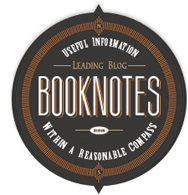 ☙ Bob Benmosche came out of retirement in August 2009 to lead American International Group’s turnaround. Although few doubted it was even possible, under his leadership, AIG repaid the $182.3 billion taxpayer bailout, with the government claiming a profit of more than $20 billion.
☙ Bob Benmosche came out of retirement in August 2009 to lead American International Group’s turnaround. Although few doubted it was even possible, under his leadership, AIG repaid the $182.3 billion taxpayer bailout, with the government claiming a profit of more than $20 billion.
☙ His my-way-or-the-highway style worked well in this turnaround/crisis situation. He was just what AIG needed. A colorful and outspoken leader, his memoirs are full of colorful stories. Throughout his career he dedicated a great deal of time to leadership development throughout the organizations he led. Benmosche died of lung cancer on February 27, 2015 six months after he left AIG. Here are some quotes from his memoir, Good For the Money: My Fight to Pay Back America: ☙ Within any organization, leadership is indeed a shared responsibility. That idea must become part of the entire operation’s DNA. People must feel they have the freedom to do all kinds of things, including making mistakes, or they will never succeed. ☙ If it ain’t broke, break it and make it better. ☙ Play the hand that’s dealt you. If there’s a less-than-perfect opportunity, but it’s the only one on the horizon, you grab it and make the best of it you can. ☙ If you have no choking chain of debt around your neck, you don’t have to be obligated to do things that don’t make sense. If you do not have that financial freedom, you find yourself trapped in life. ☙ Could the nation’s crisis been handled differently? But we needed to do something. But instead of just acting, and moving forward and fixing, we started to play the blame game. That’s where we failed. We failed by saying we’re going to create laws, we’re going to put people in jail, there should be a law against people who make bad judgments. If that happened the entire country would be in jail because all of us made mistakes in our lives. That’s the issue I have. It’s not with the actions the nation took; it was the blaming and the viciousness that went on after the actions were taken. ☙ I needed employees to stay with proper compensation. The expertise of those who understood the deals was crucial to undoing the damage. ☙ I understood the public’s anger. But there is a difference between appreciating the outrage and becoming captive of it. There was no way we were going to save this company if I dwelled on it. My responsibility was to rebuild, not atone. Bad business practices got us into the mess, but the country had to be reassured that good practices could get us out of it again. ☙ These bonuses are not rewards at all; they’re part of one’s normal compensation. ☙ Being yourself is never a mistake. Even if what you do is sometimes taken the wrong way. ☙ When you talk to people about what you’re doing, just tell them the truth. Don’t sugarcoat it. Tell it like it is. And if you manage to do what you’re saying you’re going to do, if you can pull that part off, it will pay off for you over and over. ☙ Sometimes, the most obvious observations simply need to be verbalized. 
Posted by Michael McKinney at 06:53 PM
02.16.16

The Superboss Playbook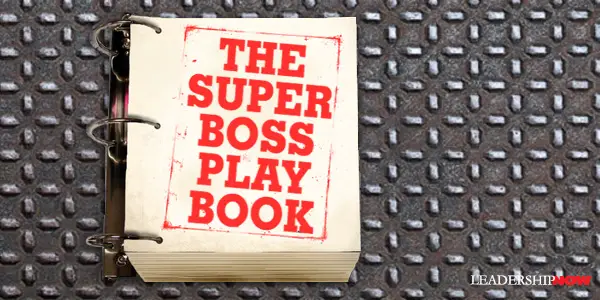
IMAGINE A WORLD a world where the person who you call your boss changed your life by helping you accomplish more than you ever thought possible. In every industry there is a leader that stands out. A Superboss. What is their secret?In Superbosses, Sydney Finkelstein discovered that although they may differ in leadership styles, they share a playbook that leads to extraordinary success founded on making other people successful. Superbosses can be fierce or gentle, belligerent or self-depreciating, but whatever their style, they do a much better job inspiring and teaching because they get in their trenches with protégés, leading by example and giving them personalized attention they require to move up quickly. Here then is the outline of The Superboss Playbook – Techniques, Mind-Sets, Philosophies, and Secrets of the World’s Best Bosses: Superbosses recruit people who “get it.” Superbosses are uncompromisingly open. Superbosses embrace the apprenticeship model. Superbosses are traders in opportunities. Superbosses fashion teams that function as a “band of brothers.” Superbosses create a strategic alumni network. We need new approaches to nurturing people and the Superboss Playbook presented by Finklestein, is completely learnable by any leader who is fearless, competitive, imaginative, credible, and authentic. Superbosses is a fascinating look at the leaders that flourish and often change their industries by developing a future generation of leaders. If you are not working for one, this book will help you to become one. The Three Types of Superbosses Glorious Bastards: These superbosses care about one thing: winning. They’re the ultimate hard drivers, yet they realize that to get the very best results, they need to develop the world’s best people and teams. So they do.
Nurturers: These coaches and teachers resemble traditional mentors the most. They take pride in bringing others along and care deeply about the success of their protégés. They help people accomplish more than they ever thought possible.
Iconoclasts: These executives usually operate in creative fields, where their single-minded passion for their work inspires their protégés.
Available too, is The Superbosses Playbook: A Workbook Companion to Superbosses. It shows readers how to apply the tactics of these "superbosses" in their own organizations. It features assessments, case studies, and exercises designed to help anyone recruit talent, lead performance, inspire teams, and even part with great people like a true superboss. 
Posted by Michael McKinney at 08:40 PM
12.30.15

Leadership Lessons from the Wright Brothers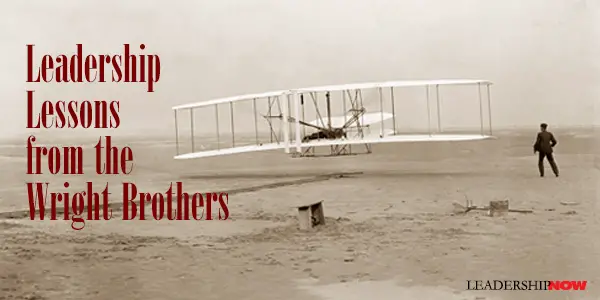
THE WRIGHT BROTHERS were born into an exciting period of American history. A time of great progress. Life-changing progress.
Their story provides us with many lessons for leaders. It’s a story of the possibilities that show themselves when we approach life from the right perspective. Courage
Determination
Life-Long Learning
Communication
Teamwork
Character

Posted by Michael McKinney at 08:49 PM
12.11.14

quickpoint: Napoleon on Self-Control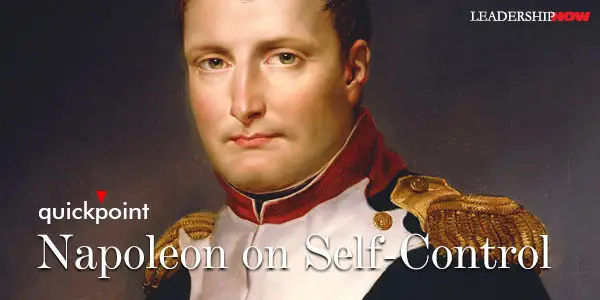
In my own case it’s taken me years to cultivate self-control to prevent my emotions from betraying themselves. Only a short time ago I was the conqueror of the world, commanding the largest and finest army of modern times. That’s all gone now! To think I kept all my composure, I might even say preserved my unvarying high spirits … You don’t think that my heart is less sensitive than those of other men. I’m a very kind man but since my earliest youth I have devoted myself to silencing that chord within me that never yields a sound now. If anyone told me when I was about to begin a battle that my mistress whom I loved to distraction was breathing her last, it would leave me cold. Yet my grief would be just as great as if I had the time. Without this self-control, do you think I could have done all I’ve done? Roberts concludes: “So rigid a control on one’s emotions might seem distasteful to the modern temperament, but at the time it was considered a classical virtue. It undoubtedly helped Napoleon deal with his extraordinary reversals of fortune.” 
Posted by Michael McKinney at 12:30 AM
08.04.14

Warren Bennis 1925-2014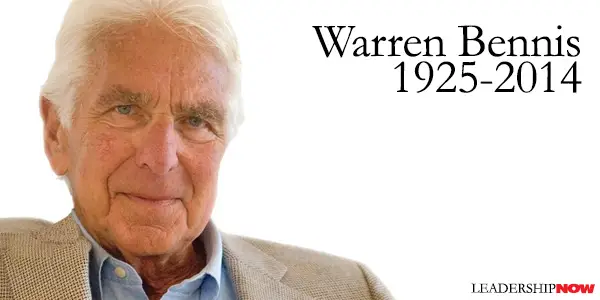
THE father of leadership, Warren Bennis died Thursday, July 31 at the age of 89. He had served as a business professor at the University of Southern California for the last 35 years. He wrote nearly 30 books including An Invented Life, which earned him a Pulitzer Prize nomination. His leadership thinking was in many ways ahead of its time. I first met Warren Bennis through his book, The Unconscious Conspiracy: Why Leaders Can’t Lead, in 1976. Later it was revised and reprinted as Why Leaders Can't Lead: The Unconscious Conspiracy Continues. He sparked my interest then and there in the discipline of leadership. In that first book he explained that the real enemy to leadership is apathy. Our organizations, he wrote, are “afflicted with a threefold sense of loss: loss of community, loss of purpose, and loss of power.” The core of the problem is that our leaders weren’t and still aren’t leading. “They’re consulting, pleading, temporizing, martyrizing, trotting, putting out fires, either avoiding or taking the heat, and spending too much energy in doing both.” Although he said that leaders must also manage, they are spending too much time managing. 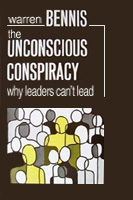 Bennis was always willing to—even interested in—taking the time to help you shape your thinking. His insights have shaped my own in many ways. More from Warren Bennis: “Too many companies believe people are interchangeable. Truly gifted people never are. They have unique talents. Such people cannot be forced into roles they are not suited for, nor should they be. Effective leaders allow great people to do the work they were born to do.” Taking charge of your own learning is a part of taking charge of your life, which is the sine qua non in becoming an integrated person.” “The most dangerous leadership myth is that leaders are born — that there is a genetic factor to leadership. This myth asserts that people simply either have certain charismatic qualities or not. That's nonsense; in fact, the opposite is true. Leaders are made rather than born.” “When the trust and credibility of leaders are at their lowest, when the beleaguered survivors in leadership positions feel unable to summon up the vestiges of power left to them, we most need people who can lead.” Bennis was a remarkable man with well-developed insights
Posted by Michael McKinney at 07:36 PM
12.05.13

Nelson Mandela Dies Today at 95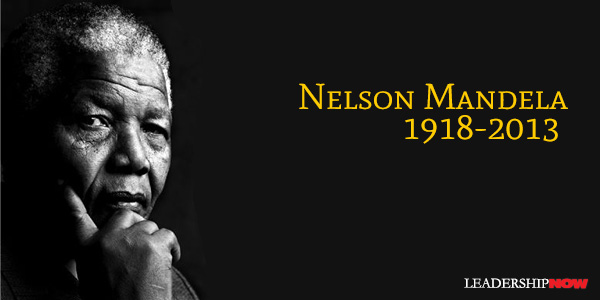
FORMER South African President Nelson Mandela, died today at the age of 95. He spent 27 years in prison for battling the apartheid government, but it transformed him. He became the Mandela we know with a remarkable capacity to forgive and a moral courage that would heal the wounds of his country. 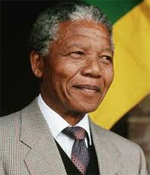 Richard Stengel, who collaborated with Nelson Mandela on Mandela’s best-selling 1993 autobiography, Long Walk to Freedom, wrote an article for Time Magazine in 2008 in which he extracted 8 lessons of leadership from Mandela’s life:
"We recall our terrible past so that we can deal with it, to forgive where forgiveness is necessary, without forgetting; to ensure that never again will such inhumanity tear us apart; and to move ourselves to eradicate a legacy that lurks dangerously as a threat to our democracy." (From the opening address at the debate on the report of the Truth and Reconciliation Commission, February 1999)
Posted by Michael McKinney at 10:26 PM
07.30.13

Henry Ford on Leadership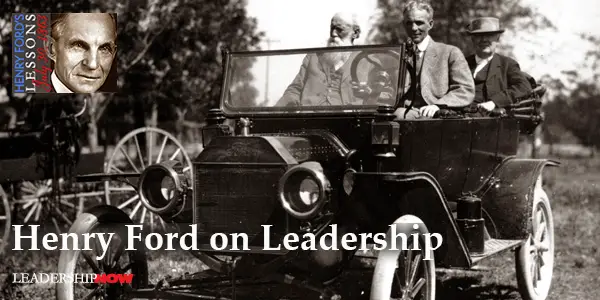
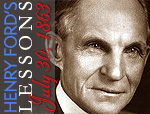 Although his first and second car companies failed, Ford learned more about cars, how to run a business, and more importantly how to attract talent to make his vision a reality. The times Ford was born into and his impact on them understandably convinced him of the superiority of his own intuition. He had the problem that haunts many successful leaders: self-delusion. He believed what he wanted to believe and was certain that he always knew best. Harvard professor Richard Tedlow observed in Giants of Enterprise, "If Henry Ford had died in February of 1914, after the announcement of the $5 dollar day, he would be remembered almost without qualification as a man of true greatness. His flaws were noticeable in his first half-century of life, but they would have been forgotten…. As his wealth grew and his fame engulfed the whole world, he lost all perspective. No life better exemplifies the derangement of power." His defiant, tenacious, and compulsive nature accounts for his early successes. His inner strength made his dreams possible but it didn't leave much room for introspection. Without a healthy self-awareness, Ford allowed his strengths to run amuck. If he was creative, he was irrational. If he attracted great talent, he also drove it away. If he was direct, he was insensitive. Without an inner compass, Henry Ford was a man of great extremes—for better and for worse. Henry Ford leaves us much to be admired but he also reminds us of the importance of a healthy self-awareness. On Failure:
On Lifelong Learning:
On Success:
On Passion:
On Initiative:
On Teamwork:
On Personal Responsibility:
Posted by Michael McKinney at 12:18 AM
06.20.13

Phil Jackson's 11 Principle's of Mindful Leadership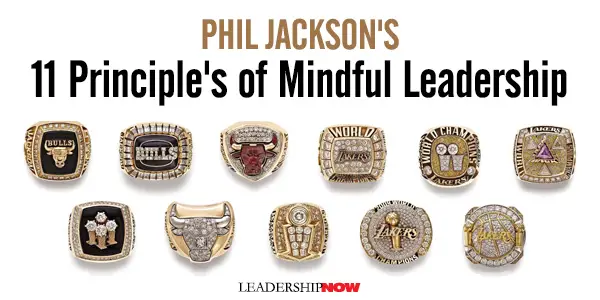
PHIL JACKSON, considered one of the greatest coaches in the history of the National Basketball Association, has won 11 titles as a coach. The most in NBA history. Eleven Rings is a memoir that, for me, is more about leadership and relationships than basketball. Jackson's principles are worth taking a look at. They support the idea that a leader's job is to build leaders at all levels. You could take back to your organization and put into practice today any one of the following 11 principles:1. Lead From the Inside Out. Avoid fads. Lead from who you are. "As time went by, I discovered that the more I spoke from the heart, the more players could hear me and benefit from what I gleaned." 2. Bench the Ego. "The more I tried to exert power directly, the less powerful I became. I learned to dial back my ego and distribute power as widely as possible without surrendering final authority. Paradoxically, this approach strengthened my effectiveness because it freed me to focus on my job as keeper of the team's vision. "Some coaches insist on having the last word, but I always tried to foster an environment in which everyone played a leadership role, from the most unschooled rookie to the veteran superstar. If your primary objective is to bring the team into a state of harmony and oneness, it doesn't make sense for you to rigidly impose your authority." 3. Let Each Player Discover His Own Destiny. Jackson's goal wasn't to provide all of the answers. "I've always been interested in getting players to think for themselves so that they can make difficult decisions in the heat of battle." "My approach was always to relate to each player as a whole person, not just a cog in the basketball machine. That meant pushing him to discover what distinct qualities he could bring to the game beyond taking shots and making passes. How much courage did he have? Or resilience? What about character under fire? Many players I've coached didn't look special on paper, but in the process of creating a role for themselves they grew into formidable champions." 4. The Road to Freedom is a Beautiful System. Similar to the principles used to foster greater creativity and innovation in an organization, Jackson used a system known as the triangle offense. "What attracted me to the triangle was the way it empowers the players, offering each one a vital role to play as well as a high level of creativity within a clear, well-defined structure." 5. Turn the Mundane into the Sacred. Leaders take note. Jackson writes, "As I see it, my job as coach was to make something meaningful out of one of the most mundane activities on the planet: Playing pro basketball." He incorporated meditation into his team's practices. "I wanted to give players something besides X's and O's to focus on. What's more, we often invented rituals of our own to infuse practices with a sense of the sacred." 6. One Breath = One Mind. Players "often have to make split-second decisions under enormous pressure. I discovered that when I had the players sit in silence, breathing together in sync, it helped align them on a nonverbal level far more effectively than words. One breath equals one mind." "If you place too many restrictions on players, they'll spend an inordinate amount of time trying to buck the system. Like all of us, they need a certain degree of structure in their lives, but they also require enough latitude to express themselves creatively." 7. The Key to Success is Compassion. "Now, 'compassion' is not a word often bandied about in locker rooms. But I've found that a few kind, thoughtful words can have a strong transformative effect on relationships, even with the toughest men in the room." Compassion breaks down barriers among people. 8. Keep Your Eye on the Spirit, Not on the Scoreboard. When a player is "playing within his natural abilities, he activates a higher potential for the team that transcends his own limitations and helps his teammates transcend theirs. When this happens, the whole begins to add up to more than the sum of its parts." He adds, "Most coaches get tied up in knots worrying about tactics, but I preferred to focus my attention on whether the players were moving together in a spirited way." 9. Sometimes You Have to Pull Out the Big Stick. Sometimes Jackson used "tricks to wake players up and raise their level of consciousness….Not because I want to make their lives miserable but because I want to prepare them for the inevitable chaos that occurs the minute they step onto a basketball court." 10. When in Doubt, Do Nothing. "Basketball is an action sport, and most people involved in it are high-energy individuals who love to do something—anything—to solve problems. However, there are occasions when the best solution is to do absolutely nothing….I subscribe to the philosophy of the late Satchel Paige, who said, 'Sometimes I sits and thinks, and sometimes I just sits.'" 11. Forget the Ring. We all hate losing. "And yet as coach, I know that being fixated on winning (or more likely, not losing) is counterproductive, especially when it causes you to lose control of your emotions. What's more, obsessing about winning is a loser's game: The most we can hope for is to create the best possible conditions for success, then let go of the outcome." Jackson concludes with: "What matters most is playing the game the right way and having the courage to grow, as human beings as well as basketball players. When you do that, the ring takes care of itself." 
Posted by Michael McKinney at 10:33 AM
06.13.13

The Ten Virtues of Outstanding Leaders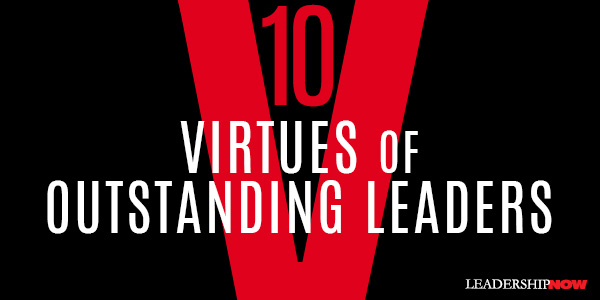
LEADERSHIP and character are inseparable. In the Ten Virtues of Outstanding Leaders, philosophers Al Gini and Ronald Green, ask what is good leadership? They insist "that ethics, character, and virtue are essential to real leadership" and anything else is misleadership. They define leadership as: Leadership is not just a set of learned skills, a series of outcomes, a career, a profession, or a title. Leadership, at its core, is about character: specifically, a character attuned to its ethical responsibilities to others. The kind of character that, in regard to others, always tries to do the right thing, for the right reason, on purpose. They suggest ten virtues or traits of character and as such they describe not just a leader's behavior but a clear sense of the way a leader thinks; the beliefs and motivations behind their actions. They note that these virtues are fragmentary in that they can exist apart from one another and rarely does any leader possess all of them. 1. Deep Honesty. Not just truth-telling but a bias for the truth. "It describes the leader's basic commitment to the truth, and a sense of shame or anger when deceitfulness replaces truth-telling." (James Burke, Johnson & Johnson) 2. Moral Courage. "Here one confronts a multitude of things that terrify people: fear of criticism or embarrassment; fear of poverty or job loss; fear of losing friends or being ostracized—even fear of being seen to be in the wrong. Overcoming self-doubt can be an expression of courage." Courageous leaders hold fast to their values and purpose even when there is no certainty that they will prevail. Courage is of particular importance because unlike the virtue of honesty, is not an aim in itself but it supports other moral claims. As such, philosopher Robert Merrihew Adams describes courage as a "structural virtue." (Abraham Lincoln and Rosa Parks) 3. Moral Vision. Great leaders not only "exhibit moral courage, they are also able to understand the meaning of the values they fight for and the importance of ethics in both human life and in the life of organizations and communities." They understand the consequences of ethical values and are able to share it with others. (Winston Churchill) 4. Compassion and Care. The ability to connect with and resonate to the needs of their followers. Leadership is a relationship. (Oprah Winfrey) 5. Fairness. Leaders should be fair in executing policies across the board. Fairness reinforces followers' trust. Everyone is special but not different. (Dwight D. Eisenhower) 7. Creative Thinking. A tendency toward independence and creativity in thinking. It may show itself "in new ways of accomplishing organizational goals, and even of redefining those goals." In periods of great change a "premium is placed on leaders who can come up with original solutions or approaches." (Herb Kelleher) 8. Aesthetic Sensitivity. This virtue is not just an appreciation of the creation of beauty, but an ability to leverage it for the organizations advantage. "By paying attention to the aesthetic dimensions of their enterprise, outstanding leaders pioneer new products and services and actively shape the tastes of millions." (Steve Jobs) 9. Good Timing. This, like courage, is another structural virtue. It is necessary for the pursuit of any worthy goal. "Like deep honesty, good timing defies superficial outer appraisal. A leader who waits the precise moment to act may appear indecisive to those who urge a quicker response. Such a leader must also have the courage to weather criticisms." (Charles de Gaulle) 10. Deep Selflessness. The willingness to sacrifice oneself. In moments of great organizational uncertainty or crisis, a leader's self-sacrifice "could send a clear message as to what kind of conduct is needed to overcome the crisis and how earnestly the leader is committed to the cause of the organization. It conveys to followers the leader's strong conviction that 'we can do it,' and is an earnest invitation to participate." (Martin Luther King Jr.) In the second part of the book they explore the meaning of each of these virtues through the lives of leaders that lived and exemplified them. "Virtue is learned," write Gini and Green, "by witnessing the deeds of others." 
Posted by Michael McKinney at 11:33 PM
04.08.13

Former British Prime Minister Margaret Thatcher Dies Today at 87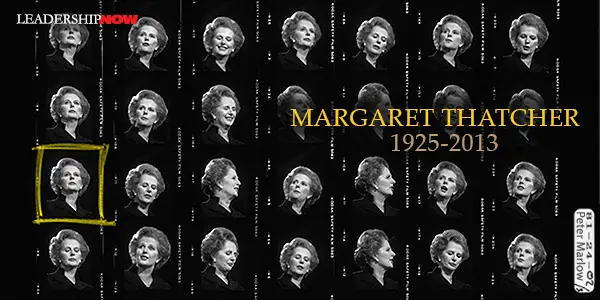
FORMER British Prime Minister Margaret Thatcher, the first and the only woman to become British prime minister, died today at the age of 87 from a stroke. Thatcher served from 1975 to 1990 as leader of the Conservative Party. She was called the "Iron Lady" for her personal and political toughness. Thatcher was proud of her modest background and was known as a grocer's daughter. She studied chemistry at Oxford and may have even helped invent soft-serve ice cream where she worked as a research chemist after graduation. She was involved in politics from a young age, giving her first political speech at 20. David Cameron, the Prime Minister, said: “We've lost a great prime minister, a great leader, a great Briton. She didn't just lead our country, she saved our country, and I believe she'll go down as the greatest British peacetime prime minister.”  On Power
On Convictions
“Consensus: The process of abandoning all beliefs, principles, values, and policies in search of something in which no one believes, but to which no one objects; the process of avoiding the very issues that have to be solved, merely because you cannot get agreement on the way ahead. What great cause would have been fought and won under the banner: ‘I stand for consensus?” "If you just set out to be liked, you would be prepared to compromise on anything at any time and you would achieve nothing." On Society
“It used to be about trying to do something. Now it's about trying to be someone.” “Do you know that one of the great problems of our age is that we are governed by people who care more about feelings than they do about thoughts and ideas.” On Character
On Work Ethic
“I do not know anyone who has gotten to the top without hard work. That is the recipe. It will not always get you to the top, but it will get you pretty near.” On Perseverance
On Patience
On Leadership
Posted by Michael McKinney at 10:52 PM
02.18.13

Washington’s Lessons: It’s Never Too Early to Choose to Lead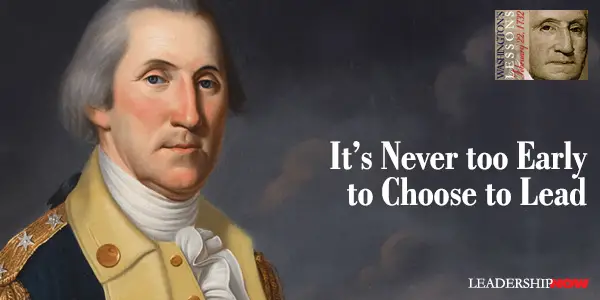
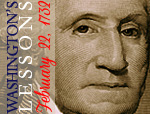 George Washington filled many roles in his lifetime: a surveyor, frontier explorer, businessman, land speculator, soldier, farmer and statesman. A couple of examples from Washington’s childhood help to explain his successes later in life. By age sixteen, Washington had copied out by hand, 110 Rules of Civility & Decent Behavior in Company and Conversation. They are based on a set of rules composed by French Jesuits in 1595. The first rule sets the tone of the others that follow: “Every Action done in Company, ought to be with Some Sign of Respect, to those that are Present.” There isn’t a leader that wouldn’t benefit from a daily reminder of this approach. Time and time again, these rules from his childhood played out in the conduct of his public life and defined his reputation. These rules and his concern for them integrated him as a leader and bonded him with those he led. 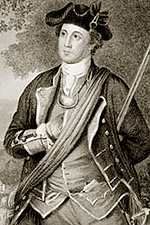 It is the mindset of a leader to work on themselves harder than they work on others. A leader’s first responsibility is governing themselves. Historian Gordon Wood has written, “Washington became a great man and was acclaimed as a classical hero because of the way he conducted himself during times of temptation. It was his moral character that set him off from other men.” Leadership is embodied in the way you look at the world and respond to it. It’s never too early to choose to lead.
Posted by Michael McKinney at 12:01 AM
12.27.12

Gen. H. Norman Schwarzkopf 1934-2012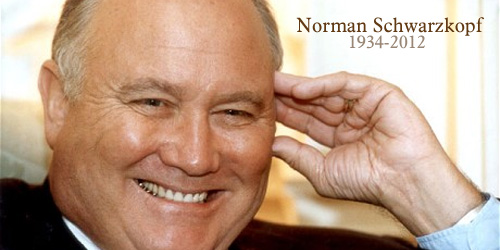 Retired Gen. H. Norman Schwarzkopf, who commanded the U.S.-led international coalition that drove Saddam Hussein's forces out of Kuwait in 1991, died today at age 78 due to complications from pneumonia. He lived in retirement in Tampa, where he had served in his last military assignment as commander-in-chief of U.S. Central Command. In a statement issued through his office, former President George H.W. Bush said he and his wife, Barbara Bush, were mourning Schwartzkopf's death. "Barbara and I mourn the loss of a true American patriot and one of the great military leaders of his generation," Bush's statement read. "A distinguished member of that Long Gray Line hailing from West Point, Gen. Norm Schwarzkopf, to me, epitomized the 'duty, service, country' creed that has defended our freedom and seen this great nation through our most trying international crises. More than that, he was a good and decent man—and a dear friend. Barbara and I send our condolences to his wife, Brenda, and his wonderful family." Secretary of State Colin Powell, who was chairman of the Joint Chiefs of Staff during Desert Storm, recalled Schwarzkopf as "a great patriot and a great soldier." He continued, "Norm served his country with courage and distinction for over 35 years. The highlight of his career was the 1991 Persian Gulf War, Operation Desert Storm. 'Stormin' Norman' led the coalition forces to victory, ejecting the Iraqi Army from Kuwait and restoring the rightful government. His leadership not only inspired his troops, but also inspired the nation. On Leadership Development You learn far more from negative leadership than from positive leadership. Because you learn how not to do it. And, therefore, you learn how to do it. On Character Leadership is a potent combination of strategy and character. But if you must be without one, be without the strategy. On Leadership Do what is right, not what you think the high headquarters wants or what you think will make you look good. On Courage True courage is being afraid, and going ahead and doing your job anyhow, that's what courage is. On Knowing Doing The truth of the matter is that you always know the right thing to do. The hard part is doing it. On Success Success is sweet, but the secret is sweat.
Posted by Michael McKinney at 06:43 PM
06.15.12

What’s Wrong with Leadership Training Today? IT’S A DIFFICULT TIME for leaders. “Our familiarity with and disrespect for our leaders,” writes Harvard professor, Barbara Kellerman in The End of Leadership, “coupled with our feeling entitled and being emboldened, saps their authority, which then drains their power and influence.”
IT’S A DIFFICULT TIME for leaders. “Our familiarity with and disrespect for our leaders,” writes Harvard professor, Barbara Kellerman in The End of Leadership, “coupled with our feeling entitled and being emboldened, saps their authority, which then drains their power and influence.”
Commenting on the 2011 budget-ceiling talks she finds that Barack Obama’s followers are “more disposed to resist him than to support him….No one was able to lead…and no one was willing to follow.” Perhaps no one was able to lead because no one was willing to follow. Leading in America is now more difficult than ever “not only because we have too many bad leaders, but because we have too many bad followers.” Kellerman cites lack of involvement as the culprit, but it goes further than that. We have never been taught how to support a leader in the right way. Followership is as important a skill as leadership. Kellerman notes that the contract—you lead, I’ll follow—between leaders and followers has been undermined “because of the information to which followers now have access, too many leaders are judged by too many followers to be unethical or incompetent or both.” Familiarity with our leaders had bred contempt. Technology has changed the social landscape providing us with so much more information. But it has, I would argue, informed us more broadly, but for the most part, not more deeply—if we even had the time or the inclination to go more deeply. I would also suggest that we are not, at times, very good judges. We lack facts and context much of the time. What frames our judgments are often selfish concerns—just like our leaders. And too, we rarely judge others in the manner that we would like to be judged. The End of Leadership offers a report on the state of leadership and followership today. Kellerman has surveyed the history of leadership to pinpoint a trend—the diminishing power and influence of leaders and people in authority and the increase of power and influence of ordinary people—followers. In recent years, communications technology has played a large part. “The effect on leaders is to diminish them. The more we know about how leaders and managers manage, the more they tend to shrink.” The contract between leader and follower has changed. The assumptions on which it was based has changed because first, “the old justifications for having power, authority, and influence are no longer so persuasive and second because people in the present think of themselves are more important, more entitled than did people in the past.” Kurt Anderson asked in New York magazine, Is Democracy Killing Democracy? He writes: So now we have a country absolutely teeming with irregular passions and artful misrepresentations, whipped up to an unprecedented pitch and volume by the fundamentally new means of 24/7 cable and the hyperdemocratic web. [There is ] the misapprehension that democratic governing is supposed to be the same as democratic discourse, that elected officials are virtuous to the extent that they too default to unbudging, sky-is-falling recalcitrance and refusal. And the elected officials, as never before, are indulging that populist fantasy. Just as the founders feared, American democracy has gotten way too democratic. I wonder if we have—in our radical shift to the entitlement of followers and the bad leadership that encourages it—sowed the seeds for an overcorrection in the other direction. Perhaps we will find ourselves welcoming a society governed by extremely self-deferential leaders to sort it out. History shows us that when societies get to the point that they can’t properly govern themselves, they don’t get more disciplined and make the necessary corrections, they instead get behind anyone that will make all the “bad” go away—usually with negative consequences. Because we have been able to “do” leadership in a way that has been less respectful of the follower and get away with it, doesn’t mean we were doing it right. While old methods of leadership are not tolerated at the present time, it doesn’t mean leadership itself has changed. The “right” way of leading people has never changed; our approach to leading people just swings back and forth from ditch to ditch. History shows us that we rarely get it “right.” Kellerman observes that in the world in which we actually live, “leaders tend to put self-interest ahead of the public interest.” How true. The idea that our leaders reflect who we are should give us pause. Much of the problem with leadership training, in my view, is that we are trying to develop something in leaders long after the train has already left the station. It’s not that it can’t be done. It’ is just much harder. Good leadership development begins much earlier in life. Given our situation, Kellerman asks, how do we learn to lead in the twenty-first century? How to learn to lead when leaders are diminished from what they were, even in the recent past? How to learn to lead when resources such as power, authority, and influence are scarcer than before—and when any number of followers is as likely to be resistant as deferent? And, finally, how to learn to lead when the context itself is fraught with complexity and constraint? Could we develop betters leaders if we developed better followers and would better followers create a pool of better leaders? Should we be training for followership? Should we be teaching the right kind of followership is leadership? The End of Leadership is a vitally important book that every leader/follower should read and consider, but it is the tip of a much larger discussion about leadership, followership and society. Kellerman writes that “it is meant as a caution about the future of leadership in the twenty-first century. For nearly everywhere, leaders are found wanting, followers are restive, and the context is changing—sometimes at warp speed. So unless we get a grip, the prognosis is grim.” Kellerman says that the leadership industry must make at least four changes:
Kellerman lays the foundation with this: “We need to think of leadership as a creative act—for which leaders and followers both are educated, for which leaders and followers both are prepared over a lifetime of learning….There are ways to educate women and men so they learn to be good, smart followers as well as good, smart leaders, and develop as large capacity for contextual intelligence as for emotional intelligence.” Absolutely.

Posted by Michael McKinney at 03:19 PM
06.11.12

Colin Powell's 13 Rules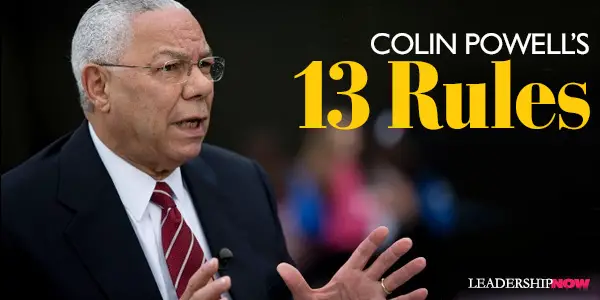
COLIN POWELL has written a valuable memoir. It Worked For Me: In Life and Leadership is a collection of lessons learned and anecdotes drawn from his life. The 44 stand-alone chapters are an easy read and the stories make good points. The theme of the book is that it is all about people and relationships. The book begins with his 13 Rules and why he has hung on to them over the years. Here they are with some of his thoughts on each:

Posted by Michael McKinney at 09:58 PM
03.02.12

Eisenhower, Kennedy & the Power of Vision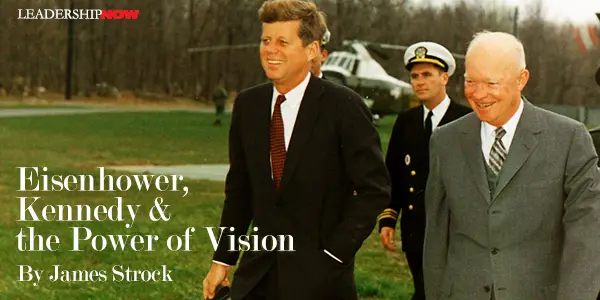
Serve to Lead, my book about 21st century leadership, includes respectful references to the management approach of Dwight Eisenhower. Some readers, I learned, had been unaware of the scope of Ike’s accomplishments. Some young people have scarcely heard of the thirty-fourth president. By contrast, many more people are aware of the leadership of John Kennedy, Ike’s successor. JFK is routinely ranked among the presidents most admired by Americans today. There may be lessons in the differing public understandings. Eisenhower Accomplishments Overlooked 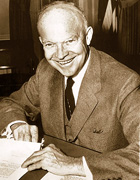 More recently, Ike has been rediscovered. In his new book, Eisenhower in War and Peace, respected historian Jean Edward Smith makes the case for Eisenhower’s exceptional leadership in war and politics. Ike: Civil Rights, Space The Eisenhower administration broke ground in the long-overdue struggle to accord African-American civil rights. Examples cited by Smith include:
So, too, he initiated the American space program, establishing the National Aeronautics and Space Administration in response to the Soviet Union’s successful Sputnik launch. And yet… how many Americans today recall Eisenhower’s decisive role in civil rights or the space program? JFK: Civil Rights, Space By contrast, John Kennedy is indelibly identified with each. It is impossible to know what Kennedy might have accomplished in the civil rights arena, had his life not been tragically truncated. As it was, his administration’s accomplishments were limited. In significant part this was because of his party’s reliance on the “Solid South,” and the conservative, rural coalition that held great sway in the Congress. JFK did convey public support at key moments. One was his celebrated telephone call of support to Mrs. Coretta Scott King, following the jailing of Dr. Martin Luther King, Jr. during the 1960 campaign. Most memorable was Kennedy’s June 11, 1963 speech on civil rights. He brought the American past, present, and future together, declaring: The heart of the question is whether all Americans are to be afforded equal rights and equal opportunities, whether we are going to treat our fellow Americans as we want to be treated. If an American, because his skin is dark, cannot eat lunch in a restaurant open to the public, if he cannot send his children to the best public school available, if he cannot vote for the public officials who will represent him, if, in short, he cannot enjoy the full and free life which all of us want, then who among us would be content to have the color of his skin changed and stand in his place? Who among us would then be content with the counsels of patience and delay? King was moved to dispatch a telegram in response, calling the speech “one of the most eloquent, profound and unequivocal pleas for justice and freedom of all men ever made by any president.” It is hard to imagine Eisenhower evoking such a response, despite the clear direction of his civil rights policies, and his personal expressions of commitment in various settings. So, too, JFK reframed the space race, urging the American nation to “commit itself to achieving the goal, before this decade is out, of landing a man on the moon and returning him safely to earth.” This extraordinary stretch goal was achieved, with the entire world witnessing it on television, on July 20, 1969. Though Eisenhower set the stage for the moon shot, it is difficult to imagine his casting such a vision, setting off such a mission. The Power of Vision Dwight Eisenhower was, fundamentally, a military man. In many ways, his presidency represented the best of the armed forces. Ike was publicly modest, chastened by the keen awareness of war and fateful decisions. He was down-to-earth, focused intently on results. His manner of communication was skilled yet unpretentious. He was not eloquent per se, other than in the sense that his presence lent eloquence to his statements and sentiments. 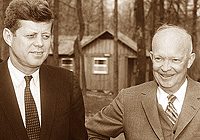 John Kennedy was a man of history and words. He was a skilled writer. He undertook to make himself a great speaker. Where Eisenhower sought to inform, Kennedy sought to inspire. His ennobling vision, evidenced in the civil rights and space examples, created its own power. He would lead first, with management harnessed to serve its ends. Had Kennedy fully appreciated Eisenhower’s deft management of large enterprises, he might well have avoided early missteps, such as the Bay of Pigs invasion. Had Eisenhower had Kennedy’s skill with vision and communication, he might well be remembered more passionately, his achievements more clearly recognized. From a distance, one might say that Eisenhower’s and Kennedy’s strengths as leaders were paired with their weak spots. Perhaps. Yet that need not stop up from striving to learn from both of their examples at their best, just they studied and learned from others. 
Posted by Michael McKinney at 02:35 PM
02.15.12

The Inner World of the Leader: On the Couch with Manfred Kets de Vries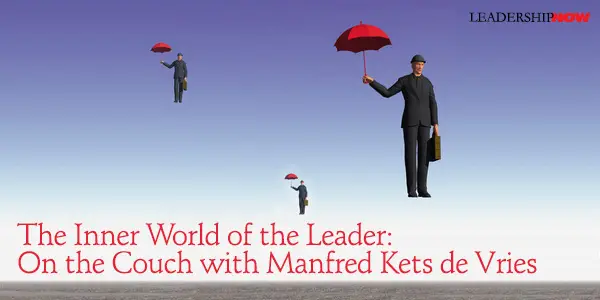
WHY do organizations attempt to function on the basis that executives are logical, rational, dependable human beings? Kets de Vries is a clinical professor of leadership development at INSEAD. His background in economics, management, and psychoanalysis, adds a great deal of richness and context to the study of leadership. Over the last three years Jossey-Bass has published a mostly revised and updated collection of his rather large body of thoughtful-provoking writing in this series of three books. The opinion of one of the power holders in the [Harvard Business School] Organizational Behavior department was that I would never write anything. That particular person must have had a very good understanding of human behavior. One of the small pleasures of life is doing something people say you will never do. I believe that [Reflections on Character and Leadership] is my twenty-ninth book. I have always thought that academics are masters in character assassination.Kets de Vries begins the series with Reflections on Character and Leadership. In it he examines some of the major issues about leadership. What makes a leader? What is good leadership? And what is bad? What happens to organizations if a leader derails? What are the impacts of successful and failed leadership on followers and organizations? Every leader needs someone who is willing to speak out and tell the leader how it is in order to create checks and balances—the counterweight of the person in power. Without such people leaders easily derail and organizations can become paralyzed by fear, mistrust and insecurity. He explains how leaders construct organizations that are great places to work. The era of the highly structured organization is past….Clearly, some executives may not be able to deal with the ambiguities that this new kind of networking, boundary-less organization entails—the external boundaries in an organization can be removed fairly easily, but the boundaries inside people’s heads are more difficult to dissolve. Weaning some leaders away from their need for authority, structures, and controls may take considerable time and effort. In the long run, however, it will be well worth it. Eventually, they will enjoy their work more, and be more effective.Kets de Vries says that narcissism is an inescapable aspect of human nature—and leadership. It has had a generally bad press. “There is such a thing as a healthy dose and it lies somewhere on a wide spectrum that ranges from grandiosity and showmanship to denigration and coldness.” He begins Reflections on Leadership and Career Development by discussing narcissism and leadership. Leadership can be pathologically destructive or intensely inspirational. But what is it about the leaders themselves that causes them to be one or the other? I believe the answer lies in the degree of narcissism in the personality of the leader in question. He discusses the qualities characterize great leaders and the interactions, both positive and dysfunctional, between leaders and followers. “The truly effective leader “is the one who knows how to balance reflection and action by using self-insight as a restraining force when the sirens of power start singing.” He takes a look at leadership archetypes and how they operate within organizations—and how to deal with them. He concludes with an examination of the issues, anxieties, and opportunities that we face at midlife and beyond. How can we alter our perspective on life to become “twice-born”? Finally in Reflections on Groups and Organizations, Kets de Vries looks at leadership issues in the context of groups and organizations. He examines various ways in which neurotic individuals create neurotic organizations. He describes how folie à duex—literally “madness shared by two”—works in an organizational setting; how individuals’ activity or passivity and tendency toward conformism can contribute to the process and what checks and balances could be used to forestall and manage dysfunctional leader-follower relationships.Kets de Vries doesn’t believe leaders are born. While some seem to have a head start, leadership potential can be developed. “Leadership potential is a delicate interplay between nature and nurture.” An effective leader is someone, says Kets de Vries, “who is a little like a Zen riddle, or kōan—a paradox who is comfortable dealing with paradoxes. Because a leader has to be active and reflective, an introvert and an extrovert, engaged in both divergent and convergent thinking. A leader needs IQ, but also EQ. A leader has to think atomistically, but also holistically, for the short term and the long term. Anyone who can balance these contradictions effectively will do well.” He advocates the building of an organization wide coaching culture ad discuss how it can be implemented. There are several basic things that any leader has to do: provide focus, understand what makes their people tick, set an example, and make things happen. However, the distinguishing factor between mediocre and great leadership is always the same: the creation of meaning….When it comes down to it, people are searching for meaning. This series of books cannot be read quickly. Each book in the series seeks to understand leaders, human nature and its vicissitudes. They need to be reflected on. They will challenge your thinking, widen your perspective and inspire you to do better.
Posted by Michael McKinney at 04:08 PM
10.28.11

No Fear of Failure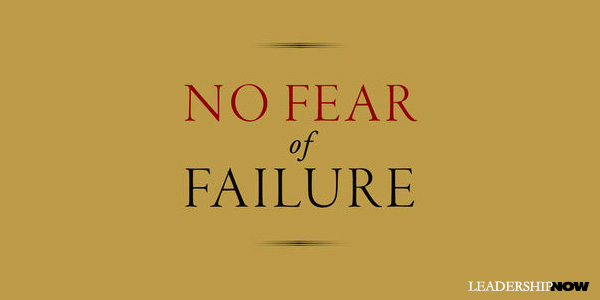
GARY BURNISON, CEO of Korn/Ferry International, shares one-on-one conversations with a dozen successful leaders in No Fear of Failure. He found a common theme in these conversations: they each “exhibited tremendous courage around the possibility, and even the inevitability at times, of failure. In the face of uncertainty, they draw on an inner strength that allows them to strive for what is possible rather than become paralyzed by the risk of failure.” Indra Nooyi, chairman, and CEO of PepsiCo, on Learning: “The one thing I have learned as a CEO is that leadership at various levels is vastly different….As you move up the organization, the requirements for leading that organization doesn’t grow vertically; they grow exponentially….If you want to improve the organization, you have to improve yourself and the organization gets pulled up with you….Just because you are a CEO, don’t think you have landed. You must continually increase your learning, the way you think, and the way you approach the organization.” Vicente Fox, former president of Mexico, on Humility: “The higher leaders rise, the further they move from where they began. The danger is that success will undermine their humility, leaving them out of touch and disconnected….There are so many temptations that would undermine your humility. You have to develop that part, work on it all your life. It’s easy to fall on the other side, especially when you are in power and have a position.” Daniel Vasella, MD, chairman of Novartis AG on Stewardship: A vineyard owner pointed to a stone wall and explained how his grandfather had started building it and then his father added to it as did he. Vasella “found this to be a fascinating analogy. It’s like no great cathedral was build in one generation. There are several implications. First, you’re not here to take advantage but rather to add. Second, you will not finish. Third, it is very important that the overall vision of what is being built be shared by several people over time.” Coach John McKissick, the “winningest” coach in football on Coaching: “I don’t coach football, I coach kids.” His code is “to live clean, think clean, and stop doing all the things that will destroy them physically, mentally, and morally, and to start doing things that will make them cleaner, finer, and more competent. That’s not a sacrifice. I tell them that all the time. ‘I’m helping you be a better person and a better player.’” One of the most important leadership lessons Burnison learned in his career was that “leadership is all about the other person. No matter the topic—whether someone is being fired or has just told you about a serious health issue—that person should leave your office feeling better than when he or she entered.… For the CEO there is no off-the-cuff remark. Leadership demands introspection and an understanding of the clout that one’s words and actions carry.” The conversations Burnison shares will influence your leadership in profound ways. As leaders, we need to keep learning. It’s key to our success. It’s sad how many leaders do not actively pursue their own leadership development. This book will help. 
Posted by Michael McKinney at 09:49 AM
10.05.11

Steve Jobs 1955-2011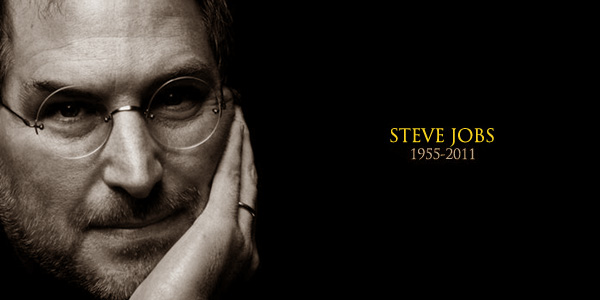
ONE of the most remarkable innovators of our time, Steve Jobs has been called a Henry Ford, a Walt Disney, a Thomas Edison. "We are deeply saddened to announce that Steve Jobs passed away today," Apple said. "Steve's brilliance, passion, and energy were the source of countless innovations that enrich and improve all of our lives. The world is immeasurably better because of Steve." Here are a selection of his thoughts on life: We don’t get a chance to do that many things, and every one should be really excellent.
I want to put a ding in the universe. You can’t connect the dots looking forward; you can only connect them looking backwards. So you have to trust that the dots will somehow connect in your future. You have to trust in something—your gut, destiny, life, karma, whatever. This approach has never let me down, and it has made all the difference in my life. Remembering that I'll be dead soon is the most important tool I've ever encountered to help me make the big choices in life. Because almost everything — all external expectations, all pride, all fear of embarrassment or failure - these things just fall away in the face of death, leaving only what is truly important. Remembering that you are going to die is the best way I know to avoid the trap of thinking you have something to lose. You are already naked. There is no reason not to follow your heart. No one wants to die. Even people who want to go to heaven don't want to die to get there. And yet death is the destination we all share. No one has ever escaped it. And that is as it should be, because Death is very likely the single best invention of Life. It is Life's change agent. It clears out the old to make way for the new. Right now the new is you, but someday not too long from now, you will gradually become the old and be cleared away. Sorry to be so dramatic, but it is quite true. Your time is limited, so don't waste it living someone else's life. Don't be trapped by dogma — which is living with the results of other people's thinking. Don't let the noise of others' opinions drown out your own inner voice. And most important, have the courage to follow your heart and intuition. They somehow already know what you truly want to become. Everything else is secondary. Jobs told the Wall Street Journal, “Being the richest man in the cemetery doesn’t matter to me … Going to bed at night saying we’ve done something wonderful… that’s what matters to me.” And he did.
Posted by Michael McKinney at 05:47 PM
09.05.11

Ones Should be CEOs, Twos Should Not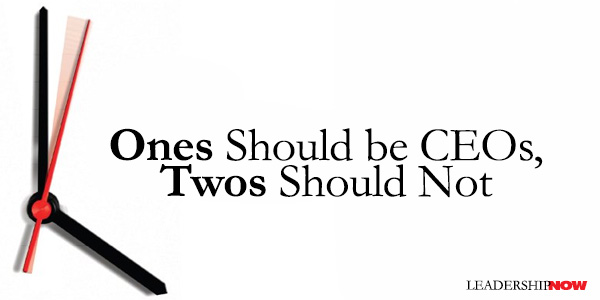
TECHNOLOGY is reaching a breaking point. The amount of data is even overwhelming computing capabilities. A new model of information technology is needed. A new model is being found by applying the predictive nature of the brain to the way computers "think." Wayne Gretzky has famously said, “I skate to where the puck is going to be, not where it has been.” Sports commentators would say that he seemed to be two seconds ahead of everyone else. In The Two-Second Advantage, authors Vivek Ranadivé and Kevin Many write, “Like Gretzky on ice, the most successful people in various fields make continual, accurate predictions just a little ahead of and little better than everybody else.” They don’t need to be able to see ten years out; just enough ahead will do the trick.Part of what is going on in the brain is a function called “chunking.” Predicting and chunking go together by looking for patterns and predicting outcomes. We chunk all types of information. It makes us efficient. If we didn’t chunk, we would think about everything as if it was for the first time. Teaching computers to do this will make them more useful—“two-second-advantage” predictive technology. What caught my attention in their discussion of predictive thinking—from a leadership standpoint—was the idea of two types of leaders found at the top of organizations: Ones and Twos.
Ones tend to be founders. They are bullheaded and courageous. They tell people what to think, not what they think people want to hear. They see openings and get flashes of creativity—like Gretzky in a hockey game. They can take in everything that is happening at a company and see it from a higher level, the details blurring into instinct. Bill Gates is a prototypical one; Steve Ballmer is a two. Steve Jobs is a classic one. The authors say that ones should be CEOs, and twos should not. Of course, a good CEO really needs to be both—and can be with practice—but only rarely do. Of Interest:

Posted by Michael McKinney at 04:57 PM
08.05.11

The Iconography of LeadershipArt critic Robert Hughes discusses the influence of Rome’s art on Roman history in his book Rome: A Cultural, Visual, and Personal History. He points out that like the propaganda of today, statues in ancient Rome perpetuated the power of leaders. He presents the “competent, effective and memorable” statue of the emperor Augustus found in the Villa of Livia at Prima Porta, as an example that has few equals as an image of “calm, self sufficient power.”Hughes writes, “Until the advent of photography and then of TV, which effectively replaced them, propaganda statues were indispensable when it came to perpetuating the iconography of leadership. They were produced in mass numbers all over the world to celebrate the virtues and achievements of military heroes, political figures, wielders of every sort of power over all kinds of people.” 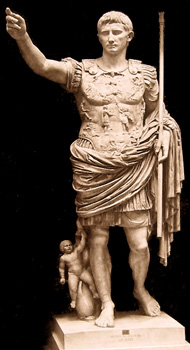 Hughes states that we should not think of this as a unique piece. “The Romans,” he writes, “reveled in the cloning, copying and dissemination of successful images—successful, that is to say, especially from the viewpoint of ideology.” Certainly, whether to perpetuate a myth or a truth, we do the same today. Images create a powerful story.
Posted by Michael McKinney at 03:51 PM
05.05.11

Bill Roedy: From West Point to MTV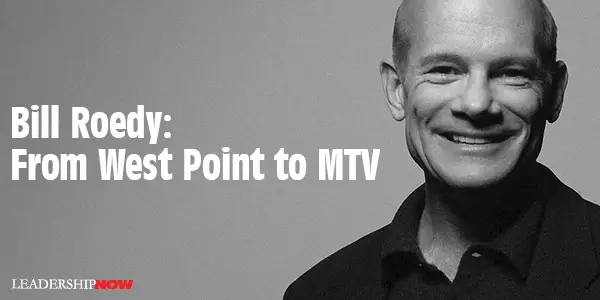
BILL ROEDY, former Chairman and CEO of MTV Networks International, began working for HBO in 1979 when it was broadcasting only nine hours a day. There he learned that distribution was everything. It was to be his mantra at MTV—aggressive, creative, relentless distribution. Roedy shares his experiences and lessons in What Makes Business Rock. From virtually nothing, he built MTV International into the largest media network in the world. For anyone involved doing business internationally, it is essential reading. As manager of HBO’s national accounts, he learned that “In life as well as in business, the ability to sell is the foundation upon which success is built.” Some people don’t understand that he says, but even in Vietnam, although he had the formal authority to force troops to obey my orders, I found that if people didn’t believe in the mission, I never got a total effort from them.” Leaders are always selling. Although reluctant to leave HBO and move to London, in 1989 he became managing director of MTV Europe. What he inherited wasn’t working. He had to quickly create a better product, get more distribution and generate revenue. Getting the right people in place was crucial to creating an entrepreneurial organization. “Never take ‘No’ for an answer.” “Take chances.” “Break all the rules.” Their objective was to be the most visually engaging channel in the history of European television. To make sure viewers always knew they were watching MTV, they put their logo in the corner of the screen and left it there. No one had done that before. (Now everyone does.) Here is a lesson every leader could bear to keep in mind: as a leader, your opinion matters—maybe more than you know. But it can actually be having a negative impact. The MTV playlist is extremely important to its viewers and giving them what they want to hear is essential to MTV’s survival. Roedy says that in the beginning, he attended those meetings if only to be the voice of reason and a subtle reminder that they were running a business. “But after attending half a dozen of these meetings I realized I was making a huge mistake. I was much older than our demographic and my musical tastes were very different. I was skewing the choices older.” So he stopped attending those meetings. “As much as I enjoyed being part of that process, I had to remind myself that I was a manager, and I had to delegate decision-making authority to those people I trusted.” How many leaders, for all kinds of well-intentioned reasons feel they have to leave their fingerprint on everything, while they are in-fact stifling their people and skewing the results? Roedy’s success at MTV can be attributed to the fact that he was always reinventing. “The longer you stay with the same strategy, the more vulnerable you become to your competitors.” His most important contribution was the idea, “Think global, act local.” MTV was already local to Europe, but it had to be broken down to the national level, country by country. “Learn the local culture and reflect it in every decision we make,” was their business strategy. He created a structure similar to what he learned in the military: small operating units in the field fighting the competition. “My belief was that the local people would best reflect the needs, tastes, and desires of the local audience, and because their jobs would depend on the bottom line, they were much less likely to make risky or destructive financial decisions. In Vietnam, I had seen over and over the benefits of dealing directly with the loyal population on their own terms, rather than trying to impose our beliefs on them.” Because of the complexities of operating an international business, you need be there on the ground to really feel it. On MTV Arabia for example, they broadcast the call to prayer on the channel five times every day. For Ramadan, they produced an animated film explaining the meaning of that important religious holiday to young people in a creative way and refrained for a month from showing any music videos. Throughout the book there are stories of music celebrities—singing karaoke with Bono and Bob Geldof dressed as a nurse in Tokyo at 4 a.m.—and others like Sumner Redstone, Robert Maxwell, Jeff Bewkes, Nelson Mandela, Jiang Zemin, Fidel Castro, Tony Blair, and the Dalai Lama. They add color to the book and make it all the more interesting. But read it for the insights into global business. 
Posted by Michael McKinney at 01:28 PM
05.04.11

What Makes Business Rock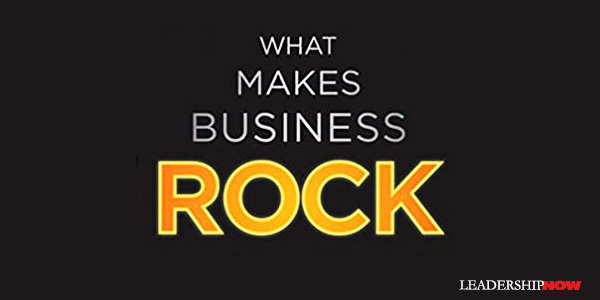
AFTER reading What Makes Business Rock by Bill Roedy, I have developed an appreciation for what it took to build MTV Networks International into what it is today. Former Chairman and CEO, Bill Roedy, has had a remarkable career. Due to financial constraints, he followed his Dad into West Point. Not his first choice. He became a member of the “Century Club” collecting more than a hundred hours of punishment duty. But he did learn the “difference between fighting the system and finessing it.” He also learned many of the skills that would enable him to succeed in business, including “discipline, time management, the value of teamwork, and the importance of physical endurance.” He learned how to prioritize. Survival depended on it. “Too often,” writes Roedy, “I have seen people focusing on the wrong things—things that are not going to directly or immediately affect their business….Leaders need to learn to cut through the chaff to determine priorities and to identify the real target.” After West Point he served in Vietnam in various command positions. “I learned the importance of making quick and firm decisions, communicating those decisions clearly to my troops, and then doing anything and everything necessary to implement them. I learned the importance of building morale, camaraderie, and a team spirit. I learned how to deal with the chain of command and how to get around it when necessary.” From Vietnam he went to Northern Italy where he spent four years in command of three NATO nuclear missile bases. A good place to learn how to deal with pressure and stress. “There are few situations more stressful than commanding a nuclear missile site and trying to determine in 30 seconds whether the aircraft approaching the base was a friend or foe. There was no margin for error. We had to be perfect every day.” Wanting to go into business, he resigned the military after 11 years and went to Harvard to get an MBA. As a child, Bill was so enthralled by the power of television that he would memorize the TV Guide and recite the schedule back to his mother. He knew he wanted to work in television so instead of the typical corporate route followed by his classmates, he took a job at a small start-up cable network called HBO. Roedy’s background doesn’t make him the likely candidate to build MTV International, but it certainly prepared him for it. More on that tomorrow. 
Posted by Michael McKinney at 11:46 PM
04.29.11

Presidential Decision Making: How and Why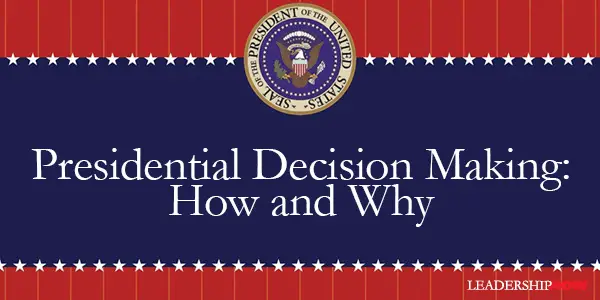
BOB WOODWARD once wrote, "When you see how the President makes political or policy decisions, you see who he is. The essence of the Presidency is decision-making." Nick Ragone has selected 15 presidential decisions that were proactive and ultimately shaped the office and the country. In the process he reveals more of the man.Looking back on decisions made, we often evaluate them based on our biases and current sensibilities. But to truly understand them we must see the world as they saw it. That is what Ragone does in Presidential Leadership. He takes each of these decisions and recreates them from the president’s perspective. It makes for an engaging and thought-provoking read. All of the decisions he selected were controversial at the time and required courage to see them through. The thread that runs through them all is persistence and conviction. Often in these decisions, the president had to make a choice between the good of the Union and his own personal beliefs. While many more decisions are worthy of consideration, he chose to focus on:
In reliving these moments in the pages of this book, you will gain a new appreciation for what it took to bring them about, their consequences and the origins of some of the issues we face today. Some of the decisions made were certainly a product of their time. What president today would deal with a tax revolt by personally leading 13,000 troops around the country in a show of force to intimidate the protesters as Washington did with the Whiskey Rebellion? But it proved to be the right thing to do. There was no bloodshed. “It was a rather anticlimactic ending to what many historians consider the greatest constitutional threat prior to the Civil War. Then there is the colorful account of Andrew Jackson’s handling of the nullification crisis brought on by the Tariff Act of 1832. The Union was at stake. “Jackson,” writes Ragone, “had the perfect skills for the crisis, if not the demeanor. He was ruthlessly consistent with his rationale….He understood the importance of public support and was adept at rousing patriotism through his words and deeds. He wasn’t afraid to be forceful when necessary, yet he tempered his natural impulsiveness because he knew it wouldn’t serve him well. And he had the capacity to grow and learn, something that can’t be said for every holder of the office.” His convictions no doubt guided Lincoln three decades later. Teddy Roosevelt’s approach to building the Panama Canal surely epitomizes the man. About his actions, Roosevelt said, “We would have a number of profound discussions, and they would still be going on now, and the Panama Canal would be in the dim future yet. We would have had a half century of discussion, and perhaps the Panama Canal. I preferred we should have the Panama Canal first and the half century of discussion afterword.” The well narrated history alone makes this a great read, but there are great leadership lessons to be found here as well. Reading through the accounts, it is easier to see how one decision would frame decisions and issues far into the future. Each decision creates a pattern of interaction that then influences thinking and behavior over time. Every decision creates an emergent system. Our decisions matter. What drove Harry Truman to fire Douglas MacArthur at the height of the Korean War? Did Gerald Ford know that his pardon of Richard Nixon could very well end his political career? Why did John F. Kennedy challenge America to reach for the moon? 
Posted by Michael McKinney at 11:28 AM
04.12.11

From Values to Action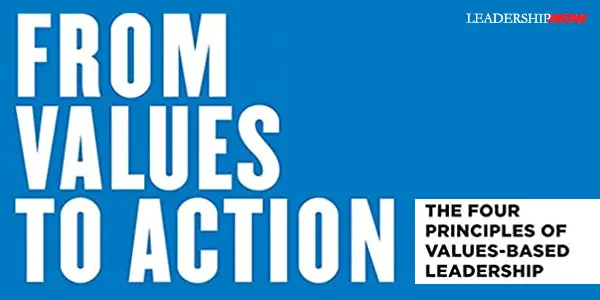
FORMER chairman and chief executive officer of Baxter International, Harry Kraemer, has written a genuine, back-to-basics book on value-based leadership: From Values to Action. He presents four interconnected principles that build on and contribute to each other: Self-Reflection is the most important and is central to your leadership. “If you are not self-reflective, how can you truly know yourself?” writes Kraemer. “If you do not know yourself, how can you lead yourself? If you cannot lead yourself, how can you possibly lead others?” Self-reflection allows you to transform activity into productivity for all the right reasons. It means “you are surprised less frequently.” It is essential in setting priorities. You can’t do everything. So reflection makes it possible to answer key questions like What is most important? and What should we be doing? in a way that is in line with your strengths and values and organizational goals. Engaging in self-reflection on a regular, ongoing basis (preferably daily) keeps you from becoming so caught up in the momentum of the situation that you get carried away and consider actions and decisions that are not aligned with who you are and what you want to do with your life. Balance and Perspective is the ability to understand all sides of an issue. Pursuing balance means you will have to grasp the fact that leaders don’t have all the answers. Kraemer says, “My task was to recognize when a particular perspective offered by one of my team members was the best answer….Leadership is not a democracy. My job as the leader is to seek input, not consensus.” Because he believes we are more effective if we balance all areas of our life, he prefers the term “life balance” over “work-life balance.” It’s not an either-or proposition. “When you identify too closely with your work, you can easily lose perspective and become unable to look at all angles in a situation.” He recommends implementing a “life-grid” to keep track of where you are spending your time and to hold yourself accountable. True Self-Confidence is know what you know and you don’t know; to be comfortable with who you are while acknowledging that you still need to develop in certain areas. (Comfortable not complacent.) Why TRUE self-confidence? There are people who adopt a persona that might make others think that they have self-confidence, but they are not the real deal. Instead, they possess false self-confidence, which is really just an act without any substance. These individuals are full of bravado and are dominating. They believe they have all the answers and are quick to cut off any discussion that veers in a direction that runs contrary to their opinions. They dismiss debate as being a complete waste of time. They always need to be right—which means proving everyone else wrong. Genuine Humility is born of self-knowledge. Never forget where you started. “Genuine humility helps you recognize that you are neither better nor worse than anyone else, that you ought to respect everyone equally and not treat anyone differently just because of a job title.”
Kraemer describes a values-based leader well: “Self-reflection increases his self-awareness. Balance encourages him to seek out different perspectives from all team members and to change his mind when appropriate in order to make the best possible decisions. With true self-confidence, he does not have to be right, and he easily shares credit with his team. Genuine humility allows him to connect with everyone because no one is more important than anyone else.” From Values to Action is an outstanding book and filled with important concepts that any would-be leader would benefit from. 
Posted by Michael McKinney at 04:13 PM
04.06.11

Onward: You Are There with Howard Schultz
Onward tells the story of a company suffering from the side effects of its own success made worse by the recent financial fiasco and what its returning CEO did about it. It’s a story of a company’s return to the why. Howard Schultz realized that by 2007, Starbucks had begun to fail itself. It was obsessed with growth and lost sight of what made it “Starbucks” in the first place—the essence of what they set out to do 40 years earlier—to inspire the human spirit. Starbucks had lost its “point of view.” He writes, “No single bad decision or tactic or person was to blame. The damage was slow and quiet, incremental, like a single loose thread that unravels a sweater inch by inch.” This is usually how we experience derailment. We wake up one day and find ourselves somewhere other than where we had planned on being. Tangents are like that. With sales and passion already slipping, the economic meltdown at the end of 2008 only made matters worse. In an inspiring and detailed narrative, Schultz tells, from his perspective, how he got the company back on track and innovated around core values. It’s a sometimes emotional look at the thinking behind what worked and what didn’t. And it is told with dignity. Onward is a valuable resource for leaders and is, for that reason alone, worth re-reading. It was interesting to watch Schultz’s leadership evolve through the process and instructive to observe how he handled the board, personalities, tough choices, frustrations, progress, and setbacks. Here are some of his thoughts: There are moments in our lives when we summon the courage to make choices that go against reason, against common sense, and against the wise counsel of people we trust. But we lean forward nonetheless because, despite all the risks and rational arguments, we believe that the path we are choosing is the right and best thing to do. We refuse to be bystanders, even if we do not know exactly where our actions will lead. 
Posted by Michael McKinney at 11:17 AM
03.25.11

The Steve Jobs Way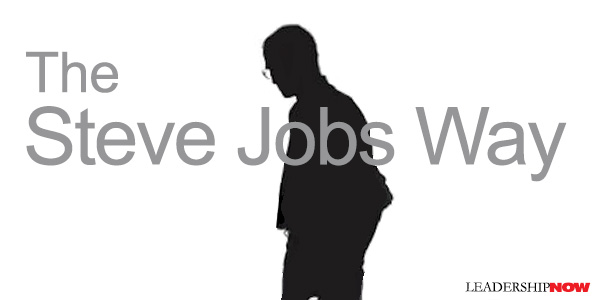
APPLE is on a roll and we want to know how Steve Jobs does it. The Steve Jobs way is, in a word, passion. Passion drives his perseverance and momentum through setbacks.
Jobs succeeds because he follows his passions. “He understands the mindset of the people he wants to create products for because he is one of them. And because he thinks like his future customers, he knows he has seen the future.” At the same time, Jobs does not rely on focus groups. That might be good for incremental change, but to “make a dent in the universe,” you need people who focus on what the experience could be. Elliot says Jobs loved to quote Henry Ford: “If I had asked my customers what they wanted, they would have told me, ‘A faster horse.’” Not only is Jobs enthusiasm infectious, but he thinks regularly about how to build enthusiasm. At Apple, meetings were driven by ideas and those who had them and were not dictated by hierarchy as in most organizations. “He knows that you have to become the product to lead well. He finds powerful ways to make certain every employee is convinced that he knows their contribution is essential to the product’s success.” Innovation is a group activity at Apple. “Imagine,” says Elliot, “working on a product so desirable that the members of the development team can hardly wait to finish it so they could each have one of their own.” One-time Apple executive Jean-Louis Gassé endorsed Steve’s management style with a memorable phrase: “Democracies don’t make great products—you need a competent tyrant.” People who worked for Steve forgave him, or at least tolerated his style, in part because, more than anything else, he was a product tyrant, totally dedicated to delivering the products he envisioned. Jobs is the ultimate user. Everything is designed around the customer experience. Former employee Donna Dubinsky recalled a decision Jobs made that illustrates this value: We were moving from 300 dpi printers to 1200 or something—some generational shift. What to do with the old inventory? You cut the price and blow them away. You make money from customers who want the bargain. From watching the Apple/Jobs split in 1985 first-hand, Elliot saw that “learning how to make yourself understand, learning how to be persuasive, is critical for a business leader.…It was an object lesson in what happens when a company does not have a cohesive product strategy and is organized functionally instead of in distinct product groups.” Elliot’s appraisal of Steve Job’s leadership is helpful for anyone wanting to get a better look “behind the curtain” from someone who was there and worked closely with Jobs. The perspective is valuable. The stories and anecdotes alone are worth the time. Elliot recounts an interview Jobs had with Daniel Morrow on what it takes to be an entrepreneur: “I think you should go get a job as a busboy or something until you find something you’re really passionate about.” He believes that “about half of what separates the successful entrepreneurs from the non-successful ones is pure perseverance. 
Posted by Michael McKinney at 07:14 AM
02.16.11

Frances Hesselbein: To Serve is To Live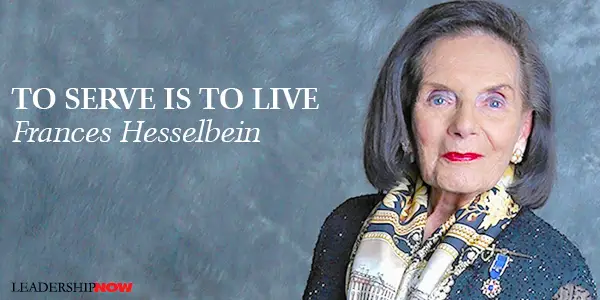
FRANCES HESSELBEIN is a remarkable leader because she doesn’t try to get others to think of her as a leader, she tries to get others to think of themselves as leaders. Reading her autobiography, My Life in Leadership, I was struck by the importance she places on inclusion, respect, civility, decency, honor, honesty and faithfulness. It’s not surprising then, that she never thought of herself as a “woman leader,” but always as “a leader who is a woman.” Hesselbein didn’t start out to be a leader, but she became one by expressing her best self in all that she did. An example for all would-be leaders to follow. Her mantra is, “to serve is to live.” Her father was her hero and when he died, she dropped out of college to help support her family. Later she married and raised a family with no intention of leaving her hometown in Pennsylvania. Later to help out, she volunteered to serve as a Girl Scout Troop leader. Eventually, as doors opened for both her and her husband, she was asked to head the Girl Scouts of the USA which she did from 1976 to 1990. From her contribution there, she was named “Best Nonprofit Manager in America” by Fortune Magazine. In 1998 she was awarded the Presidential Medal of Freedom in recognition of her exemplary leadership as CEO of Girl Scouts of the USA, her role as the founding president of the Drucker Foundation, and her service as “a pioneer for women volunteerism, diversity, and opportunity.” My Life in Leadership is full of lessons. Here are just five of the lessons she has learned along the way. I’m certain you’ll find at least one that will improve your leadership approach and thinking. “If we value diversity and inclusion, then we must ask, ‘When they look at us, can they find themselves?’ This is the powerful question that uncovers whether an organization practices what it preaches.” At the Girl Scouts of the USA, she worked hard to make sure people of all races and backgrounds could find themselves in the organization. She writes: “One of the most important parts of transforming a large and complex organization is inclusion: engaging all of the people every step of the way... Inclusion is a powerful value: when we open up the organization, dispersing the leadership, including people from across the enterprise, there is a new energy, a new synergy.” At one point she asked her staff to introduce themselves to each other at a meeting. She shares the story of a staff member that understands what it means to think like a leader—be a leader—no matter where you find yourself in an organization: “My name is Troy. I work in the mail room, and I like to think of myself as the heart of the organization. Everything that comes into the organization comes through me. Everything that goes out of the organization goes through me. I am the heart of the organization!” She adds, “Troy’s ‘heart’ brought to us new insight about the importance of every person and every position. I’ve never forgotten Troy and that moment.” When making a decision about change you can’t stall in indecision but you can’t run over people either. She explains how she handled a touchy situation and then writes: “When does the sled take off? Is the question for all leaders, knowing that we can fail if the sled leaves too early with too few people on it, or we can wait too long, and someone else will have filled the need and eaten our lunch…. It takes managerial courage to decide that it is time for the sled to take off when many are hesitant to climb on board. A leader respects their opinions and their positions, but cannot be deterred by them. Later these people may change their minds and join you, but if you act in a dismissive way that diminishes them, they never come back. Save the face and the dignity of the people who oppose the initiative. That is a key principle in managing change and mobilizing people around that change.” In 1981, at a GSA meeting, Peter Drucker told them: “You do not see yourself life size. You do not appreciate the significance of the work you do, for we live in a society that pretends to care about its children, and it does not.” Hesselbein said, “I wanted to refute this, but could think of nothing to say. Drucker continued, “And for a little while, you give a girl a chance to be a girl in a society that forces her to grow up all too soon.” Hesselbein adds, “We took him seriously.” How many of us see what we do “life size?” Hesselbein says the number one element of listening is “banish the but.” She writes: If we want people to listen, we must banish “but” from our vocabulary. How many times have we had someone tell us how well we performed—and we were feeling good about the feedback, listening carefully—then we heard “but,” and the positive, energizing part of the feedback was lost in the “but” and what followed it. “But” is nobody’s friend—listener or speaker. “And” provides the graceful transition, the non-threatening bridge to mutual appreciation, the communication that builds effective relationships. Hesselbein believes that “in the end, it’s the quality and character of the leader that determines the performance.” As President and CEO of the Peter Drucker Foundation for Nonprofit Management (now the Leader to Leader Institute), she was asked what the two most powerful messages were that he left with her. She said, “Think first, speak last” and, “the leader of the future asks; the leader of the past tells. Ask, don’t tell.” In the foreword, Jim Collins sums up well the example of Frances Hesselbein: No matter what knocks you down, you get up and go forward. You might be appalled by horrifying events, but never discouraged. You might need to deal with mean-spirited and petty people along the way but never lose your own gracious manner. You might need to confront a litany of brutal facts and destabilizing uncertainties, but it is your responsibility, as a leader to always shine a light.   
Posted by Michael McKinney at 06:00 PM
02.14.11

The Wisdom of Booker T. Washington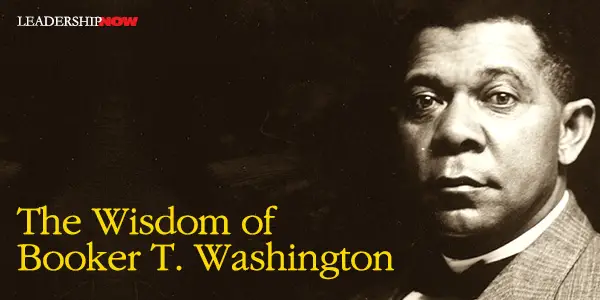 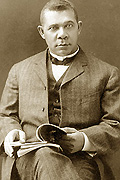 Washington was born into slavery to a slave mother and a white plantation owner in Franklin County, Virginia. He became a national figure with his Atlanta Address of 1895, in which he advocated vocational education for blacks as a way to improve race relations, making him a popular spokesperson for African-American citizens. Through the support of wealthy philanthropists, he was able to raise funds to establish and operate thousands of small community schools and institutions of higher education for the betterment of blacks throughout the South. In 1901, his popular autobiography, Up From Slavery, was first published and has been translated into many languages. On Leadership
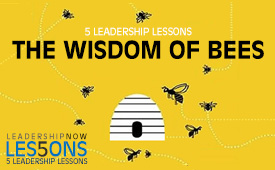 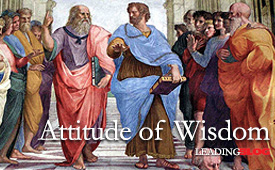
Posted by Michael McKinney at 12:44 AM
02.06.11

Ronald Reagan on Leadership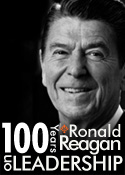 In her memoir, Personal History, the late Katharine Graham, former publisher of the Washington Post, tells a story about a dinner at her home attended by the Reagans and others in November 1988. When the Reagans arrived they were surrounded by well-wishing friends. Graham remembers that after someone knocked against a glass and spilled a drink, “I was dumbstruck,” she recalls, “at seeing the president of the United States down on his hands and knees in the middle of the crowd, picking up the ice.” Reagan possessed a servant quality that resonated with millions of people in America and abroad. On Vision:
Reagan believed that it is important for a leader to rise above secondary concerns to remain consistent and focused. His most important task was keeping his staff focused despite daily distractions. One of his aides recalled: "It was striking how often we on the staff would become highly agitated by the latest news bulletins. Reagan saw the same events as nothing more than a bump in the road; things would get better tomorrow. His horizons were just not the same as ours." James Strock sums it up well in his book, Reagan on Leadership: “As with all leaders of consequence, Reagan’s ability to lead others was an outgrowth of his ability to govern himself.” Of Related Interest:
Posted by Michael McKinney at 12:15 PM
12.27.10

“If they do that, I don’t consider them a leader.”We need to get over the notion that a leader is a perfect person with a set of qualities that are balanced and in perfect alignment. And to be less makes you, you know … a manager. If that were the case we might as well forget about being a leader. We’re just not up to it. And yet life goes on and people do lead—in spite of themselves. And their humanity gives us all hope that we too can lead, influence, have an impact, and create meaning.A good leader is a person that knows their weaknesses, makes (sometimes really stupid) mistakes, admits them, makes an effort to do better, and moves on. In spite of their own inadequacies they jump back in every day and work for a cause bigger than themselves. The challenge is not in avoiding mistakes; it is in knowing how to deal with them when they are made. A good leader knows they can’t do it on their own. They have limitations. They need the support and effort of those around them. In fact, they put people on their team specifically because they are lacking in one area or another. A leader doesn’t let their weaknesses hold them back. A good leader understands that leadership development is a life-long process of continual learning; continual improvement. Being a leader isn’t a place you arrive at. It’s is something you grow into and grow with if you are going to be effective. Leadership without growth is not sustainable. If you are in it for the long-term, you have to be teachable, not perfect. Perfection doesn’t qualify you as a leader, but knowing what to do about your inadequacies, foibles, quirks, weaknesses, and blunders makes it possible.
Posted by Michael McKinney at 12:19 AM
11.16.10

Decision Points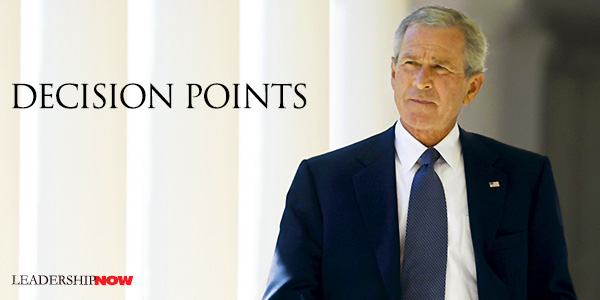
LEADERSHIP matters because we have choices. Leaders expose our choices and provide depth to our horizons. It is fitting that President George W. Bush’s book is about choices. The world changed after 9/11 and became increasingly uncertain and lacking precedent. While not intended to be an exhaustive biography, Decision Points does describe what it was like for George W. Bush to serve as president. More importantly, it is an account relating how he made the key decisions he made during his presidency. He writes, “Throughout the book, I describe the options I weighed and the principles I followed. I hope this book will give you a better sense of why I made the decisions I did. Perhaps it will even prove useful as you make choices in your own life.” Whether you agreed with him or not, it is enlightening to see the issues from his point of view. A point of view most of us will never have. It reminds me of a line from the TV series 24 by Noah Daniels the acting President of the United States, “You know Tom, it’s easy to think you’ve got all the answers when none of the ultimate responsibility lies with you. But sittin’ in this chair.… Until you sit in this chair, you don’t know anything.” President Bush covers among other things, in nearly 500 pages, the decision to quit drinking, stem cell research, 9/11, Afghanistan, Iraq, the Surge, counterterrorism programs, Katrina, his freedom agenda, and the financial crisis. Reflecting on his eight years, he writes, “After the nightmare of September 11, America went seven and a half years without another successful terrorist attack on our soil. If I had to summarize my most meaningful accomplishment as president in one sentence, that would be it.”Here are several excerpts: • In the presidency, there are no do-overs. You have to do what you believe is right and accept the consequences. • Quitting drinking was one of the toughest decisions I ever made. Without it, none of the others that follow in this book would have been possible. Yet without the experiences of my first forty years, quitting drinking would not have been possible either. • The summer of 2006 was the worst period of my presidency. I thought about the war constantly. … Most of all, I thought about our troops. I tried to imagine how it would feel to be a twenty-year-old on the front lines, or a military mom worrying about her son or daughter. The last thing they needed to hear was the commander in chief whining about how conflicted he felt. • One of my favorite books is the fine historian David McCullough’s biography of President Harry Truman. I admired Truman’s toughness, principle and strategic vision. “I felt like the moon, the stars, and all of the planets had fallen on me,” he said when he took office suddenly in the final months of World War II. Yet the man from Missouri knew how to make a hard decision and stick by it. He did what he thought was right and didn’t care much what the critics said. • That is the nature of the presidency. Perceptions are shaped by the clarity of hindsight. In the moment of decision, you don’t have that advantage. • One of the lessons I took from [Theodore] Roosevelt and Reagan was to lead the public, not chase the opinion polls. I decided to push for sweeping reforms, not tinker with the status quo. • Self-pity is a pathetic quality in a leader. It sends such demoralizing signals to the team and the country. …In the presidency, as in life, you have to play the hand you’re dealt. • The nature of the presidency is that sometimes you don’t choose which challenges come to your desk. You do decide how to respond. … As I hope I’ve made clear, I believe I got some of those decisions right, and I got some wrong. But on every one, I did what I believed was in the best interests of our country. Regarding Iraq, Bush writes, “Years from now, historians may look back and see the surge as a foregone conclusion, an inevitable bridge between the years of violence that followed liberation and the democracy that emerged. Nothing about the surge felt inevitable at the time.” It’s easy to overlook the thought that lead to the decisions made. Of Related Interest: 
Posted by Michael McKinney at 02:12 AM
11.12.10

30 Surprising Facts About George Washington IN Washington: A Life, Ron Chernow calls Washington “the most famously elusive figure in American history.” In 928 pages—the longest single-volume biography of Washington ever published—Chernow wants to render George Washington real and credible. And he succeeds. Chernow offers these facts about George Washington. 
Posted by Michael McKinney at 05:50 PM
11.02.10

Political Leadership and Compromise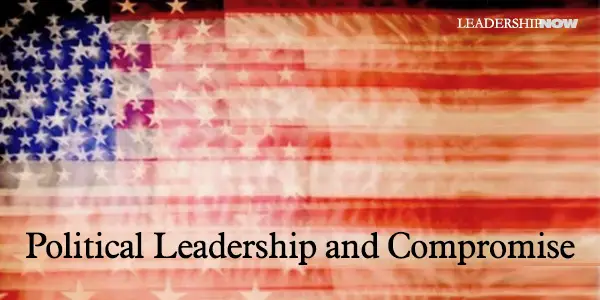
ON ELECTION DAY our minds turn to political leadership. Men and women are elected with the expectation that they will honor commitments they have made to the voters. This often leads politicians to take a short-term view of almost everything. At the same time, plagued by reality, a politician (or any leader for that matter) may find that they have to change direction or offer a compromise. This leads to the “disconnect” we frequently have with political leaders. The problem facing politicians is that reality doesn’t sell. (And of course, we play a hand in that.) So frequently, what gets them into office is not the approach that will get the job done. It is a dilemma all leaders face. It’s a dilemma that requires a certain degree of wisdom. Prudent flexibility, adaptability, and compromise are necessary qualities for leadership. Yet we often hold in high esteem leaders who don’t back down more than those that compromise their position. No one wants to be viewed as weak. But a leader that will not change or even listen to the need for change can cause irreparable damage. It’s easy to get lulled into a sense of our own permanence. We must remember that leadership is temporary. It is a sacred trust that we hold for only a short time. The skill is in understanding what one can be flexible about and what one should not. We should never compromise principles, but approaches (even the proper understanding of how those principles are applied) may need to be adapted. Values and approaches are distinct from universal laws and principles and are derived from them. The former may change; the latter never does. The fact too remains, that we may be wrong, our perceptions might be faulty and our assumptions may be without foundation. When faced with the facts, we need to be able to change direction and chart a new course without losing sight of the ultimate goals. Stefan Stern recently wrote in an excellent post on knowing when to shift your position: “If you are heading full speed ahead for the rocks it is time to change direction….Good leaders adapt to changed circumstances, and admit it when they have made a mistake.” In the introduction to Profiles in Leadership—an excellent collection of essays on leadership—biographer Walter Isaacson shares a historical perspective on compromise: The greatest challenge of leadership is to know when to be flexible and pragmatic, on the one hand, and when it is, instead, a moment to stand firm on principle and clarity of vision. Even the best leaders get this wrong sometimes. I learned this when writing a biography of Franklin. His instinct was to try to balance the conflicting values that were at issue during moments of tough debate and to find common ground. At the Constitutional Convention, he was, at eighty-one, the elder statesman. During that hot summer of 1787, the rivalry between the big and little states almost tore the convention apart over whether the legislative branch should be proportioned by population or with equal votes per state. Finally, Franklin rose to make a motion on behalf of a compromise that would have a House proportioned by population and a Senate with equal votes per state. “When the table is to be made, and the edges of the planks do not fit, the artist takes little from both, and makes a good joint,” he said. “In like manner here, both sides must part with some of their demands.” His point was crucial for understanding the art of true political leadership: Compromisers may not make great heroes, but they do make great democracies. 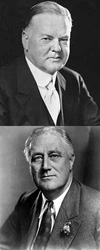 FDR on the other hand was not as well regarded and was mostly known for his connections and family background. “In the end, however,” writes Brinkley, “Herbert Hoover left the white house thoroughly discredited, repudiated, even hated, while Franklin Roosevelt was revered by much of the world when he died in office.” The difference was flexibility. Hoover was “A victim of his convictions, convictions that seemed to him close to absolute….Hoover’s unshakable principles shackled him time and again in his effort to deal with the Depression.” On the other hand, the quality that separated Roosevelt “most decisively from Hoover, was his pragmatic, experimental nature.” The contrast between Hoover and Roosevelt, Brinkley concludes, “suggests that leadership cannot succeed through ideals and strong convictions alone. The world is a complicated and ever-changing place, and a great leader must be capable of adapting to change and understanding the diversity of the ideas and principles that shape history.” Roosevelt was more successful in guiding the United States through the two greatest crises of the twentieth century, “in part because his values were appropriate to his time but also because he understood that values must reflect the realities of his age.” 
Posted by Michael McKinney at 10:21 AM
07.29.10

Whom Do You Need to Thank? The Unsung Heroes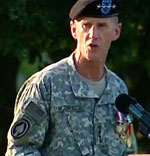 Annie's here tonight. No doubt she walked the 50 feet from our front door in cute little Italian shoes of which we have an extensive collection. (Laughter) In Afghanistan, I once considered using Annie's shoe purchases as an argument to get Italy to send additional forces. (Laughter) But truth be known, I have no control over that part of the McChrystal economy. (Laughter)Whom do you need to thank?
Posted by Michael McKinney at 02:10 PM
06.07.10

John Wooden: It Takes a lot of Strength on the Inside to be Gentle on the Outside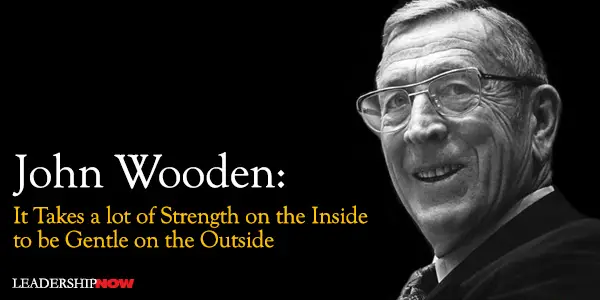
I FIRST MET John Wooden (October 14, 1910 – June 4, 2010) in the early eighties when working on a presentation product for his pyramid of success. He truly was a legendary teacher who based his life on sound principles. As with nearly everyone he came into contact with, he had a positive influence. Not surprisingly, his Dad, Joshua Wooden, took the time to lay a firm foundation for him. Upon his graduation from Centerton Grade School, his Dad gave him a card with seven suggestions to follow:
In his book, The Essential Wooden, John Wooden tells a story of his Dad’s leadership to illustrate the point that it takes a lot of strength on the inside to be gentle on the outside. It’s a good lesson for all of us: Scattered around the farmland where I grew up in Centerton, Indiana, were gravel pits. The county would pay local farmers to take a team of mules or horses into a pit and haul out loads of gravel for use on Morgan County roads. Some of the pits were deeper than others, and it would be tough for a team to pull a wagon filled with gravel out through the wet sand and up a steep incline. 
Posted by Michael McKinney at 12:50 PM
05.31.10

General Douglas MacArthur's Principles of LeadershipGeneral Alexander M. Haig, the former Secretary of State who served in SCAP (Supreme Commander for the Allied Powers) headquarters during the occupation of Japan and in Korea, recalls a story of MacArthur's style of leadership as a young Brigadier in World War I:He was in the trenches with a unit that had to seize some ground and it was a very difficult task of leaping out of the trenches and charging through machine gun fire to the objective and said to the young officer in command, he said, "Young man, if you do this and you seize those enemy positions, I'm going to give you a Silver Star." And, the young fellow looked at him. He said, "No, come to think of it," he said, "I know you're going to do it," and he pinned the silver star on the young officer's chest and needless to say, that young fellow charged at extra speed to the objective at the other end. So, this was the kind of leadership that Douglas MacArthur exercised.MacArthur's confidence was derived from the depth of his convictions. William Addleman Ganoe recalled in his 1962 book, MacArthur Close-up: An Unauthorized Portrait, his service to MacArthur at West Point. During World War II, he created a list of questions with General Jacob Devers, they called The MacArthur Tenets. They reflect the people-management traits he had observed in MacArthur. Widely applicable, he wrote, “I found all those who had no troubles from their charges, from General Sun Tzu in China long ago to George Eastman of Kodak fame, followed the same pattern almost to the letter." 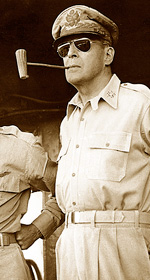
Posted by Michael McKinney at 09:27 AM
05.30.10

Why is the Essence of Leadership So Hard to Grasp?Why is the essence of leadership so hard to grasp? In The Leadership Illusion, authors Tony Hall and Karen Janman attribute it to the way in which we view leaders. We tend to over-emphasize character and underplay context. This gets to the heart of the leadership illusion: seeing leaders and leadership in one dimension. We ignore the context. When we evaluate the causes of the success or failure of leaders, we tend to “focus predominantly on the individual (sometimes the context), but very rarely both at the same time. The need to see someone as “fabulously successful or woefully inadequate” is strong. This causes us to underestimate the importance of context and connections when thinking about leaders and leadership. Leadership is not a solo performance.The leadership illusion also influences how we predict leaders and train for leadership. When examining what makes for successful leadership we search for personal attributes and tend to ignore their context and connections. This caused Harvard professor Richard Chait to refer to some leadership researchers as organizational meteorologists. “His view being that we have as much a chance of predicting whether it will rain or shine three weeks hence as we have of reliably finding ourselves a suitable leader.” They write, “There are some aspects, some attributes, of an individual that make them successful as a leader. But we need to evaluate the person and the context in order to be clearer about whether what we perceive is real or illusory.” Additionally, leaders should not be developed not in a vacuum but in the context within which they are to lead and in an environment that is fully supportive of that. “It doesn’t matter how effective a development technique may be in improving individual skills, if the organizational context is not supportive or consistent with the skills you have developed, the learning is likely to have little impact….There are far too many organizations that invest significant time and money in developing their people, but forget to develop or change the organization in tandem.” Do we develop strengths or weaknesses? “Our view is that you work on the skills and abilities that you need in order to perform effectively in your context….the end result being that development may encompass both strengths and weaknesses, as long as they are relevant to performance.” The demand placed on us by living in such a connected world, has lead Hall and Janman to the concept of network leadership. Relationships matter. Developing the right kind of social capital is an increasingly important function for effective leaders. What kind of social capital to develop is context dependent. Network leaders “bridge and they bond. They exhibit a balanced form of leadership that mixes the old with the new; combine radical approaches with received wisdom; and develop both breadth and depth of relationships.” Leaders are not independent entities. Leaders do not exist by themselves in organizational space, but are spatially extended (through their networks). In this way the concept “individual leader” loses its meaning. … The network thus becomes an irreducible element of physical description.
Posted by Michael McKinney at 08:00 AM
04.23.10

Theodore Roosevelt’s The Man in the Arena Speech 100th Anniversary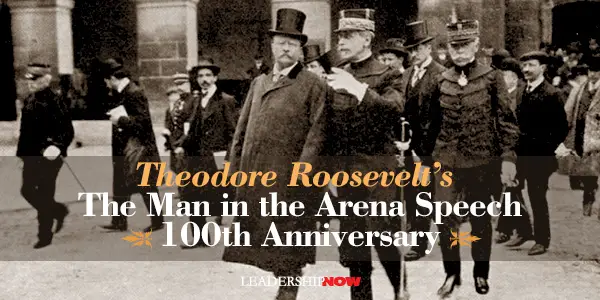  The speech emphasized his belief that the success of a republic rested not on the brilliance of its citizens but on disciplined work and character; the quality of its people. He told the audience: “Self-restraint, self-mastery, common sense, the power of accepting individual responsibility and yet of acting in conjunction with others, courage and resolution—these are the qualities which mark a masterful people.” And importantly, a democracy needed leaders of the highest caliber in order to hold the average citizen to a high standard. They were to do this not by words alone but by their deeds as well. “Indeed, it is a sign of marked political weakness in any commonwealth if the people tend to be carried away by mere oratory if they tend to value words in and for themselves, as divorced from the deeds for which they are supposed to stand.” Roosevelt firmly believed that one learned by doing. It is better to stumble than to do nothing or to sit by and criticize those that are “in the arena” he explained. “The poorest way to face life is with a sneer.” It is a sign of weakness. “To judge a man merely by success,” he said, “is an abhorrent wrong.” The famous paragraph from that speech, reproduced below, expressed the standard by which he judged himself and others: It is not the critic who counts; not the man who points out how the strong man stumbles, or where the doer of deeds could have done them better. The credit belongs to the man who is actually in the arena, whose face is marred by dust and sweat and blood; who strives valiantly; who errs, and comes short again and again, because there is no effort without error and shortcoming; but who does actually strive to do the deeds; who knows the great enthusiasms, the great devotions; who spends himself in a worthy cause; who at the best knows in the end the triumph of high achievement, and who at the worst, if he fails, at least fails while daring greatly, so that his place shall never be with those cold and timid souls who know neither victory nor defeat. Read the complete text of that speech: Citizenship in a Republic by Theodore Roosevelt Trivia: Theodore Roosevelt was the first President to fly an airplane, to own a car, to have a telephone in his home and travel outside the borders of the U.S. while still in office.
Posted by Michael McKinney at 12:39 AM
04.21.10

Mark Twain on Leadership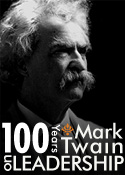 It could be said that he believed in Management By Wandering Around. In his autobiography he wrote, "In religion and politics people's beliefs and convictions are in almost every case gotten at second-hand, and without examination, from authorities who have not themselves examined the questions at issue but have taken them at second-hand from other non-examiners, whose opinions about them were not worth a brass farthing." Firsthand knowledge is a competitive advantage.
Posted by Michael McKinney at 07:07 AM
02.15.10

George Washington: It’s Never too Early to Choose to LeadGreat leadership doesn’t just happen. Great leaders are revealed in extraordinary circumstances, but they are made long before. A person’s quality of leadership radiates from their character. Consequently, it’s never too early to begin your leadership development. By age sixteen, Washington had copied out by hand, 110 Rules of Civility & Decent Behavior in Company and Conversation. They are based on a set of rules composed by French Jesuits in 1595. The first rule sets the tone of the others that follow: “Every Action done in Company, ought to be with Some Sign of Respect, to those that are Present.” There isn’t a leader that wouldn’t benefit from a daily reminder of this approach. Time and time again, these rules from his childhood played out in the conduct of his public life and defined his reputation. These rules and his concern for them integrated him as a leader and bonded him with those he led. George Washington’s father died when he was eleven leaving him to be raised by his older brother Lawrence. By age fifteen his formal schooling was over and he had achieved the equivalent of only a grade school education. But his education never stopped. Washington was an avid reader, soaking up the works of historians and thinkers. He was especially drawn to the essays of the Roman philosopher Seneca and Joseph Addison’s play Cato with its lesson in selfless leadership. He studied the ideas of his contemporaries in writings and conversation. He also spent a good deal of time writing which helped to solidify his thoughts. Learning is more than discovery. It helps us to make sense of things. It’s more than collecting information—it is applying it in a constructive way to some area of our life. It is the mindset of a leader to work on themselves harder than they work on others. A leader’s first responsibility is governing themselves. Historian Gordon Wood has written, “Washington became a great man and was acclaimed as a classical hero because of the way he conducted himself during times of temptation. It was his moral character that set him off from other men.” Leadership is embodied in the way you look at the world and respond to it. It’s never too early to choose to lead.
Posted by Michael McKinney at 02:45 PM
02.10.10

Leaders Make Connections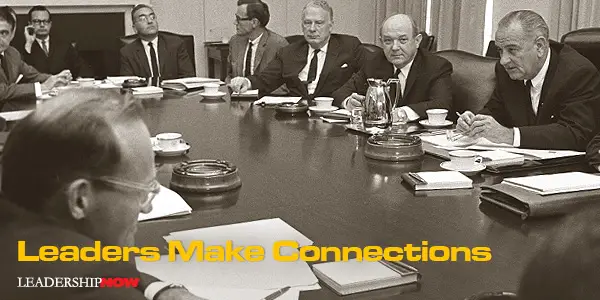
THE Financial Times ran an excellent analysis on February 3rd by Edward Luce concerning the very tight inner circle—just four people—that Mr. Obama relies on for advice. In America: A Fearsome Foursome, Luce advocates a broader circle of advisers and notes, “To be successful, presidents need to separate the stream of advice they get on policy from the stream of advice they get on politics.” Intellectually we know that we need to get their advice and information from a wide variety of sources. In practice, however, it doesn’t always happen. We like to talk to those with whom we are comfortable with and share our views. It’s very reassuring. But dangerous. Dangerous because it clouds our vision and makes us less agile. More importantly, seeking the opinions of others helps to make them feel a part of a larger purpose, connected to the leader and a part of a community. This points to a basic function of leadership: to make connections. 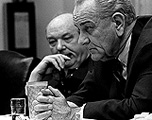 Treasury Secretary Henry Fowler, shrewd, effective, a superb negotiator, but somewhat shy of Lyndon Johnson, would occasionally feel in need of a presidential laying on of hands even when he had no serious presidential business. After one such occasion—it had ended with Fowler, sitting on the edge of the Oval Office loveseat, reading in monotone from his own memo on the floor in front of him, while the president was plucking yellow news tickers from the ticker machine at the opposite end of the Oval—LBJ turned on me, angrily: “What on earth did you bring him in here for, wasting my time ...” and so forth, but then stopped himself mid-sentence. “No, I’m wrong. Make me see him when he asks even if he has no real business! While you staff fellows are safe in the White House, these cabinet fellows are out there every day being shot at, on the Hill, in the papers, on TV. They are my field generals. Never forget that. They’ll be useless to me if they don’t feel connected to me. Always treat them with dignity.” A leader’s position is in the middle; to share and connect. In a world bent on differentiation, leaders must make connections.
Posted by Michael McKinney at 12:00 AM
11.17.09

Derailed: Five Lessons Learned from Catastrophic Failures of LeadershipDerailed is about the traps you and I can fall into. Sometimes they are the result of the sense of entitlement that leaders can fall prey to. Sometimes they are the result of thinking and behavior that has worked (we think) in the past, so why change it now? Sometimes they are the overuse of a strength that we have yet to discipline. Sometimes we don’t even have a clue, and so we get derailed and go around blaming others and asking, “Why me?”It can happen to anyone. And it is something we have to constantly be sensitive to because these traps are character issues that can disqualify us from leadership. Author Tim Irwin writes, “No matter how brilliant, charming, strategic, or commanding in presence a leader is, the consequences of a failed character are extraordinarily disabling and will bring down even the strongest among us. Similarly, if our character is inadequate, eventually, we will miss the warning signals and slam into a parked freight train.” To illuminate the impact and nature of derailment, Irwin profiles six leaders who, either through arrogance, lack of self-awareness, a sense of entitlement, greed, self-discipline, or a combination of any or all, derailed. Derailment is a process. Irwin suggests that there are five stages: a failure of self-/other-awareness, hubris, missed early warning signals, rationalizing, and finally, derailment. A lack of self-awareness is the foundation of all derailments. These are all issues of character. And stressful times only make us more of who we already are. Authenticity, self-management, humility, and courage are dimensions of character that, when properly developed, help us to avoid derailment. We can only be as good a leader as the character we possess. Derailment is not inevitable, but without attention to development, it is probable. He writes, “Derailment is especially rooted in the failure to prepare, to grow personally and professionally, and to develop the qualities needed to stay on track…. Attention to our development means we must be constantly alert and self-aware and have a lifelong commitment to learn, to grow, and to prepare.” To combat derailment you need to adapt five habits says Irwin. First, you need to develop a habit of openness. “Openness to feedback reflects our interest in being a learning, growing person.” Second is the habit of self-/other-awareness. “It is critical that we regularly tune into how others see us.” When we find a big difference, we have a blind spot that needs to be addressed.
We also need to develop a habit of accountability. “The leaders most susceptible to derailment refuse to have their opinions, decision, and actions questioned…. Accountability means that, even when we are not required to answer to others because of our position or corporate policy or law, we intentionally place ourselves in a relationship with someone who tests our motives and our actions.” Finally, is to develop the habit of resiliency. “Resiliency is the ability not only to bounce back from adversity but also to grow from it.” A clear sense of purpose widens our perspective and helps us to become more resilient. Sometimes, we need a wake-up call to finally deal with our own issues. But we can learn vicariously. And that’s the best way to learn if we have the discipline. Tim Irwin’s book is a great place to begin. A guide for asking the hard questions. Of Related Interest: 
Posted by Michael McKinney at 12:30 PM
11.02.09

Nestlé's Paul Bulcke on Staying the CoursePaul Bulcke became chief executive of Nestlé SA in April 2008. An inauspicious time to take over the world's largest food company. Deborah Ball reports on an interview with Bulcke. In the short (2:35 min) video embeded below, he reflects on being authentic, developing a culture of competitive intensity and making people feel they have ownership.He says, “If your strategy is right, stick to the strategy. Maintain your inspiration which is long term, but do act short term.” Here is a brief excerpt from the article: WSJ: What is the worst piece of management advice you've received on how to deal with a downturn?Bulcke adds, “We are a long-term company. We are not going to do what I sometimes call "Hoopla" management, and do something damaging. We will be responsible.” Of Related Interest:
Posted by Michael McKinney at 09:53 AM
08.11.09

Ten Lessons on the Meaning of Political Greatness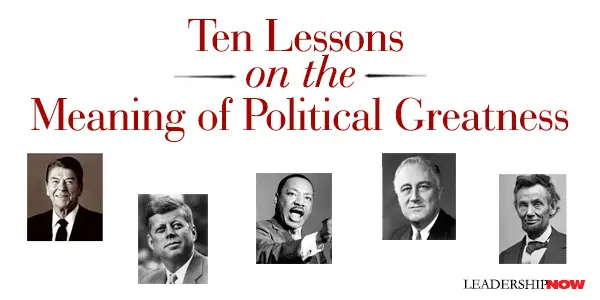
WALTER NEWELL plumbs the depths of history in The Soul of a Leader, “in order to illuminate the recent past, the present, and the challenges to come. Taken together, while they not add up to a recipe for the perfect leader, they at least show how moral, psychological, and intellectual resources we inherit from the traditions of the West, its experiences and its reflections on statecraft from ancient times onward, can give us a compass for the challenges America’s next generations of leaders will inevitably face.”

Posted by Michael McKinney at 03:25 PM
07.06.09

Letters from Leaders: Advice for Tomorrow's Leaders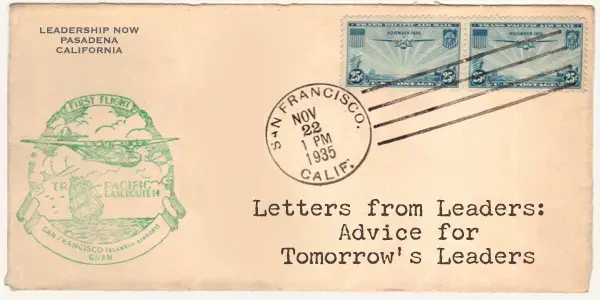
OVER A PERIOD of seven years Henry Dormann has compiled 77 letters from political, religious and business leaders targeted at motivating young leaders and teaching them what is needed to be great. The advice and stories found in Letters from Leaders gives you a lot to think about. Here are a few thought starters: King Abdullah II of Jordan offers this encouragement to those in any walk of life that are making the commitment to lead:

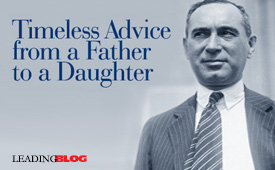 
Posted by Michael McKinney at 02:12 AM
06.18.09

What History Can Teach Us About Leadership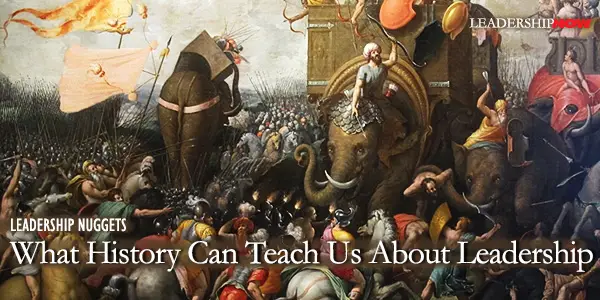
 A couple of years ago while browsing in a local bookstore in Naples, Florida, for something interesting to read, I came across Hannibal Crosses the Alps by John Prevas. It’s the story of the ancient Carthaginian commander who accomplished something that neither his allies nor his enemies thought possible: He led an army, including horses and elephants, over the Alps in winter and then defeated his Roman adversaries in their own backyard. As I reviewed the book in Forbes magazine, two thoughts occurred to me about leadership: (1) Anyone who accomplishes something great, something unique, whether in business or in politics, often does so by defying the conventional thinking of his time. (2) Even though more than two thousand years have passed since Hannibal crossed those Alps, the elements of what it takes to be a successful leader have not changed. They are simple and obvious, or should be: motivating those who follow you to share your vision; inspiring through example; a sense of duty and responsibility to those who trust and depend on you; the capacity to see a problem and the skill to fix it; developing and maintaining a proper perspective on yourself in the face of success or adversity; setting and achieving goals; understanding people’s limits and knowing when to drive hard and when to ease up on both subordinates and competitors. The ancient Greeks tell us that nothing is more important than good leadership for the harmonious functioning of society and nothing hurts more than the lack of it. Our times cry out for leadership— political, financial, and even ethical. Many people are asking today, “Where have the good leaders gone?” In a recent New York Times column about global gridlock entitled “Missing Dean Acheson,” David Brooks posed this question, noting that Americans are about to enter their nineteenth consecutive year of Truman envy. Ever since the Berlin Wall fell in 1989, Brooks observed, people have yearned for a return to a time when leaders such as Harry Truman and George C. Marshall were able to create successful, forward-looking global institutions and policies to confront the challenges that faced America at the end of the Second World War. Brooks asked, “Why can’t we rally that same kind of international cooperation to solve our current economic crisis, confront terrorism, slow down global warming, limit nuclear proliferation, and a host of other pressing problems today?” Ours is a complex and stressful time. We face the most serious financial crisis since the Great Depression of the 1930s and foreign policy issues that if left unsolved could bring us to the brink of nuclear war. Rising new powers in the world today, such as China and India, are changing traditional Western ways of conducting worldwide politics and business. Old powers such as Russia and the members of the relatively new Europe and Union are seeking to advance their influence in the international community. Responses to these developments require effective leadership. The financial crisis and America’s recent foreign policy setbacks can be traced directly to a failure of leadership. But where do we turn for leadership, and what do we want in our leaders? History is one place to look. The past is filled with leaders who possessed extraordinary capabilities, enjoyed tremendous success, and directed societies that experienced problems similar to our own. Their successes and failures as leaders can help us develop a valuable perspective as we grapple with our problems and try to prepare for the future. Similarities between those who ruled the empires of the ancient world and many of today’s corporate and political leaders are remarkable. Times and circumstances may change, but the principles of sound leadership do not. Adapted from Power Ambition Glory: The Stunning Parallels between Great Leaders of the Ancient World and Today . . . and the Lessons You Can Learn by Steve Forbes and John Prevas. Based on an extraordinary collaboration between Steve Forbes, chairman, CEO, and editor in chief of Forbes Media, and classics professor John Prevas, Power Ambition Glory provides intriguing comparisons between six great leaders of the ancient world and contemporary business leaders.
Posted by Michael McKinney at 12:15 AM
06.05.09

Newswire: Herbert Hoover and His Times
Posted by Michael McKinney at 07:22 AM
04.14.09

The Making of a Leader: Jamie DimonIt is not surprising that The House of Dimon by Patricia Crisafulli is full of praise for JPMorgan CEO Jamie Dimon. When the financial crisis hit, Dimon was the only CEO ready to answer the call for help. As the book brings out, this can only come from preparation and his philosophy of “doing the right thing” no matter what the short-term cost.His success has put him on a pedestal, which is not a comfortable place to be in this day and age. He told CNBC, “The pedestal is a terrible place to be…. I almost want to get knocked off the pedestal so I don’t have to hear this any more.” Too often, when we look at someone on a pedestal we make the mistake of assuming perfection and expect uninterrupted success. This is a mistake as it leaves no room for growth – theirs or ours. People find themselves on pedestals because they live lives of continual growth. When they make a mistake – as they eventually do – we like to discount everything that came before it and go off in search of a make-believe land where everything always comes out right. It doesn’t exist. If we do this we short-change ourselves and miss the appropriate lessons to apply in our own lives. Dimon has been tried and tested and has succeeded. Fortunately this provides us with ample opportunity to glean valuable lessons in leadership and in running a business. His thinking and methodology has lessons we can all use to make our lives and leadership more effective. Here are some: The Credit Crisis: “I think you’re going to be writing and learning from this for years: cases and books about different things from SIVs to accounting to the business purpose of CDO-squareds to regulatory rules to globalization to the balkanization of regulation…. Honestly, I think if you made a list today, you probably wouldn’t get half of them. We’re in the thick of it.” Lessons Learned: “Experience and judgment—I don’t think they’re replaceable. You go to a lot of businesses—they don’t remember how bad things can get. It takes someone who has been there. We will never forget the aftermath of the housing bubble, but 40 years from now, believe me, someone is going to forget again somewhere.” Dealing with the Downside: “Look where you could be wrong; admit when you’re wrong. To me it’s important to do that because I want everybody to do that, so that we actually make a better decision the next time.” Buying Bear Stearns: “We weren’t looking to buy Bear Stearns. We wouldn’t have bought it on its own, but we were asked to look at it. We knew the financial system was extremely delicate and Lehman [Brothers bankruptcy] helped prove that.” The Bear Stearns Negotiations: “The amazing story wasn’t the financial engineering. After I got the call from [Bear Stearns CEO] Alan Schwartz, I called [JPMorgan Investment Bank co-CEOs] Steve Black and Bill Winters, and then we had 50 or 100 people get dressed and come back to work. And by 12 hours later, there were 500 and 1,000 people working on it in every department: bond trading, equity, equity derivatives, all these areas—tax, legal, compliance, systems, ops [operations]—everyone doing their job. And that’s the amazing kind of thing: people acting that way—just trying to figure it out very quickly. That really enabled us to do [the Bear Stearns deal]. And then the comfort that when we bought the company we could actually manage all that.” Loyalty: “If you walk into my office and say, ‘Jamie, I’m loyal to you,’ it makes me nervous. I want you to say, ‘I’M loyal to the company … or the principles … what we’re trying to build,’ not to the individual, and I think it’s a very important distinction.” Risk Disclosure: “If you wouldn’t treat your mother that way, don’t treat the client that way. If this piece of paper tells the client how much risk they’re taking and you don’t want to give it to them, they’re probably taking on too much risk. Give them the paper.” Financial Discipline: “You’ve got to have disciplined reporting and a disciplined review of [what’s] reported. And then it’s got to be widely shared with smart people who also have experience and judgment. You will minimize problems. You’ll still have them, by the way, but they should hopefully be smaller and fewer.” Being Prepared: “Always have a column called ‘worst ever’ and make sure you can survive under that.” Life Priorities: “My children, my family—but especially the children I’m responsible for, even though they’re kind of on their own… They’re way up here. Right next to that is humanity. Honestly, we’re not all here just for ourselves.” Marriage and Children: “I do think that the hardest things to do in life are marriage and kids. They are like complete secrets until you do it. We teach you everything, but we don’t teach you that… You’ve got to work [at] those things.”
Posted by Michael McKinney at 11:31 AM
10.22.08

Herb Kelleher: My Best Lesson in Leadership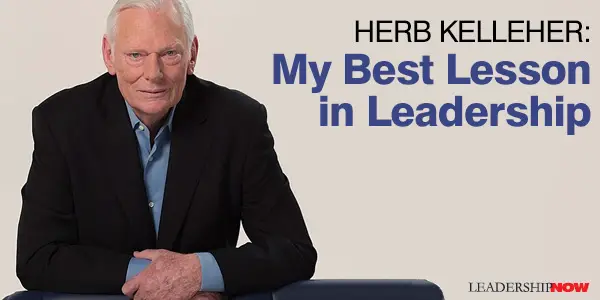
HERB KELLEHER, founder and Chairman Emeritus of Southwest Airlines was asked, "What's the secret to building a great organization? How do you sustain consistent growth, profits, and service in an industry that can literally change overnight? And how do you build a culture of commitment and performance when the notion of loyalty -- on the part of customers, employees, and employers—seems like a quaint anachronism? He said, “I can answer basically in two words: be yourself.” My best lesson in leadership came during my early days as a trial lawyer. Wanting to learn from the best, I went to see two of the most renowned litigators in San Antonio try cases. One sat there and never objected to anything, but was very gentle with witnesses and established a rapport with the jury. The other was an aggressive, thundering hell-raiser. And both seemed to win every case. That's when I realized there are many different paths, not one right path. That's true of leadership as well. People with different personalities, different approaches, different values succeed not because one set of values or practices is superior, but because their values and practices are genuine. And when you and your organization are true to yourselves—when you deliver results and a singular experience—customers can spot it from 30,000 feet.
Posted by Michael McKinney at 12:14 AM
09.28.08

Fixing the Financial Crisis Once and For All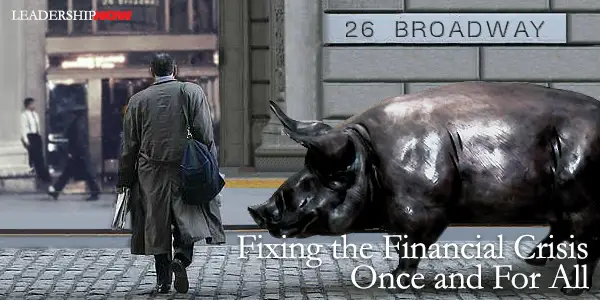
HOPING TO SOUND like leaders, Washington lawmakers want to get to the bottom of this financial crisis and create regulations to keep it from ever happening again. I don’t think it comes as any surprise to anyone that greed—on the part of both borrowers and lenders—is at the bottom of it. You can’t regulate greed out of existence. Regulation just improves creativity. Greed is regulated by character. Character is built at home, in our schools, in our churches, and yes, in our businesses. No one likes to talk about character because it isn’t a quick fix, it often goes against our inclinations, it’s not immediately measurable, you can’t take credit for it, and it’s a time consuming, never-ending process. George Eliot wrote in Middlemarch: “Character is not cut in marble; it is not something solid and unalterable. It is something living and changing.” It’s built-in individuals day by day in little, almost imperceptible ways over the course of a lifetime. The problem is that we have only given a patronizing nod to character and politely moved on with the business at hand. How will I get mine if I don’t play it like everyone else? We learn too late, without character, no one gets anything. 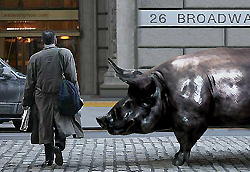 In July, Hugo Dixon opined in the Wall Street Journal, “Greed for higher returns entices investors to take risks; fear causes them to avoid excess. When markets are healthy, the two are finely balanced. Problems emerge when that balance is lost.” You will find character behind this balancing act. Character stabilizes both people and markets. Character is inseparable from the culture in which it is formed. Nothing will fix the financial crisis once and for all, but character will regulate it. Greed is a human issue and it will always be with us. It will always be something we need to train ourselves, our children, and our employees to regulate from within. The consequences can be devastating. Apparently, Mr. Gekko, greed is not good. Lou Mannheim was right, “The main thing about money, Bud, is that it makes you do things you don't want to do.” Or shouldn’t do.
Posted by Michael McKinney at 11:04 AM
09.26.08

Richard Branson: There Is No Reverse Gear On This Thing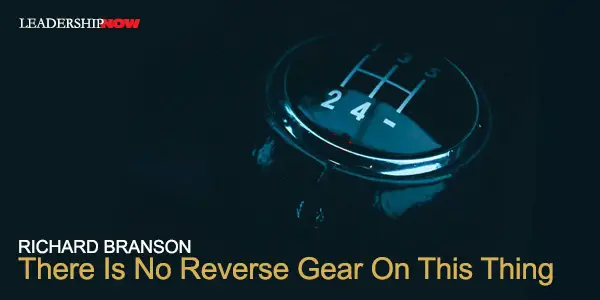
RICHARD BRANSON is the quintessential entrepreneur. Business Striped Bare is his candid account of what the Virgin companies are all about—what they hoped to do, what they actually did, how they got where they are, and why it matters. He shares the experiences and key principles that have brought him success (or not, and what he has learned from it). He explains: There are many ways to run a successful company. What works once may never work again. What everyone tells you never to do may just work, once. There are no rules. You don’t learn to walk by following rules. You learn by doing, and by falling over, and it’s because you fall over that you learn to save yourself from falling over. It’s the greatest thrill in the world and it runs away screaming at the first sight of bullet points….So all I can do for you now is map the territory I’ve seen. The good news is, I’ve covered a lot of territory.And he has. You will find great stories in here about how things came to be and almost didn’t. He covers a wide range of interrelated topics: people, getting the brand right, delivering on the brand, learning from mistakes, innovation, the value of entrepreneurs and leadership, the wider responsibility of business and his thoughts on success. Here are a few excerpts with common themes that can be applied in any context: A manager should basically be a considerate person who is as interested in the switchboard operator and the person who cleans the lavatories as he or she is in the fellow managers. In my view, a boss who is willing to party with all of their people—and pay attention to their personal concerns—has the makings of a great leader.Branson says the stakes have never been higher. No one in business can unmake anything. The first law of entrepreneurial business is “there is no reverse gear on this thing.” He shows how Virgin is trying to get it right and hopes you find inspiration in it. His book will definitely get your mind moving in new directions. 
Posted by Michael McKinney at 03:14 PM
09.25.08

Newswire: Lincoln's Leadership
Posted by Michael McKinney at 09:42 AM
07.21.08

Mandela: His 8 Lessons of Leadership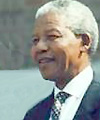
I thought the eighth lesson – Quitting is leading too – was an important point. Moving in a new direction from what has or hasn’t been working is usually a very difficult thing to do, but often necessary in order to stay relevant. The full article is full of great antidotes from the life of Mandela. Nelson Mandela celebrated his ninetieth birthday last week.
Posted by Michael McKinney at 10:25 PM
07.04.08

John Adams - We Live, My Dear Soul, in An Age of Trial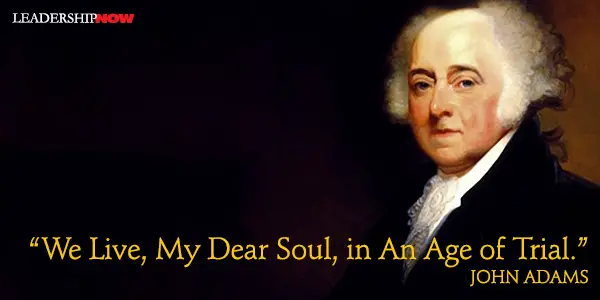
JOHN ADAMS has always been an American hero, but never a popular one. Despite having been one of the principal architects of American independence, Adam’s believed that “Mausoleums, statues, monuments will never be erected to me.” Adams guided and shaped – managed really – the revolution. Perhaps it was this fact – his involvement in all aspects – that is the reason he never stood out as much as some of his contemporaries in American history. In Revolutionary Management, Alan Axelrod writes that Adams was a man of nuance. It was an aspect of his character that “makes it so difficult for Americans to transform him into a one-dimensional icon.” Adams saw his task differently. He “believed that his task was both to incite and to control human passion….Tear down, by all means, yes. But tear down only that which separates Americans from their rights….Adams wanted to elevate the revolution above personal revenge and above the realm of mere human passion. He wanted to make it an exercise of law.” We can be thankful for that. In assessing Adams’ life, one is struck by his sense of duty. You can sense this in this famous quote taken from a letter to his wife Abigail in 1780: “I must study politics and war that my sons may have liberty to study mathematics and philosophy, geography, natural history, and naval architecture ... in order to give their children a right to study painting, poetry, music, architecture, tapestry, and porcelain.” He was a man that we would term authentic. He had the will and the courage to integrate action and belief. Personal responsibility was key. John Gardner once wrote, “The citizen can bring our political and governmental institutions back to life, make them responsive and accountable, and keep them honest. No one else can. The one condition for the rebirth of this nation is a rebirth of individual responsibility.” 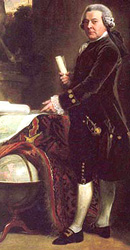 More on John Adams:

Posted by Michael McKinney at 11:16 AM
06.25.08

What Makes a President Great?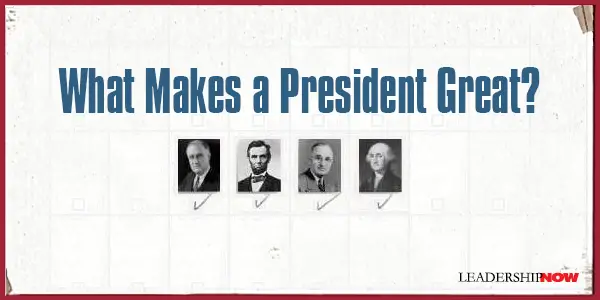
HAVING grown weary of the of what he terms as the presidential ratings game, historian, teacher, and politico Alvin Felzenberg decided to present a new ranking in his book, The Leaders We Deserved (and a Few We Didn't): Rethinking the Presidential Rating Game. Instead of evaluating the presidents and giving them a single score, he had devised six criteria to better account for their actual contribution to history. The first three criteria are: character, vision and competence. They give insight as to how they would handle the next three criteria: economic policy, the preservation and extension of liberty, and national security and defense. While you may disagree with his conclusions, you will no doubt find it useful in evaluating presidents and by extension it will give you a framework to appraise future presidential candidates. Based on this exercise, Felzenberg gives a list of what we should look for in presidential candidates: A Sense of Purpose. “Nearly all presidents who earned a rating of great or near great articulated specific goals that they wanted to achieve as president.” Examine How They Met Adversity. “All of he great and near great presidents emerged from conflicts and disappointments they encountered stronger and more resilient ten they had before. This is what made their previous ordeals transformative. All regarded these adversities as learning experiences, however painful. None emerged from such setbacks regarding themselves as victims. None were known to complain or whine—at least out loud or in public—about their private misfortunes.” Broad Life Experiences. “Most great and near great presidents had multiple occupations, not all of them in politics, before coming president. Through the depth and breadth of their experiences, successful presidents learned how to relate to people in all walks of life.”
A Well-Developed Sense of Integrity. Look for honesty (“doing what one said he would do, or explaining why unforeseen circumstances necessitated a different course”), courage (‘meeting adversity head-on, often at political or personal risk”), and integrity (“placing the interests of one’s office and one’s country ahead of personal convenience or interests, or those of one’s associates”). Humility. “Although confident in their abilities, successful presidents held their egos in check. All great and near great presidents understood that they would receive the credit for the achievements of their subordinates. For this reason they strove to find outstanding ones…including on occasion, former rivals and members of the opposition party.” The nation’s worst presidents had some or all of the following traits we would do well to avoid: • Watch out for cynicism and complacency.
According to Felzenberg we certainly deserved Lincoln, Washington, Theodore Roosevelt, Truman, Reagan, Ford, and surprisingly enough, Coolidge, among others. As he did with so much else, Ronald Reagan knew precisely what he was doing when he ordered Calvin Coolidge’s portrait hung in the White House cabinet room. Of the presidents we least deserved, most proved especially adept at mastering the electoral machinery of their respective eras and, sadly, at little else. The Leaders We Deserved is carefully considered and not only provides a fresh perspective on our nation’s presidents, but will give you a few surprising insights as well. A good book to read in this election year. Below is a list of the top twelve presidents based on Felzenberg’s criteria:

Posted by Michael McKinney at 08:21 AM
06.20.08

Caesar’s Leadership: Stick to Your Guns At the town of Placentia on the banks of the Po in northern Italy, Caesar faced a full-scale mutiny by his troops. Led by malcontents in the ninth legion, the soldiers demanded more pay, but the heart of their complaint was that there were no spoils in this war as there had been in Gaul. They would fight for months to defeat an army or conquer a town, then Caesar would forgive his enemies and march on. His soldiers craved gold, women, and slaves, not clemency for the vanquished.
At the town of Placentia on the banks of the Po in northern Italy, Caesar faced a full-scale mutiny by his troops. Led by malcontents in the ninth legion, the soldiers demanded more pay, but the heart of their complaint was that there were no spoils in this war as there had been in Gaul. They would fight for months to defeat an army or conquer a town, then Caesar would forgive his enemies and march on. His soldiers craved gold, women, and slaves, not clemency for the vanquished.
 Most generals would have called the mutinous leaders together and worked out a compromise—but not Caesar. Instead, he ordered the whole army to assemble and then began to speak. He said he felt like a father faced by spoiled and unruly children. He had always seen to their needs before his own and had provided them with everything he had promised. Did they really want to see Italy laid waste like Gaul or Germany? Did they think they were better than their fellow Romans on the other side? They were proud soldiers fighting a war of principle, not a horde of ravaging barbarians sacking cities for plunder. They demanded their own way? They would not get it. Armies, he declared, cannot exist without discipline. He would therefore decimate the entire ninth legion, executing every tenth man among them as punishment and a warning to any who might question him in the future. The whole army begged Caesar to reconsider and spare the ninth legion. They were wrong to defy him, they confessed, and earnestly beseeched him not to kill men who had served him bravely for many years. Caesar reluctantly agreed to show mercy on the condition that he was given the names of the ringleaders of the rebellion, twelve of whom he would choose by lot and execute. This they did, sparing the life of one innocent man and killing in his place the centurion who had vengefully accused him. Caesar had faced down thousands of his own men and won their respect and loyalty by not yielding an inch. Adapted from Julius Caesar by Philip Freeman.
Posted by Michael McKinney at 09:10 AM
06.16.08

McCain and Obama: What Kind of Leaders Are They?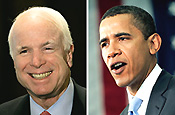 Gergen wrote in the Boston Globe that unfortunately “voters are typically left with more than candidates’ self serving, bumper sticker-caliber assertions: ‘strong leadership,’ ‘proven leadership,’ ‘new leadership,’ etc.” He adds, “perhaps more urgently than at any time since Franklin D. Roosevelt was in office, the United States needs an extraordinary leader in the White House.” To this end, last month the Center for Public Leadership in association with The Ken Blanchard Companies, convened a group of more than 200 people to develop questions for the candidates that get at their leadership capabilities. The following list of 15 questions from that meeting, is to serve as a kind of “job interview” to get at the candidates’ leadership capacity:
Who Will Be at The Table With You? How Will You Decide? How Will You Act? And What Will You Act On? What questions would you ask?
Posted by Michael McKinney at 08:53 PM
05.25.08

Tom Peters on the Definition of Leadership Tom Peters’ offers his definition of leadership in the video below. He begins by expressing a truth that is more important than the definition itself. It is not often understood by those seeking to understand the shortcomings of leadership. “Leadership in the 21st century AD is exactly what it was in the 21st century BC. Leadership is about the development, the inducement of people to grow way beyond where they believed they could go. Nothing has changed.” Leadership hasn’t changed. Leadership is influence. Peters’ definition is summed up in this quote from Robert Altman's lifetime achievement Oscar acceptance speech: "The director allows an actor to become more than they've ever dreamed of being." He says that great leaders are dealers in hope. He cites Churchill and Franklin D. Roosevelt as examples.
Posted by Michael McKinney at 06:56 PM
05.19.08

Golda Meir: A Study in Leadership
I KNEW a man that had met with Golda Meir in 1971. He said that she was no ordinary woman. Yet, he said, paradoxically, that was because she was such an ordinary woman. He described her as "an exceptionally intelligent, capable, balanced, and understanding mind." He said she had that rare quality of seeing things precisely as they are. Her vision was in sharp focus. Her mind was capable of piercing through the extraneous and confusing details to the central important point. She remained unconfused by the labyrinth of branches and twigs and had the trunk of the tree in clear view. Golda Meir was indeed a remarkable woman. Golda by Elinor Burkett has been released to coincide with the start of Israel's 60th Independence Day celebrations this month. This well-balanced biography is an interesting story beginning with her family fleeing Russia, where she was born in 1898, to begin again in Milwaukee, Wisconsin. There she developed a passionate commitment to Zionism, married, and pushed for their eventual relocation to Palestine in 1921. She put the cause of Zionism above all else, sacrificing even her personal life.She worked tirelessly raising money and used her gifts of charm and oratory to promote the cause. Some of her personal characteristics – self-confidence, intransigence, myopic vision, doggedness – brought her much criticism later in life, but they were exactly what was called for at that time and place in the formation of a country. She certainly had her own way of doing things. Ben-Gurion once said, “She had faith when others wavered. She believed in the absolute justice of our cause when others doubted.”  Eventually, the aftermath of the 1973 Yom Kippur War brought her time to an end, and the embattled prime minister resigned in 1974. She died on December 8, 1978, at the age of 80. She was a great leader, and this is a great study in leadership – both the good and the bad – of an ordinary woman who became an extraordinary leader. In the end, Burkett writes: A woman of greater wisdom might have resigned and let the younger generation battle it out, no matter the cost. A leader of foresight might have told her people everything they didn’t want to hear, that the situation was not sustainable, that a dozen problems were woven into the national fabric, and that they were living on quicksand. A creative prime minister might have devised new approaches to everything from ethnic divisions to peacemaking. And an innovator might have burst the national bubble of arrogant self-confidence by explaining that the political system was ossified or acknowledging that Israelis were not, in fact, the new superheroes. 
Posted by Michael McKinney at 03:49 PM
04.25.08

Of Chess Players and Banner-Wavers
“It’s a great huge game of chess that’s being played—all over the world—if this is the world at all, you know.” Dimitri K. Simes and Paul J. Saunders explained in The National Interest, why America needs chess players—not banner-wavers. “We have increasingly lost the ability to look squarely in the mirror before judging others and taking them to task.” American leaders have taken their own share of ruthless, and even brutal, decisions….Such decisions, while obviously regrettable, were the result of the types of difficult choices that great powers must often make. But then it behooves us not to preach too loudly about our own sense of morality. It also means that, in crafting an effective foreign policy, we shouldn’t be blinded by our own rhetorical claims to ethical perfection—or to fail to recognize that many states see us as a “normal country”—one that pursues its own interests by any means necessary and often makes moral judgments about others that appear influenced by those interests.
Posted by Michael McKinney at 07:00 PM
02.18.08

Quarrel Not At All: The Stuff of Command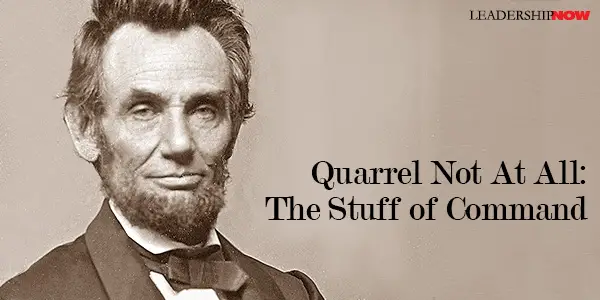 IN President Lincoln: The Duty of a Statesman, the follow-up to Lincoln’s Virtues, William Lee Miller, writes that if you knew Lincoln before he became president, you knew that it was part of Lincoln’s character to be capable of overlooking slights to himself, but you might question whether he could, at the same time, “command armies and make the demanding decisions of a nation at war.”
IN President Lincoln: The Duty of a Statesman, the follow-up to Lincoln’s Virtues, William Lee Miller, writes that if you knew Lincoln before he became president, you knew that it was part of Lincoln’s character to be capable of overlooking slights to himself, but you might question whether he could, at the same time, “command armies and make the demanding decisions of a nation at war.”
The stuff of command, especially in a giant deadly conflict, would not seem ordinarily to combine well with the stuff of forbearance and generosity. Executive skill and vigor, like a surgeon’s skill, would appear to require a certain withdrawal of empathy. The resolution necessary to great statesmanship would appear to invite, if not even to require, a certain ruthlessness with those whose wills and complex humanity complicate, impede, and even defy one’s vigorously pursued purpose. In a letter to Captain James M. Cutts who had been found guilty in a court-martial of conduct unbecoming of an officer of a gentleman, Lincoln offered this advice: Quarrel not at all. No man resolved to make the most of himself, can spare time for personal contention. Still less can he afford to take all the consequences, including the vitiating of his temper and the loss of self-control. Miller writes: Interpreting Lincoln, we might say: We overestimate our own interest, and we underestimate our adversary’s, so that the advice to yield on all small matters, and on all matters than even to our distorting eyes seem equally balanced, is a moral corrective. Here is a lawyer, and a politician, and a war leader in the midst of tremendous battles giving this surprising advice: quarrel not at all. Lincoln was a man possessed magnanimity and discriminating judgment, who was able to rise above vindictiveness to win the battles that mattered most. Miller’s book on Lincoln holds many lessons for leaders of today. He shows how Lincoln learned to balance his strengths and weaknesses in a way that made him one of the greatest and most respected leaders in modern times. 
Posted by Michael McKinney at 09:37 AM
02.17.08

Best Presidents In History - 2008 Harris PollHarris Interactive conducted an online poll within the United States last month. They asked over 2000 adults: Which one of the following presidents do you think was the best overall president in our history?The list included all presidents since Franklin Roosevelt, along with some of the more famous from earlier in American history – George Washington, John Adams, Thomas Jefferson, Andrew Jackson, Abraham Lincoln, Theodore Roosevelt, Woodrow Wilson and Calvin Coolidge. Scores were tallied by adding the percentage of those who answered “best” and “second best” for each president. Among modern leaders, Ronald Reagan ranked highest, but even his cache could not compete with the mighty Abe Lincoln, who was named the top president by 20 percent of those surveyed.
Posted by Michael McKinney at 12:02 AM
01.22.08

Sir John Harvey-Jones Dies at 83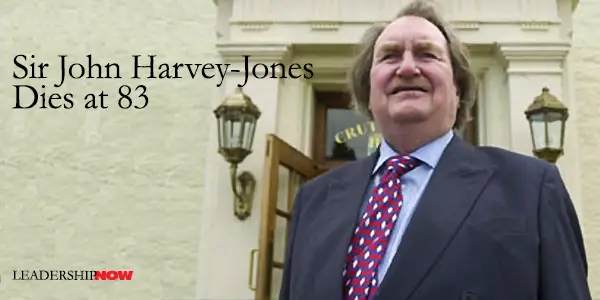
Sir John Harvey-Jones, one the great industrial leaders of his generation, died peacefully in his sleep on January 9th after a long illness. He was knighted in 1985 for his service to industry. The Economist reported, "His hair was long and scruffy, his ties ludicrous and his manner jovial bordering on Falstaffian; a board meeting, for him, was a debate, punctuated by gales of his maniacal laughter. Few were better at the brisk summing-up and the clear, no-nonsense decision. He could not have been more unlike the dull, grey-suited types in most British boardrooms." (He was chairman of The Economist from 1989 to 1994.) In his book Making It Happen: Reflections on Leadership he wrote: I believe business is still a fascinating and extremely worthwhile activity, which places demands upon every human attribute you can command. Courage, compassion, balance, humour, listening, communicating, passion, caring and risk-taking are the keys to business success — and indeed to success in living. More about Sir John Harvey-Jones:
On This Blog:

Posted by Michael McKinney at 09:34 AM
01.11.08

Sir Edmund Hillary Dies Today at 88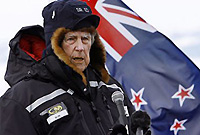 In 1953, Edmund Hillary, who with his Sherpa guide Tenzing Norgay, became the first known men to conquer Mount Everest, the world's tallest peak. Harry Gordon wrote in The Australian, “That Hillary was first to step onto the 8848m summit has been the subject of much subsequent controversy, but it is a superficial and somewhat pointless distinction since neither of them could have reached the top without each other's or the whole team's help. Indeed the expedition was a textbook example of teamwork where, through the sustained efforts of everyone, the two most suitable climbers made it to the summit of the mountain.” In an interview, Sir Hillary talked about leadership: There are some people who are natural leaders, who have the ability to think quickly or choose the right decisions at the right moment. But I think there are an awful lot of us who have to learn how to be a leader, and in actual fact, I believe that most people, if they really want to, can become competent leaders.Sir Hillary devoted all of his life to helping the Sherpa people of Nepal through the Himalayan Trust he created in 1960. In a 1995 interview with James Clash, Hillary said, "I think the most worthwhile things I've done have not been on the mountains or in the Antarctic, but doing projects with my friends, the Sherpa people. The 27 schools we've now established, the hospitals—those are the things I would like to be remembered for."  In November 2007 a institute was founded to recognize and foster outstanding international leadership in the name of Sir Edmund Hillary—the Hillary Institute. The Institute is creating a new international award—to be known as the Hillary Step—to be awarded to a person who displays great leadership in their chosen field. The Hillary Step will be bestowed every four years and will be worth $NZ 1 million. The Hillary Step is intended to recognize someone who has already displayed outstanding leadership, but who is still in mid-career so as to help further their work.
Posted by Michael McKinney at 11:07 AM
12.12.07

Paul Johnson’s Heroes: Lessons for Today's LeadersPaul Johnson’s Heroes is a pleasure to read. With his knack for illuminative details and command of the language, he has produced a series of short biographical essays that draw you through the book and leave you with a lot to think about. He notes that heroes have not always been appreciated and the status accorded them can be fleeting and arbitrary. By way of example he writes:In the troubled times which followed the end of the Napoleonic Wars, caused by lower wages, unemployment and higher food prices, the term became abusive. When ever the Duke of Wellington made his appearance, a certain kind of London mob (there were many different kinds) would shout: “No heroes! We want no heroes!” For the self-conscious proletariat, the “Man on Horseback” was a political enemy. They threw stones through the windows of Apsley House, the duke’s London residence. He had the windows boarded up but refused to replace the glass, as a reminder to people of how volatile was popularity an dhow fickle the crowd, applauding him as a hero one moment, detesting him the next.Consider too, Genghis Khan was “reviled for nearly a millennium as the archetypal mass murderer and rapist, despoiler, arsonist and ravager” yet “since the collapse of the Soviet empire in Central Asia, has become there a state-sponsored hero, especially in Azerbaijan and Mongolia.” “No people in history were more in need of heroes than the Hebrews.” And so Johnson begins his examples with the judges Deborah, Judith and Sampson leading to their greatest hero, King David. Continuing on, his survey of heroes spans almost 3000 years of Western history and ranges from, Alexander and Julius Caesar, to the unlikely Mae West and Marilyn Monroe, to Lincoln and Churchill, to Ronald Reagan, Margaret Thatcher and Pope John Paul II. Here are some of his comments from the book:
First, an absolute independence of mind, which springs from the ability to think everything through for yourself, and to treat whatever is the current consensus on any issue with skepticism. Second, having made up your mind independently, the ability to act resolutely and consistently. Third, to be able to ignore or reject everything the media throws at you, provided you remain convinced you are doing right. And finally, to act with personal courage at all times, regardless of the consequences to yourself. Who are your heroes?
Posted by Michael McKinney at 08:36 AM
11.16.07

America’s Best Leaders: Eighteen Who Motivate People To Work Together To Accomplish Great Things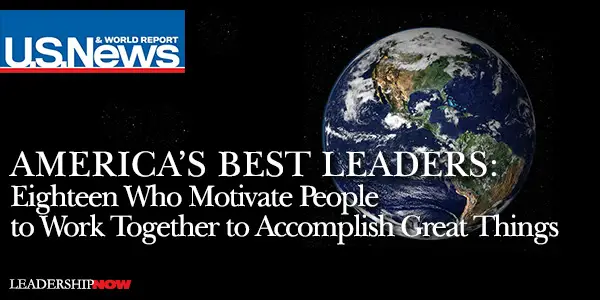 ACCORDING to a recent Center for Public Leadership/U.S. News & World Report poll, "more than three-quarters of the respondents say they believe the country is going through a leadership crisis, up 7 percent from last year, a trend stretching across all demographic and political groups. Nearly 80 percent feel that unless it gets better leaders, the country will decline, while 51 percent believe that the United States is already falling behind other nations. And about two-thirds say that today's leaders pale in comparison with those of 20 years ago."
ACCORDING to a recent Center for Public Leadership/U.S. News & World Report poll, "more than three-quarters of the respondents say they believe the country is going through a leadership crisis, up 7 percent from last year, a trend stretching across all demographic and political groups. Nearly 80 percent feel that unless it gets better leaders, the country will decline, while 51 percent believe that the United States is already falling behind other nations. And about two-thirds say that today's leaders pale in comparison with those of 20 years ago."
Yet, U.S. News has found 18 people—America’s Best Leader—they believe are helping to restore confidence in our leaders. The list is a collaboration between U.S .News and the Center for Public Leadership at Harvard University's John F. Kennedy School of Government. 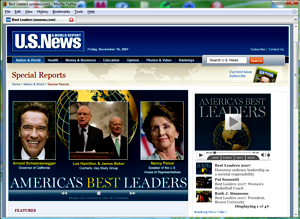 Here is the result:
His foundation builds housing near military hospitals to accommodate soldiers’ families. This list certainly isn’t inclusive and of course, it has its limitations, but it is worth reviewing for some insights into how these individuals developed their leadership skills. The individual profiles/interviews are worth reading.
Posted by Michael McKinney at 07:53 PM
09.28.07

Being a Role Model: Who's Watching You?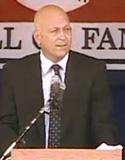 We all hear about how baseball imitates life, which held especially true for my dad. He used to say that everything that happens in baseball happens in life and everything that happens in life happens in baseball. He certainly taught us about life through baseball. But I also have to admit that as a young man with a limited view of the world, baseball and life became one for me and it was difficult to see beyond playing the game. Did you ever stop to think about how your life would unfold or imagine how you would like your life to turn out? One of those reflective pauses happened in my life when I was around 18 years old. I thought I had it all figured out, I would play big league baseball until about 45 and then worry about the rest of my life after that. It took me a little while, but I did come to realize that baseball was just one part of my life with the possible exception of this weekend, of course. This was never more clear to me than when we had children. I realized that the secret of life is life, and a bigger picture came into focus. Games were and are important, but people and how you impact on them are most important. While we all work to develop into productive people for our own happiness, it is also vital that we do so for the good of society as a whole. As I came to know the importance of my role in the development of my children, I began to sense the impact I could have on other kids. It is all about coming to the realization that we all have within us the power to develop and pursue almost anything we set our mind to, and that is the message and opportunity we want to pass to all children. We are the ambassadors for the future, just as a baseball player wants to leave his mark on the game and leave it a little better than he found it, we should all try to make this world a better place for the next generation. When I realized that I could use baseball to help make life better especially for the kids, baseball became a platform. By trying to set a good example, I could help influence young people in positive and productive ways. And some of this became apparent to me in my earliest playing days. So as my major league career unfolded, I started playing a little more attention to my actions. I remember when Kenny Singleton showed me a tape of me throwing my helmet down after a strikeout and all he said was, "How does that look?" I remember learning about a family who saved their money to come to Baltimore to see me play. I got thrown out in the first inning and their little boy cried the whole game. I remember how I reacted with anger when dad was fired after an O-and-six start, and after each of those events and others, I vowed to act better the next time. Yes, these were only little things, but as dad used to say, if you take care of all the little things, you'll never have a big thing to worry about. As the years passed, it became clear to me that kids see it all, and it's not just some of your actions that influence, it's all of them. Whether we like it or not as big leaguers, we are role models. The only question is will we be positive or will it be negative. Should we put players up on a pedestal and require them to take responsibility? No. But we should encourage them to use their influence positively, to help build up and develop the young people who follow the game. Sport can play a big role in teaching values and principles. It can be a huge developmental tool for life. Just think—teamwork, leadership, work ethic and trust are all part of the game and are also all factors in how we make the most of our lives. So an essential part of the job of every player and of all people for that matter is to help the young people of today learn these lessons so they can live better lives tomorrow.
Posted by Michael McKinney at 12:30 PM
07.06.07

JFK’s Leadership Style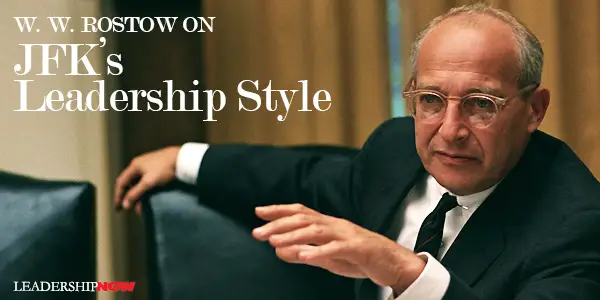
AS WE HAVE discussed before, the idea of the great leader as sole player is flawed. The point leader can’t do it alone. It takes many leaders to support the point leader. John F. Kennedy is said to have wondered how a man could conceive of seeking the job of the president when the problems were obviously bigger than mortal man should have to handle. It can only be done through people in an environment where they can do their best. Good relationships are vital to the success of any leader. 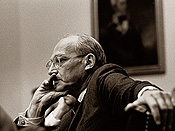 The late W. W. Rostow served as Deputy National Security Advisor to Kennedy. His observations of Kennedy’s leadership style are instructive: It did not fit the hierarchical pyramids to be found in textbooks on administration: it was like the spokes of a wheel. When he formed a bond it remained firm. His enormous energy permitted him to deal with a great many people on a bilateral basis, weaving their efforts into his tasks as he saw them. His method was that of the extended family. He put each member to work in ways that could help, according to his talents.Kennedy was able to create an environment without too many layers that fostered more open communication. At the same time, this requires thoroughness on the part of the leader so as to be certain that each task is covered by a capable person, while coordinating and leading in a way that doesn’t become dictatorial.
Posted by Michael McKinney at 01:12 AM
06.20.07

Calls for Leadership: The Failed States Index 2007The Fund for Peace and Foreign Policy Magazine has just released the Failed States Index. It is a sobering survey of 177 countries ranked in order of their vulnerability to violent internal conflict and societal deterioration. It is based on 12 social, economic, political, and military indicators. (You can click on the map above to view a larger image detailing the status of various nations of the world, including your own.)The third annual Index found the greatest improvements over the last year in Liberia, Indonesia, Democratic Republic of the Congo and Bosnia. Unfortunately, the risk of failure is running higher than last year in Lebanon, Somalia, Equatorial Guinea, and Niger. Although these countries may seem world's away, their problems have consequences for all of us. Failing States have one thing in common—bad leadership. Foreign Policy concludes, “Many states must endure poverty, corruption, and natural disasters. But, for the weak, there is nothing more costly than a strongman calling the shots.” Billions in foreign aid and security are no match for bad leadership. Effective leadership can reverse a states slide to failure. Three editorials from the last two days, speak to the leadership issue behind these problems. First, here are some comments from The Daily Star in Lebanon titled, “If Lebanon becomes a failed state again, failed leadership will be to blame:” Lebanon's slide downward on the scale toward failure was more pronounced than that of any other country in the world. Who or what is to blame for the fact that Lebanon is once again rapidly on its way to becoming a basket case? Yes, the war with Israel created problems, but the leaders of Lebanon have compounded those "difficulties" and transformed them into an utter disaster. Leaders on both sides of the political divide are guilty of playing solely to their respective supporting audiences and ignoring everyone else. Not one has risen to the challenge of being a leader for all the Lebanese. [There exists a] paralyzing impasse that has been brought on by their political leaders' shared predilections for hubris and maximalism.From AllAfrica Global Media, we have this opinion from Nurudeen Jattau in Nigeria: It is needless to say that the tragedy of the contemporary nation-state of Nigeria is the seeming absence or the lack of visionary leadership in all spheres of governance. This precisely, is the singular reason why analysts are agreed that Nigeria may never reach anything close to its full potential as a nation. All things considered, and whichever way the pendulum swings, we must understand and appreciate the fact that leadership is invariably a means to an end, and not an end in itself.Consider finally, an editorial by Fouad Al-Obaid in the Kuwait Times: If one studies history and the civilizations that preceded us, one will most certainly not come across common names. However leaders on the other hand, do end up in the pages of history for several reasons. They do so when their failure is total and their incompetence is obvious to all. Just as much as they do so when their bravery, their tactics, their leadership capability along with their capacity to move minds and hearts in the most turbulent times is put to test and they succeed.Foreign Policy would agree with Mr. Al-Obaid. They write that effective leadership doesn’t necessarily make a leader popular. “But then, such leadership is exactly what more failing states need: a head of state who chooses continued reforms over his own power and recognition.” I am reminded of something John Lukacs wrote in 1993, “The great and enduring problems are political, not economic. They involve the lust for power, not for money. (But then, this has been true of mankind ever since Adam and Eve, misunderstood by Adam Smith as well as by Karl Marx.)” You don't have to look too hard to find applicable lessons here for any leadership role we find ourselves in.
Posted by Michael McKinney at 08:47 AM
05.04.07

Presidential Courage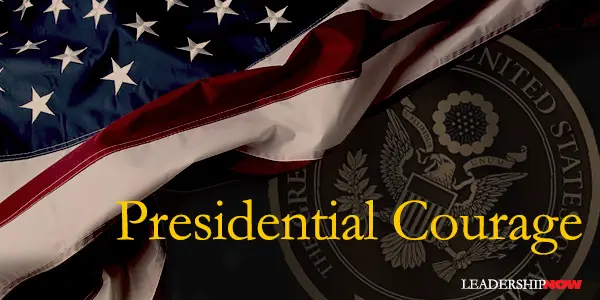
MICHAEL BESCHLOSS has written a series of stories inPresidential Courage about how nine American Presidents have, at crucial moments, made courageous decisions for the national interest even when they knew they might be jeopardizing their careers. The stories are brief overviews of trying times but are both poignant and encouraging. In his epilogue he writes: From his own reading of history, John Kennedy feared that the changing political environment was making it more difficult fro Americans to practice the kind of leadership that had shaped our past. Beschloss continues with this prescription: The ancient Romans surrounded their young leaders with paintings and sculpture to encourage qualities of greatness. Surround yourself with these stories. 
Posted by Michael McKinney at 10:58 AM
04.23.07

Former Russian Leader Boris Yeltsin Dead at 76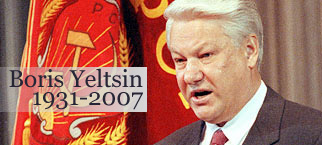 The flamboyant Boris Yeltsin (1931-2007), died today of heart failure at the age of 76. Russia's first freely elected president has been credited with engineering the final collapse of the Soviet Union and pushing the country into democracy and a market economy. The flamboyant Boris Yeltsin (1931-2007), died today of heart failure at the age of 76. Russia's first freely elected president has been credited with engineering the final collapse of the Soviet Union and pushing the country into democracy and a market economy.
The Financial Times comments, “Boris Yeltsin had the physical and moral strength to bear on his shoulders the colossal burden of a country in a ferment of transition, its economy struggling with the twin tasks of discarding a tenacious old system and adjusting to an unfamiliarly fast-moving new one. At the beginning of his rule he was able to grasp, either instinctively or through a quick intelligence, much of what was required.” His contemporaries may judge him a bit harsher remembering him for being out of touch and hesitant to act against crime and corruption. Yet on the international stage, many will remember when in August 1991, he climbed on top of a tank to successfully stare down a coup attempt against Gorbachev. His open defiance clearly marked the end of the USSR. 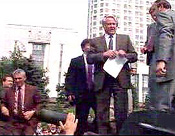 Yeltsin’s leadership by and large, did not rely on status and fear. Very much the strategic leader, he developed a populist style. He had an ability to connect with the Russian people. It is from here that he derived much of his power. His problem was that didn’t really didn’t know what to do with the power once he got it. The Economist concludes, “The former construction engineer was not a great builder of institutions; the democracy was flawed. But he had the right instincts. For liberating Russians from the yoke of the one-party state and the planned economy, he deserves immense gratitude. Yet his nepotistic and capricious rule spawned colossal lawlessness and corruption, paving the way for his authoritarian successor, Vladimir Putin.” World Reaction to His Death: "Russia has a lost a brilliant reformer. No-one has done as much for Russia as Yeltsin did. He was a unique person and absolutely Russian in his soul, in his impulsiveness and in his intellect." "He is best remembered when standing up to the coup d'etat aimed at restoring a dictatorial regime in Russia. With great personal courage he had merit in defending freedom. The Commission sends its condolences to Mr Yeltsin's family, the Russian authorities and the people of Russia." Boris Yeltsin in his own words:
Posted by Michael McKinney at 10:52 AM
04.07.07

Henry Ford Dies Today in 1947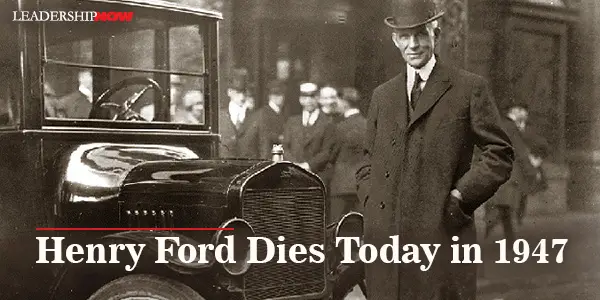
SIXTY YEARS AGO today Henry Ford died in his bedroom in Dearborn, Michigan. He was 83. Will Rogers had remarked, "It will take a hundred years to tell whether he helped us or hurt us, but he certainly didn't leave us where he found us." Ford, of course, revolutionized the manufacturing process, yet probably one of his greatest contributions was economic. His insistence that the company's future lay in the production of affordable cars for a mass-market led him—often at odds with his investors—to lower unit costs and to implement a highly criticized minimum wage scheme. Ford's quest to make the automobile accessible to all, helped to change the make-up of American society in general. As Lee Iacocca wrote in Time magazine, “[I]f it hadn't been for Henry Ford's drive to create a mass market for cars, America wouldn't have a middle-class today.”
Posted by Michael McKinney at 10:08 PM
02.28.07

Firing Back: Coming Back After a Fall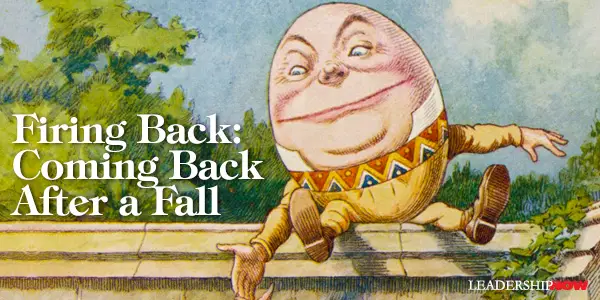
HAVE YOU EVER had a major setback? No. I didn’t think so. Me neither. But in the unlikely event you do or in the more likely event that you know someone who has or will, Jeffrey Sonnenfeld and Andrew Ward have created a well-researched guidebook. Firing Back: How Great Leaders Rebounded After Career Disasters strives to help us through the approaches that have worked for some and those that have backfired on others. Leaders should not be measured by how they bask in the gratification of their accomplishments. Rather, they should be measured by how they respond when fate deflates the joys of hard-earned triumphs. How well do they pick themselves up and get back in the race. The most important thing is to put your defeat into the proper context. This is often difficult to do in a culture that sees failure as a very bad thing and finds it difficult to even discuss. They write, “It is, in fact, wrong to consider adversity a diversion off one’s path toward greatness. The subsequent resilience from calamities has been revealed as vital to the character formation and differentiation of heroic figures…. It is the ability to bounce back from adversity—to prove your mettle once more by getting back into the game—that separates the lasting great from the fleeting greats.” They have developed a five-step strategy for rescuing and restoring your career and reputation—a leader’s most valuable asset—after a devastating professional setback. 1. Fight not Flight. This doesn’t mean to come out swinging, but to face the reality of the situation. “To stand up to the reality of the situation and not to flee from it or shirk the battles that lie ahead in restoring the reputation and career of the leader." Being able to pick your battles is an important component here. In the Wall Street Journal, Peggy Noonan opined in an article entitled, Ford Without Tears these comments about the comeback and legacy of Gerald Ford. He seemed lacking in vanity. There is no evidence that he was obsessed with his legacy. He didn't worry and fret about whether history would fully capture and proclaim his excellence, and because of this, he didn't always have to run around proving he was right. He just did his best and kept walking. What a grown-up thing to do. Former, current and future presidents would do well to ponder this approach. History would treat them more kindly. The legacy of a man who spends his time worrying about his legacy is always: He worried about his legacy.2. Recruit Others into Battle. This assumes you haven’t burnt your bridges. Build strong relationships now. You need to take responsibility for innocent close colleagues who suffer collateral damage with you and then leverage your support networks to reaffirm your credibility through the voices of others. Support from friends and family “can be very influential in reducing the levels of stress felt by the individual suffering from career setback and in encouraging coping behaviors. 3. Rebuild Heroic Stature. Explain the true nature of the adversity. Provide a rational explanation of the context behind any injustice or provide authentic contrition over any missteps you made. 4. Prove Your Heroic Mettle. Regain trust by demonstrating that the setback has not destroyed your professional expertise and character strength. Actions speak louder than words. 5. Discover a New Heroic Mission. Don’t merely define yourself by your past success or failure. Rather, define a new leadership vision and a new path for personal meaning in your work. You may find that you transcend past triumphs. In all of this they caution: Indeed, for many people, the failure to come back successfully is caused by an exclusive focus on the immediate problems of dealing with downfall—often practical and financial constraints that consume the person’s energy and will. 
Posted by Michael McKinney at 12:06 AM
02.19.07

Henry Kissinger on Vision: Seeing Through a Glass Darkly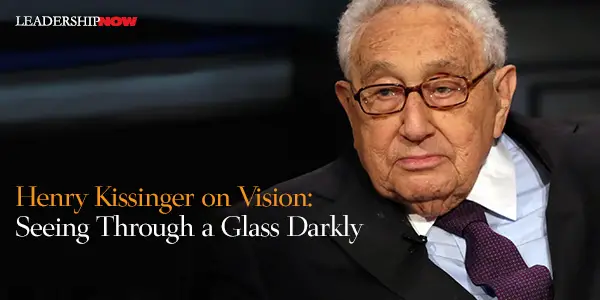
HENRY KISSINGER, then U.S. Secretary of State, explained in an interview with Los Angeles Times concerning the risky restoration of U.S. diplomatic relations with China, the dynamics of vision. “What a national leader has to do at such a time, is to take his society and the world, insofar as the issues are international, from where it is to where it has never been. This means he cannot prove the destination is desirable until the society or the world gets there.” Nixon himself once told professor Joan Hoff in an interview that the mark of a leader “is whether he can give history a nudge.” Nixon recognized that a leader should be inclusive. He wrote in a 1967 Foreign Affairs article, “Taking the long view, we simply cannot afford to leave China forever outside the family of nations, there to nurture its fantasies, cherish its hates and threaten its neighbors.”
Posted by Michael McKinney at 05:44 AM
01.23.07

The Adaptive Leadership of Debra Cafaro She also noted that you “have to be willing to temporarily upset a lot of people in order to save the company. You have to withstand a lot of conflict, histrionics, screaming at meetings and toughness on all sides.”
Posted by Michael McKinney at 12:13 PM
01.19.07

Bob Nardelli: “I want an autopsy!”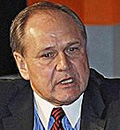 BW continues, “Nardelli alienated customers just as thoroughly as he did employees” and his “data-driven, in-your-face management style grated on many seasoned executives, resulting in a massive turnover in Home Depot's upper ranks.” Bruce Nussbaum, on his Business Week Innovation blog, wrote a post on “why command and control is so bad.” Bob Sutton pointed out on his blog that “a numbers-based and quality focused organization need not be top-down, where bosses use numbers to lord over and push around their underlings.” While all of this is true, a numbers-based and quality focused organization may also be top down and still place an emphasis on people and with longer-term results. These aren’t either/or propositions. It requires a different kind of leader. Jack Welch is reported by Patricia Seller in a June 9, 2002 article in Fortune, to have called Nardelli the “best operating executive I’ve ever seen”, but in the end he “had to go with his gut” in bypassing Nardelli for the top spot at GE. Nardelli understandably stunned and hurt, demanded, “I want an autopsy!” Maybe even Jack Welch saw something beyond the numbers. Perhaps at Home Depot, Nardelli finally got his autopsy. Mr. Nardelli’s problem seems to be one of attitude. If you have respect for people, if you have their best interests at heart, you can still bring in the numbers. A leader’s people and political role are spotlighted now more than ever. Mr. Nardelli ultimately failed in this arena. "I used to play football," Nardelli said when asked about the challenges of being a public company CEO today. "In football, you always know the score. Now, it's like we are ice-skating, and you've got a bunch of judges on the sideline shouting out the scores." Let’s hope while Mr. Nardelli is fielding calls for his next job, he takes time to reflect on attitude. While Six Sigma is a valuable process tool, it can and should work within a framework of respect for people. Leadership is the same as it ever was and it's still about people.
Posted by Michael McKinney at 12:48 AM
01.15.07

Martin Luther King Jr. and Adaptive Change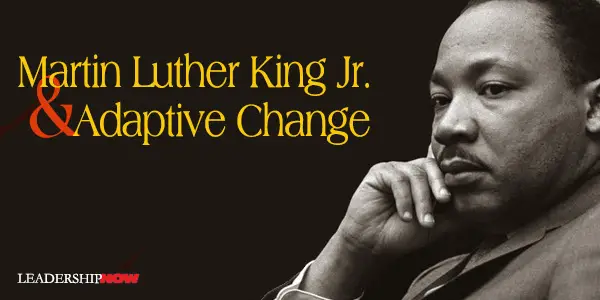
W In Leadership on the Line, authors Ronald Heifetz and Marty Linsky explain, “To sustain momentum through a period of difficult change, you have to find ways to remind people of the orienting value—the positive vision—that makes the current angst worthwhile.” 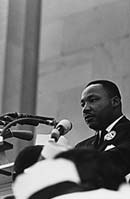 “As you catalyze change, you can help ensure that you do not become a lightning rod for the conflict by making the vision more tangible, reminding people of the values they are fighting for, and showing them how the future might look. By answering, in every possible way, the “why” question, you increase people’s willingness to endure the hardships that come with the journey to a better place.” This is what Martin Luther King Jr.’s accomplished in his famous I Have a Dream speech. He painted a tangible vision when he said: I have a dream that my four little children will one day live in a nation where they will not be judged by the color of their skin but by the content of their character. I have a dream today. Interestingly enough, the civil rights speakers who were to speak on that day—August 28, 1963—argued amongst themselves who would speak when and for how long.
Posted by Michael McKinney at 07:11 AM
12.27.06

Reactions to Gerald Ford's Death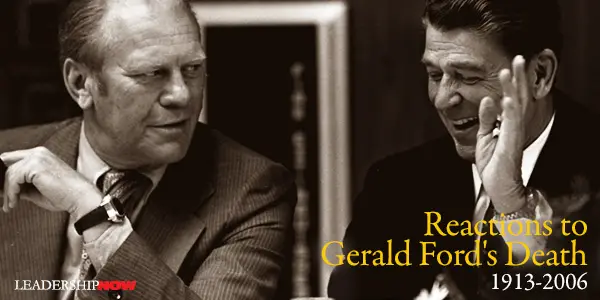
"My family joins me in sharing the difficult news that Gerald Ford, our beloved husband, father, grandfather, and great grandfather has passed away at 93 years of age… His life was filled with love of God, his family, and his country.'' —Betty Ford, in a brief statement issued from her husband's office in Rancho Mirage, Calif.
"I was deeply saddened this evening when I heard of Jerry Ford's death. Ronnie and I always considered him a dear friend and close political ally. His accomplishments and devotion to our country are vast, and even long after he left the Presidency he made it a point to speak out on issues important to us all." —Former first lady Nancy Reagan
"He had to bring our country back and make it whole again and he did it with dignity, he did it with great, great skill and sensitivity." —Alexander Haig, Mr. Ford's former chief-of-staff
"Throughout his career, as a naval officer, congressman, vice president, and president, Gerald Ford embodied the best values of a great generation: decency, integrity, and devotion to duty. Thirty-two years ago, he assumed the nation's highest office during the greatest constitutional crisis since the Civil War. In that troubled era, America needed strength, wisdom, and good judgment, and those qualities came to us in the person of Gerald R. Ford. … I was proud to know President Ford and to have served in the White House as his chief of staff. He was a dear friend and mentor to me until this very day." —Vice President Cheney
"President Ford is one of the most admirable public servants and human beings I have ever known. A man of the highest integrity, his life-long dedication to helping others touched the lives of countless people. An outstanding statesman, he wisely chose the path of healing during a deeply divisive time in our nation's history. He frequently rose above politics by emphasizing the need for bipartisanship and seeking common ground on issues critical to our nation." —President Jimmy Carter
"President Ford was a great man, a great leader, and perhaps Michigan's greatest son. He served his country with distinction for his entire adult life. He will be remembered as a president who kept America together during one if its greatest crises. He and his wife Betty have demonstrated great courage and the highest values throughout their lives. He will be missed." —Jane Abraham, co-chairwoman of the Michigan Republican Party
"Gerald Ford and I came from different sides of the aisle, but we forged a wonderful friendship as we served Michigan together in the House of Representatives. When his nation called on him to serve his country ... he rose up and held the country together. It will certainly be his legacy. I will remember him fondly and I will miss him dearly." —U.S. Rep. John Dingell
"He became president of the United States during a trying time and immediately began the difficult process of healing a nation torn apart by scandal. He will be remembered for leading with integrity and character. He brought West Michigan values with him to Washington and maintained them throughout his rise from congressman… to vice president and president." —U.S. Rep. Pete Hoekstra
Posted by Michael McKinney at 12:30 AM
12.26.06

Former President Gerald R. Ford Dies Today at 93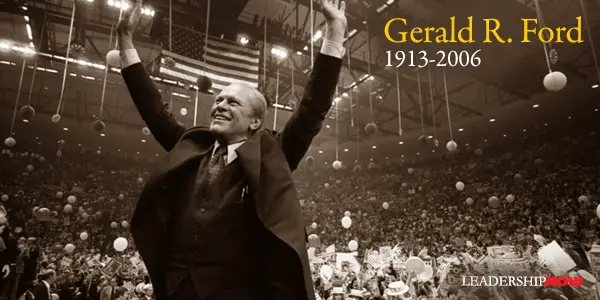
FORMER president Gerald R. Ford died at 6:45 p.m. today at age 93. He was 38th (1974-77) and only unelected president in America's history. He was also the longest living president, followed by Ronald Reagan, who also died at 93. 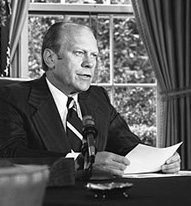 President Ford epitomized servant-leadership. He did what was best for those he led no matter what the cost might have been for him politically. He believed in the importance of leading by example. He spent his career serving his country and healed his country. He was the right man at the right time. He was a humble, honest man and a great leader. "The American people will always admire Gerald Ford's devotion to duty, his personal character and the honorable conduct of his administration," President Bush said in a statement tonight. "We mourn the loss of such a leader, and our 38th president will always have a special place in our nation's memory." "During a time of disquiet and uncertainty, Ford, through his inherent decency, almost single-handedly restored the faith of the American people in their government" wrote Mark Updegrove in Second Acts. President Ford closed his autobiography, A Time To Heal, upon leaving the White House in 1978 with these words, “My thoughts went back to the morning of August 1, 1974, when I received that first phone call from Al Haig. And I remembered how cloudy it had been in Washington that day. Now I looked out the window of the plane. The sun was shining brightly. I couldn’t see a cloud anywhere, and I felt glad about that.” 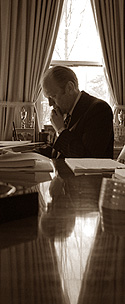 Quotes by Gerald Ford:
Posted by Michael McKinney at 11:00 PM
12.15.06

Walt Disney: The Triumph of the American Imagination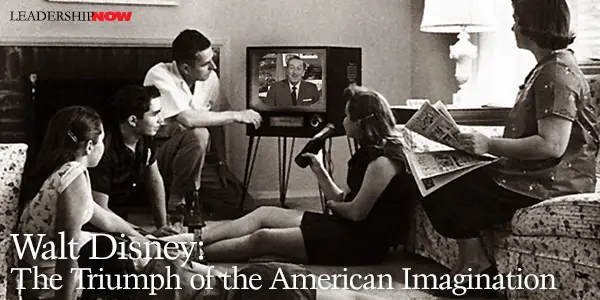
WALT DISNEY is arguably one of the most influential Americans of the twentieth-century. (The Atlantic listed him at number 26 in their recent listing of influential Americans.) He died 40 years ago today at age 65 in Los Angeles. Steven Watts writes in The Magic Kingdom, "Walt Disney operated not only as an entertainer but as a historical mediator. His creations helped Americans come to terms with the unsettling transformations of the twentieth century. This role was unintentional but decisive. Disney entertainment projects were consistently nourished by connections to mainstream American culture — its aesthetics, political ideology, social structures, economic framework, moral principles — as it took shape from the late 1920s through the late 1960s.” The biography of Disney by Neal Gabler is the best portrait of Disney to date. With unprecedented access to Disney family achieves, Gabler tells a story of a man that would not be deterred from his many disappointments and failures to fulfill his dreams and in the end, decidedly alter the American consciousness. Unfortunately for Disney, his dreams didn’t always bring him personal happiness.Disney once remarked, "All the adversity I've had in my life, all my troubles and obstacles, have strengthened me... You may not realize it when it happens, but a kick in the teeth may be the best thing in the world for you." Gabler concludes that of all Disney’s contributions, his greatest is that “he demonstrated how one could assert one’s will on the world at the very time when everything seemed to be growing beyond control and beyond comprehension. In sum, Walt Disney had been not so much a master of fun or irreverence or innocence or even wholesomeness. He had been a master of order.”
Posted by Michael McKinney at 12:06 AM
12.06.06

The Era of Professional Management is Dead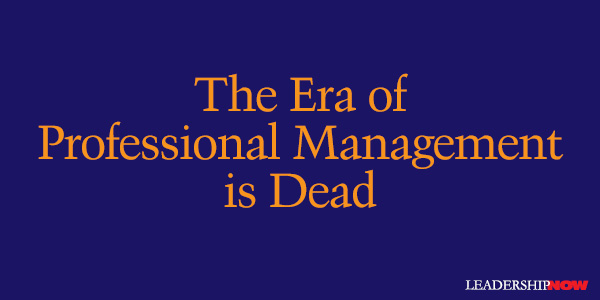
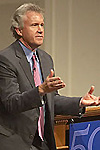 The Darden School news release states: To prepare, he advised Darden students to gain expertise in six key areas:
The Darden School Dean, Robert F. Bruner added some comments of Immelt’s talk on his blog: To be a growth leader is to stimulate organic growth of a firm through close acquaintance with the needs of the customer. Thus, “domain knowledge” is important—the knowledge that can help you decide what to sell, to whom, and where to make it. Jack Welch believed in the theory of the “best available athlete,” the generalist who could be transferred successfully from turbines, to medical devices, and to TV production. Immelt believes that higher competition requires a closer knowledge of the customer than the best athlete model allows.  In the same post, Bruner has also left some impressions of Immelt that are worth reading. Robert Bruner himself is an interesting and articulate man. I especially appreciated his comments on “Getting a Life.” He writes, “ High-performance professionals must have a renewing life outside of the workspace. You can’t sustain a high rate of intensity without a break. This varies for everyone, of course. But the formula should include some kind of exercise, family or community-oriented engagement, and some strictly personal break time.” He shares what works for him in his own personal renewal program. Reading, cycling, food and wine, and foreign travel resonated with me.
Posted by Michael McKinney at 08:55 AM
11.22.06

Pamela Thomas-Graham: A Woman For All Seasons
IN a recent column by Harvey Mackay, author of Dig Your Well Before You're Thirsty, he shared his impressions of a New York Sun article written by Pranay Gupte. The article featured Pamela Thomas-Graham, the new head of Liz Claiborne. MacKay writes, “It fascinated me. I wondered how one woman could accomplish so many things and do all of them so well.” Here are some excerpts from that column: There was a big clue. Throughout the article, Ms. Thomas-Graham praised her parents and their Presbyterian church for the values they instilled in her. "I was brought up to challenge myself, to try to be successful on my own terms. I was brought up to be focused. So I see myself as more fully engaged than ever before," Ms. Thomas-Graham responded when asked why she accepted the burden of revitalizing the flagship Liz Claiborne brand as well as nine others. The brands she oversees bring in annual revenues just shy of $1 billion.
Posted by Michael McKinney at 12:03 AM
11.15.06

Anwar el-Sadat on Life and Leadership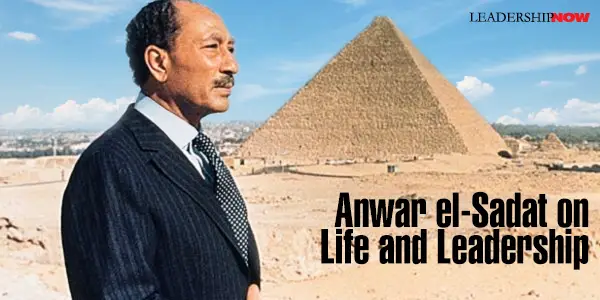
Anwar el-Sadat was a remarkable leader. He became president of Egypt after Nasser’s untimely death in October 1970. For his efforts to bring about peace with Israel, he shared the 1978 Nobel Peace Prize with Israel’s Menachem Begin. Just over 25 years ago, on October 6, 1981, Sadat was assassinated by terrorists. Here are some thoughts from his 1978 autobiography, In Search of Identity: 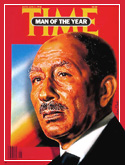
Posted by Michael McKinney at 06:58 AM
10.09.06

Carly Fiorina On Leading Change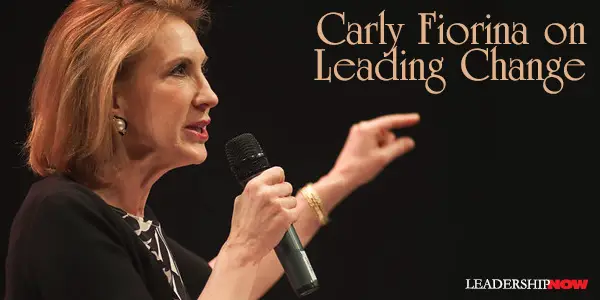
RECOUNTING her days at Lucent, Carly Fiorina writes in Tough Choices about the challenge of bringing about organizational change:  As is true whenever a new leader issues a challenge, a critical mass of the old-timers must rise to that challenge. If this fails to happen, the new leader is simply ignored. People who’ve never operated in large, complex companies are often surprised to learn that even a change agent with title and position can be effectively rendered powerless by people’s collective decision to maintain the status quo. A boss can hire and fire. A boss can reallocate people and money. A boss can measure and reward. A boss can threaten or inspire. Each of these actions and decisions will be analyzed and interpreted by an organization. Some interpretations will motivate change. But no boss, even a president or a CEO, can order people to change. No boss can force people to behave differently. People operate based on their own free will. They will make their own decisions, and in big companies, those decisions are easy to hide. 
Posted by Michael McKinney at 08:18 AM
10.08.06

Carly Fiorina: Hewlett-Packard Leaks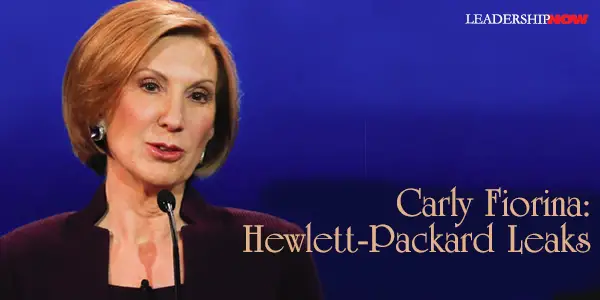
THE New York Times reported Thursday (October 5) that according to former Hewlett-Packard chief executive Carly Fiorina, she “ordered the first of a series of leak investigations into contacts by board members with journalists in January 2005.” In her new book, Tough Choices, she writes that it began with the leak of a January 2005 meeting to the Wall Street Journal. After a suggestion by Larry Babbio that every Board member should resign, she wrote, “I suggested instead that we ask the Nominating and Governance Committee to launch an investigation to be conducted by outside counsel. On rare other occasions when we’d had an ethical issue arise in the company that warranted the Board’s attention, the Audit Committee had conducted an investigation with outside counsel. Because this was a matter internal to the Board, I felt the Nominating and Governance Committee should handle this one. No one argued.” Fiornia continues: Bob Knowling convened the committee by telephone ten minutes later. The members agreed that Larry Sonsini would interview each Board member. Bob requested that Larry use the interviews to conduct not only an investigation but also an objective assessment of the Board. Beyond the leak, there was much about the Board’s dynamics that was disturbing. The committee agreed. Each Board member should be asked their views of the effectiveness of the Board, the qualifications of each Board member, and how we could improve our meetings and deliberations. I thought it was a great idea. We needed to know what had happened to ensure that it never happened again, but perhaps we could also accomplish something more positive and productive. I thought we could weather this storm; we had weathered so many. I didn’t expect anyone to resign over this, nor did I intend to ask. I thought this could be a useful wake-up call to several board members who were not as smart as they thought they were. 
Posted by Michael McKinney at 06:15 PM
08.31.06

Desmond Tutu on Real Leadership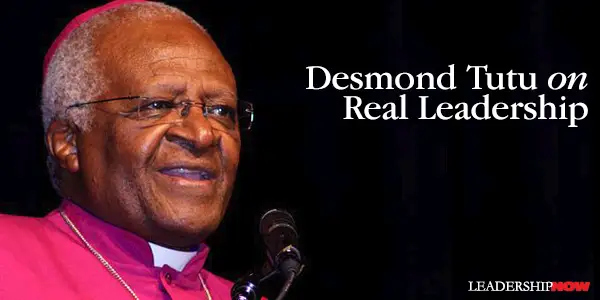
Desmond Tutu, South African cleric and recipient of the 1984 Nobel Peace Prize, gave a speech recently at the Harold Wolpe Memorial Lecture in Cape Town. Here are some of his edited comments from that speech on Real Leadership: I thought it might not be entirely inappropriate to talk about leadership—true, real leadership. There is an episode in the Christian Gospels when the disciples of Jesus were bickering about leadership positions. So Jesus called them together to give them a profound lesson on true greatness real leadership, and it turned out to be one of the most paradoxical statements ever. Just listen: "And when the other ten apostles heard it, they began to be indignant with James and John. But Jesus called them to Him and said to them. You know that those who are recognized as governing and are supposed to rule the Gentiles lord it over them, and their great men exercise authority and dominion over them. But this is not to be so among you; instead, whoever desires to be great among you must be your servant. And whoever wishes to be most important and first in rank among you must be slave of all. For even the Son of Man came not to have service rendered to Him, but to serve, and to give His life as a ransom for many." (Mark 10: 41-50) Now, what kind of advice is that? Totally unrealistic, sentimental, and utopian. They would make mincemeat of you in a hard-nosed cynical world where it is dog-eat dog, survival of the fittest, and devil take the hindmost, and everyone for himself in a setting of cutthroat competition. But is that kind of success really what people, in fact, admire, indeed revere? The leader is there for the sake of the led. The formula Jesus propounded clearly was not so utopian and unrealistic. Almost all who have become outstanding leaders have demonstrated this remarkable attribute of selfless altruism. The leader is there not for what he/she can get out of this exalted position. No, the real, the true leader knows the position is to enable the leader to serve those she leads. It is not an opportunity for self-aggrandizement, but for service of the led. Integrity: People look up to their leaders for inspiration; they somehow believe they embody their best ideals, attributes, and characteristics. This is how they want to believe they would be at their best. They want their leaders in a way to be a Colossus without blemish, a paragon of virtue, of impeccable moral standards, not an idol with feet of clay. There surely is conduct which might be tolerated in a lesser mortal, but that would be anathema in the Head of State. We speak of gravitas, of in our language shadow, isthunzi, a presence. We want to experience our head of state as being presidential. He/she is not an ordinary person. Humility: Almost paradoxically, we also are attracted to a head of state who is humble and approachable, not arrogant and aloof. People want their leader, as it were, to have charisma, to be regal and exalted, dignified, almost godlike as expressing the best about their idealized corporate consciousness and identity. But they also want them to be people of flesh and blood, not remote, but down to earth in touch with them, aware of their aspirations, anguish, needs and know where the shoe pinches. No human being is infallible: Most politicians seem to have a massive allergy to admitting they might have been wrong. I suspect most of us find humble pie unappetizing. We do not like to admit that we made a mistake. It is our peculiar hubris. A leader leads by leading: A true leader whilst eager to carry his constituency with him whenever possible, sometimes has to take a stand that is not too popular with his followers. But the real leader then demonstrates his mettle by leading through leading. It requires courage to do this, but the leader recalls that the tortoise makes progress only when it sticks its neck out. Leadership can be a lonely vocation. Bishop Charles Albertyn used to tell us this story, In this establishment, there are only two rules. Rule No. 1 - The boss is always right. Rule no. 2, in case the boss is wrong, refer to rule No. 1. It may seem as if the kind of leader who uses this style is always in charge, things happen, everybody dances attention. But in fact, it is self-defeating. It allows resentment and anger to build up in those who have been humiliated by the apparently decisive boss and then one day even the worm will turn.
Posted by Michael McKinney at 02:09 AM
08.23.06

Highest Presidential Approval RatingsIN the United States, presidential job approval ratings were introduced by George Gallup in the late 1930s. The Gallup Poll has ranked ten presidents by their highest approval rating. It is interesting and the results may surprise you.
Posted by Michael McKinney at 12:05 AM
07.31.06

Tony Blair: The Impact of the Modern World on Leadership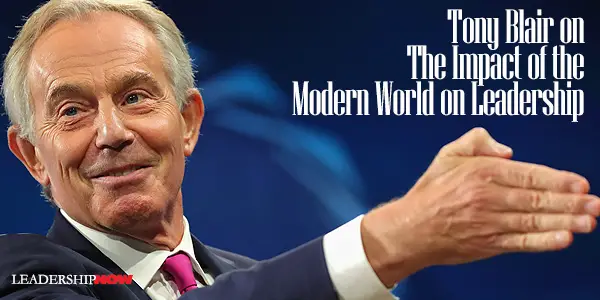
PRIME MINISTER Tony Blair, addressing on July 30, a gathering of 500 of the top executives at Pebble Beach from Rupert Murdoch's Newscorp organization, said, “I am sometimes taken to task for being too ambitious in the radical nature of the policy changes I am seeking. I always have the opposite worry: not being radical enough.” In a time of rapid change, incremental change is very often not enough. The times call for doing things quickly—not perfectly—learning from it and going at it again. Staying ahead of change means being the change rather than having it imposed on you. Change must be welcomed and not an afterthought. Change is the primary tool of the entrepreneur. The entrepreneur not only welcomes it, but he or she also looks for it, responds to it, and leverages it. Blair continues with his message on the impact of change on leadership. His message still resonates today. "The toughest test for any leader today is the sheer scale, pace and reach of change. There is no steady state in political leadership today. Countries, like companies, are faced with upheaval, uncertainty and require constant adaptation to changing times. Globalization is creating vast economic opportunity but with it the same amount of insecurity. Social patterns of conventional community and family life have eroded. September 11th changed the foreign policy. Two years ago, energy policy barely featured on the G8 or EU agendas. Now it dominates both: and rightly. Leaders are not required always to be right, but they are required to make judgments. Leading requires that we master change awaken people from the hypnotic effect of inertia. 
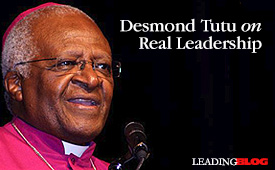
Posted by Michael McKinney at 12:07 AM
07.03.06

George Custer and the Importance of Information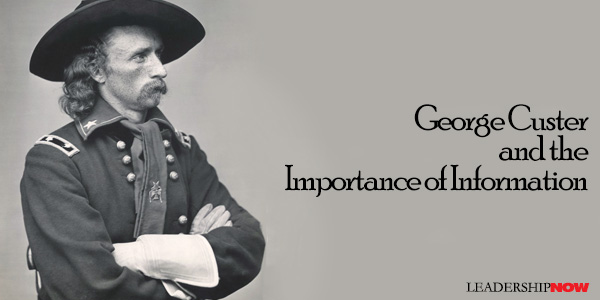
ONE-HUNDRED Thirty years ago on June 25, 1876 on the banks of the Little Big Horn River, the Battle of the Little Big Horn also known as Custer's Last Stand took place. It was reported that on the banks of the Little Big Horn River was the largest concentration of Indians from six tribes that history has ever recorded. It has been estimated that there were anywhere between ten to fifteen thousand Indians with over 2,500 warriors. Custer was in no position to pick a fight. Sadly, he decided to ignore that information. Leaders live and die on good information. Getting it is only half the battle. The other half is listening to it. Far too many leaders find themselves talking when they should be listening. Paying attention to information is especially important when it suggests that things are not what they seem to be. Custer's pride, unfortunately, cost him and those around him their lives.
Posted by Michael McKinney at 03:47 PM
05.29.06

General Douglas MacArthur: The Soldier, The Gentleman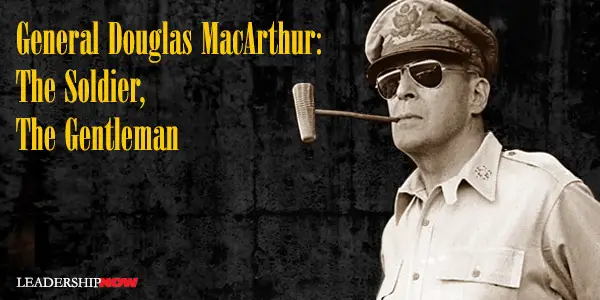
G 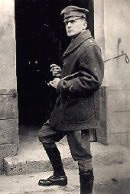 Major William A. Ganoe recalled this aspect of MacArthur’s character in his book MacArthur Close-Up: Much Then and Some Now (1962) in the following excerpt as cited by William Manchester: Of all his traits, Ganoe believes “the one that made the greatest impact was his unwavering aplomb, his astonishing self-mastery. I had seen men who were so placid or stolid they were emotionless. But MacArthur was anything but that. His every tone, look or movement was the extreme of intense vivacity. . . . As he talked, so he walked jauntily, without swagger. His gait and expression were carefree without being careless.” He possessed “a gifted leadership, a leadership that kept you at a respectful distance, yet at the same time took you in as an esteemed member of his team, and very quickly had you working harder than you had ever worked before in your life, just because of the loyalty, admiration and respect in which you held him. Obedience is something a leader can command, but loyalty is something, an indefinable something, that he is obliged to win. MacArthur knew instinctively how to win it.” He was, the adjutant concludes, “all contradiction. He commanded without commanding. He was both a patrician and plebeian. I could close my eyes and see him in his toga, imperiously mounting his chariot, and the next minute clad in homespun, sitting on the narrow sidewalk of Pompeii and chatting informally with a slave.”
Posted by Michael McKinney at 12:20 AM
04.21.06

Napoleon’s Six Winning Principles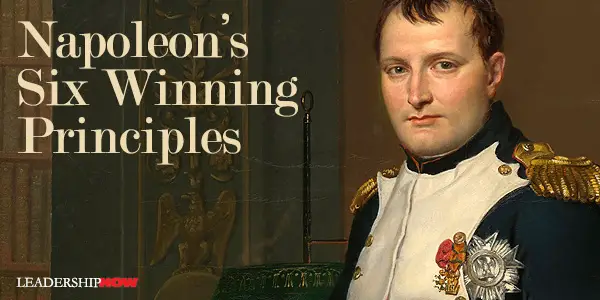
NAPOLEON still manages to get a lot of press. In his book Napoleon on Project Management, Jerry Manus effectively develops practical lessons from the career of the French leader. At the core of his analysis are Napoleon’s Six Winning Principles. These principles are meant to serve as a compass and not as hard and fast rules. However, Manus notes that “these principles work together and feed off one another like interlocking gears. A lack of any one of them will impede success." A chapter is devoted to each point, but here’s a quick summary:
Manus writes that Napoleon’s downfall was that his success eventually led to his undoing. The principles that had brought him success began to unravel. He offers four critical warning signs that we need to watch for: power (self-righteousness), overzealousness (obsession), scarcity of effective leaders (disorder and mistrust), and an unbalanced lifestyle (leading to burn out and loss composure and health). The bottom line: …if we adopt a compliance mentality as a result of our power, isolate ourselves from our leaders and subject-matter experts, and forget to involve our stakeholders in major decisions, we will turn around one day and there will be nobody behind us. And with nobody behind us, we can no longer call ourselves leaders. 
Posted by Michael McKinney at 09:12 AM
03.25.06

Scholars Rate the Worst Presidential Blunders
THE McConnell Center asked about 90 political scholars nationwide to nominate mistakes of former presidents because a current administration cannot be judged with historical hindsight, Gary Gregg, a political science professor who directs the McConnell Center, said. Thirty-seven scholars responded. Gregg then compiled a shortened list of 10 for the public to rank. That online survey had 423 responses. So who had the worst blunder? President James Buchanan, for failing to avert the Civil War, according to a survey of presidential historians organized by the University of Louisville's McConnell Center. The survey's top 10 presidential blunders were announced Saturday during a President's Day weekend conference called "Presidential Moments." "We can probably learn just as much - or maybe even more - by looking at the mistakes rather than looking at why they were great," said political scientist and McConnell Center Director Gary Gregg. Scholars who participated said Buchanan didn't do enough to oppose efforts by Southern states to secede from the Union before the Civil War. The second worst mistake, the survey found, was Andrew Johnson's decision just after the Civil War to side with Southern whites and oppose improvements in justice for Southern blacks beyond abolishing slavery. "We continue to pay" for Johnson's errors, wrote Michael Les Benedict, an Ohio State University history professor emeritus. Lyndon Johnson earned the No. 3 spot by allowing the Vietnam War to intensify, Gregg said. Where does Bill Clinton's Monica Lewinsky scandal rank? Many scholars said it belonged at No. 10, saying that it probably affected Clinton's presidency more than it did American history and the public. The rest of the top 10 blunders: 4: Woodrow Wilson's refusal to compromise on the Treaty of Versailles after World War I. 5: Richard Nixon's involvement in the Watergate cover-up. 6: James Madison's failure to keep the United States out of the War of 1812 with Britain. 7: Thomas Jefferson's Embargo Act of 1807, a self-imposed prohibition on trade with Europe during the Napoleonic Wars. 8: John F. Kennedy allowing the Bay of Pigs Invasion that led to the Cuban Missile Crisis. 9: Ronald Reagan and the Iran-Contra Affair, the effort to sell arms to Iran and use the money to finance an armed anti-communist group in Nicaragua. 10. Bill Clinton’s affair with White House intern Monica Lewinsky
Posted by Michael McKinney at 08:34 PM
|
BUILD YOUR KNOWLEDGE
 

How to Do Your Start-Up Right STRAIGHT TALK FOR START-UPS 
Grow Your Leadership Skills NEW AND UPCOMING LEADERSHIP BOOKS 
Leadership Minute BITE-SIZE CONCEPTS YOU CAN CHEW ON 
Classic Leadership Books BOOKS TO READ BEFORE YOU LEAD |
|